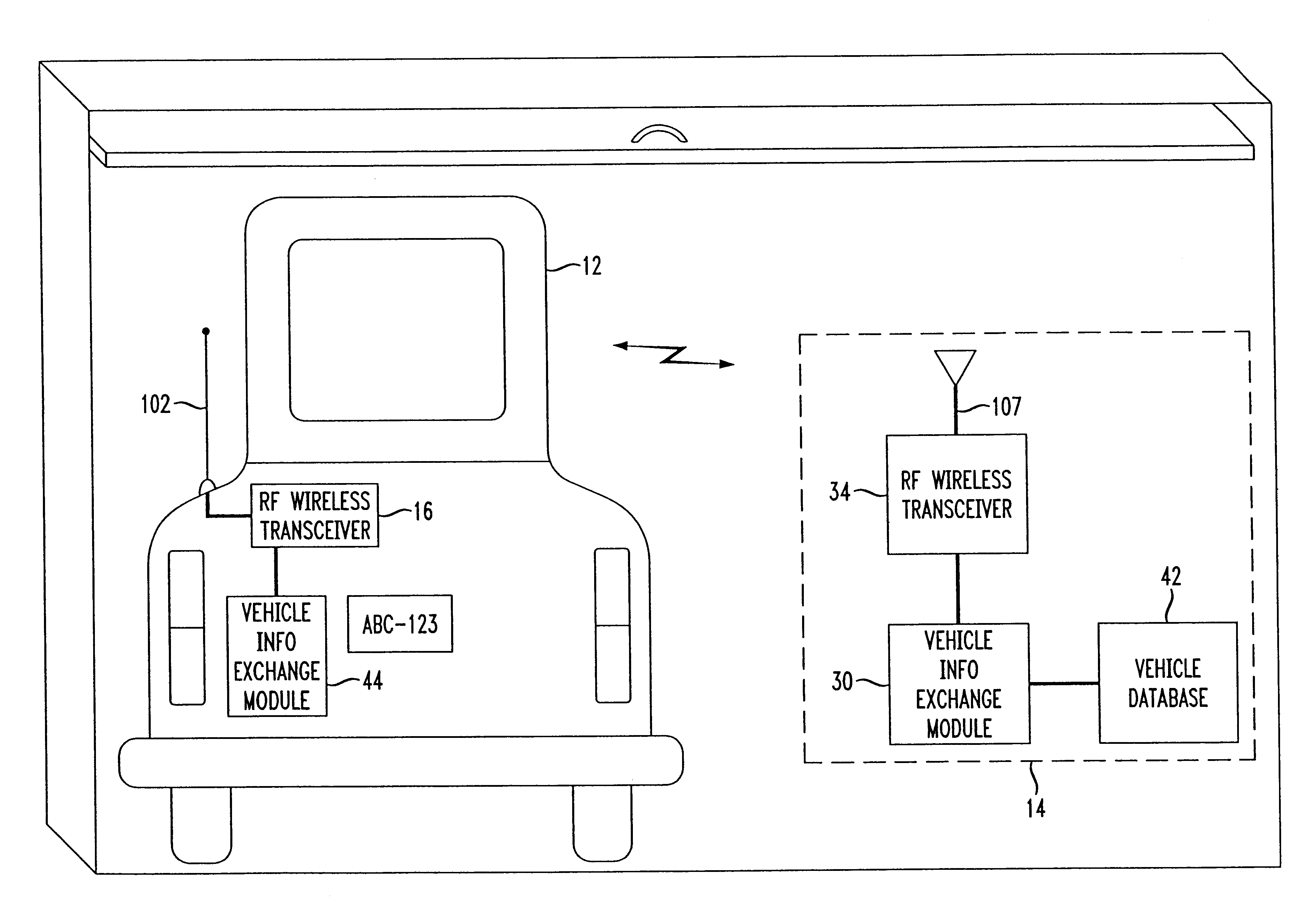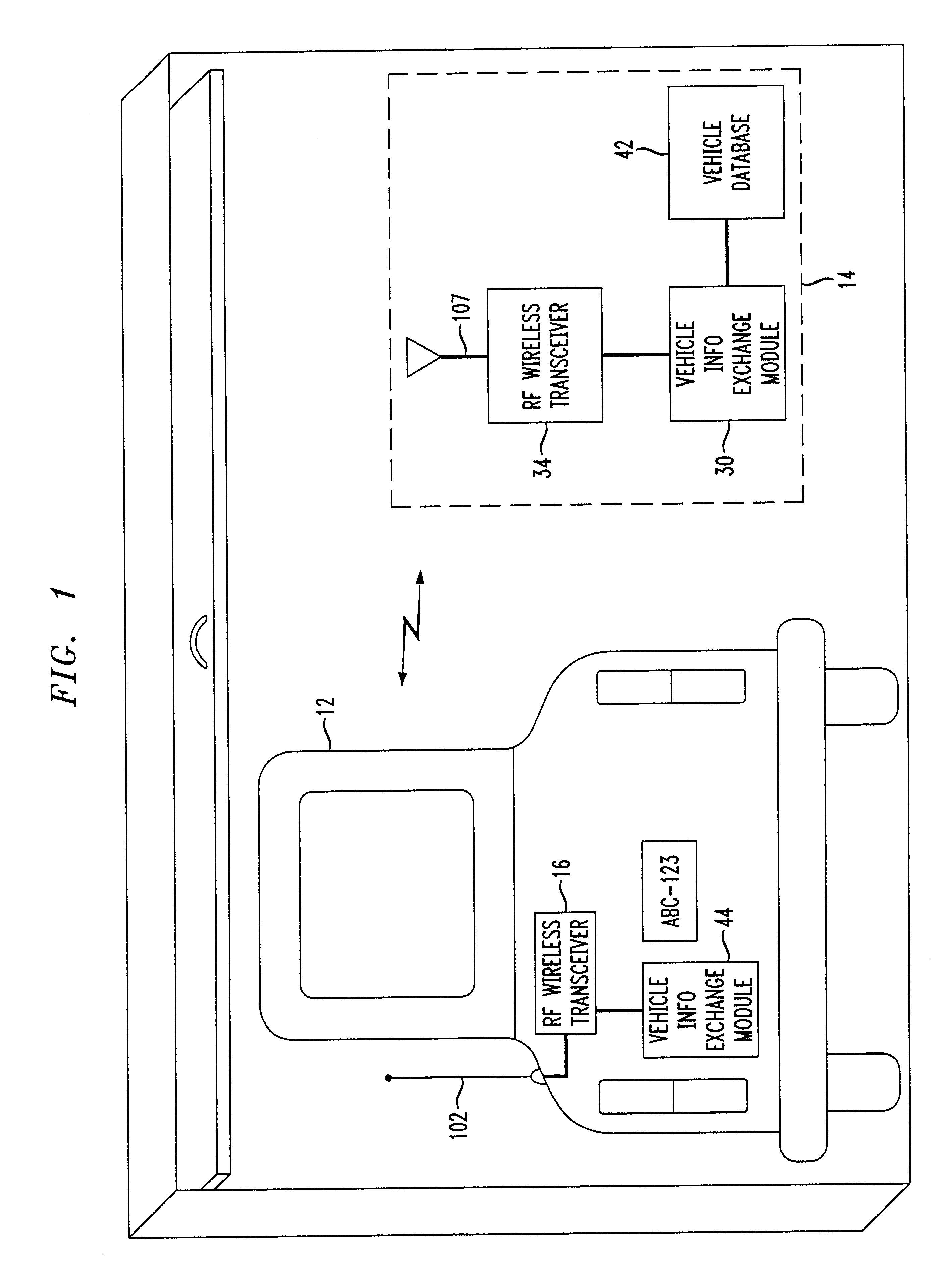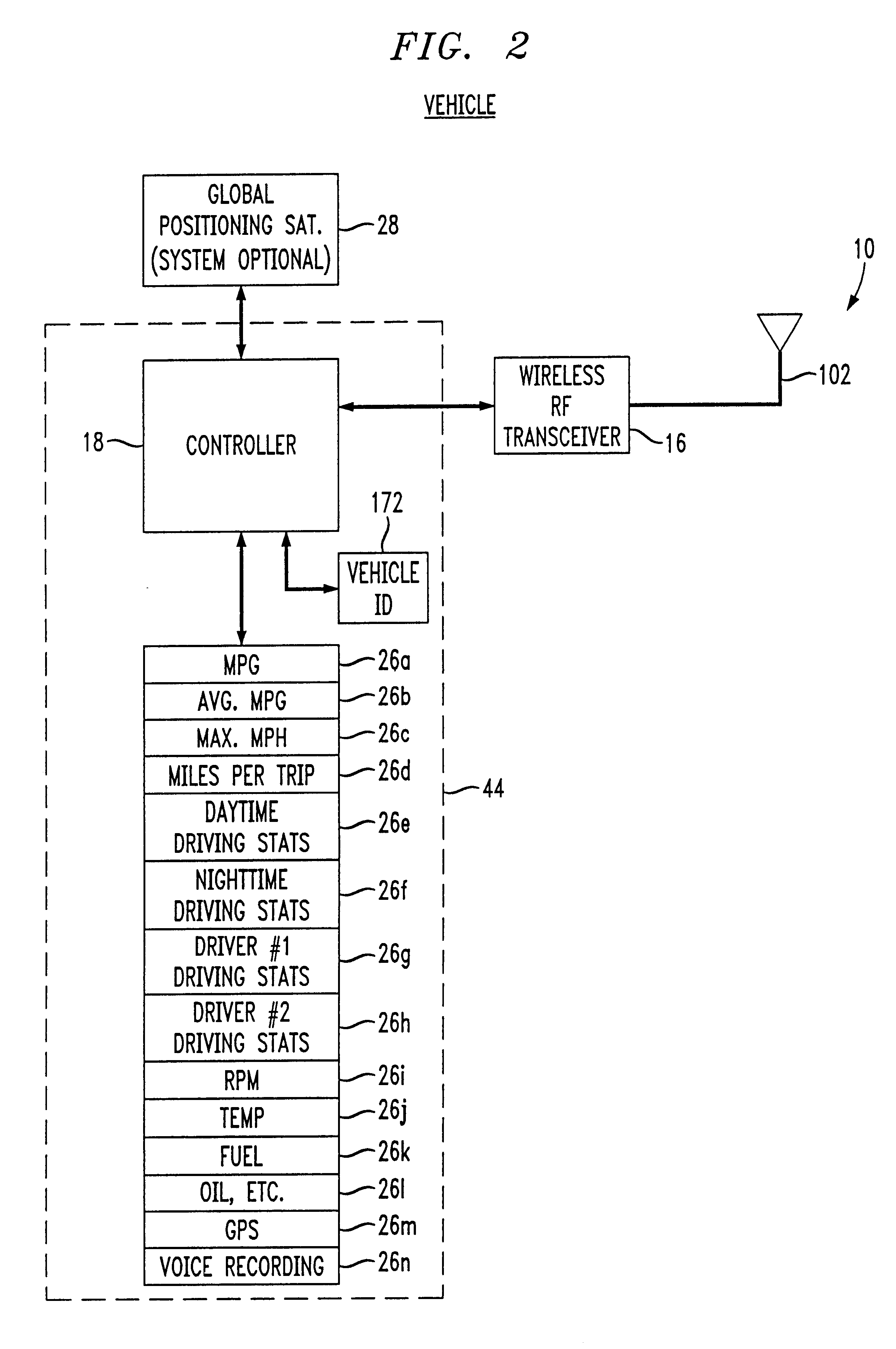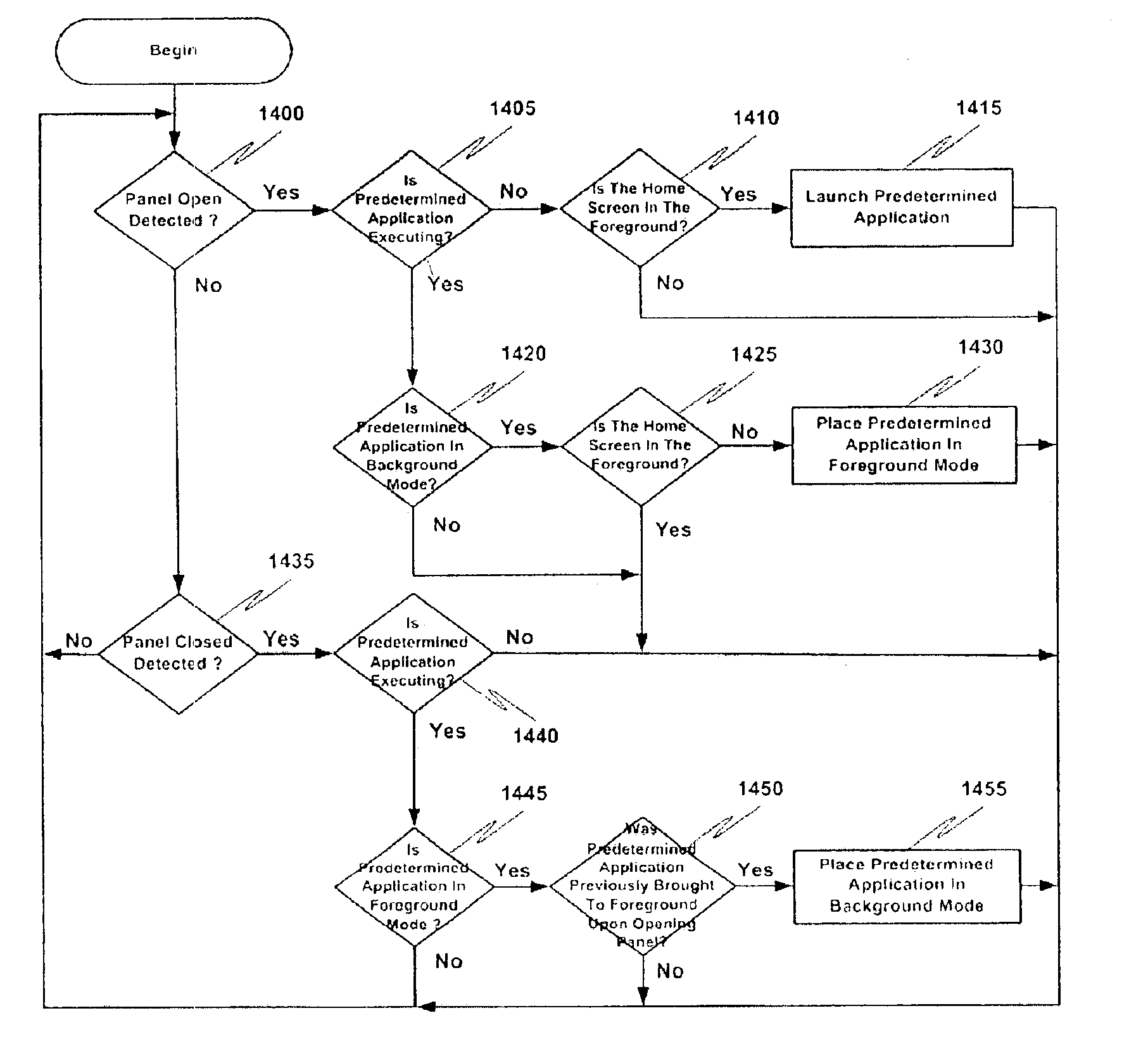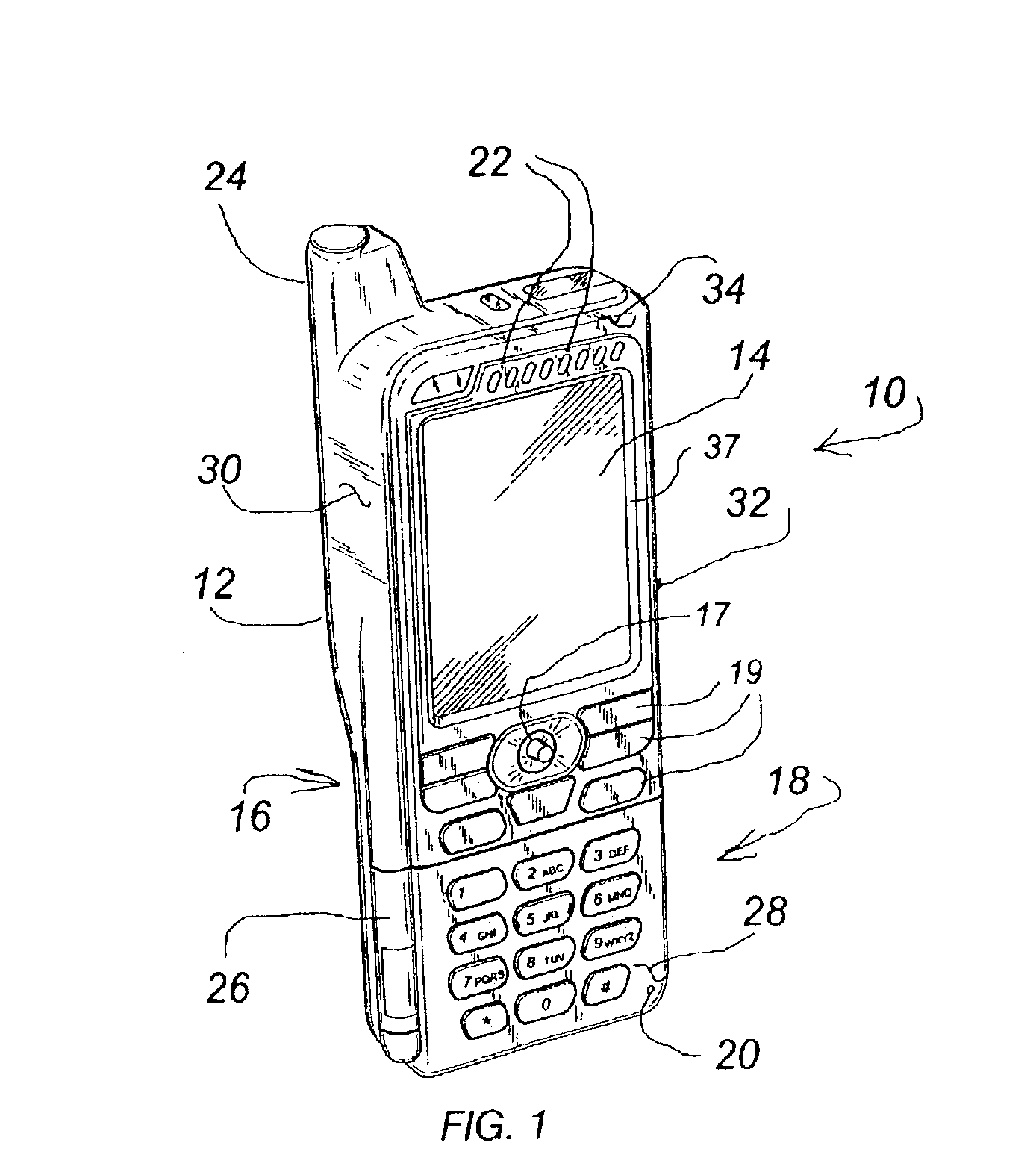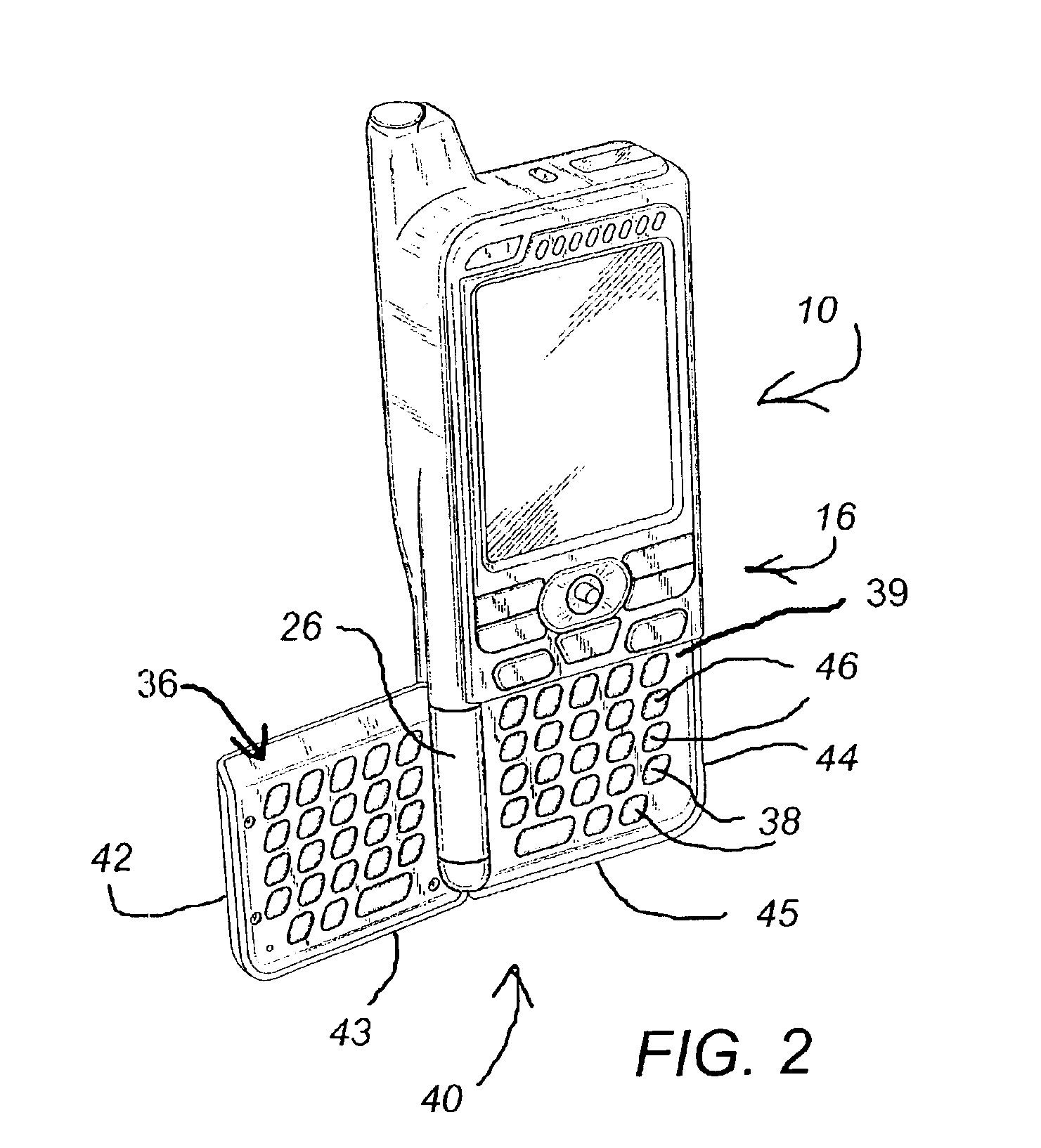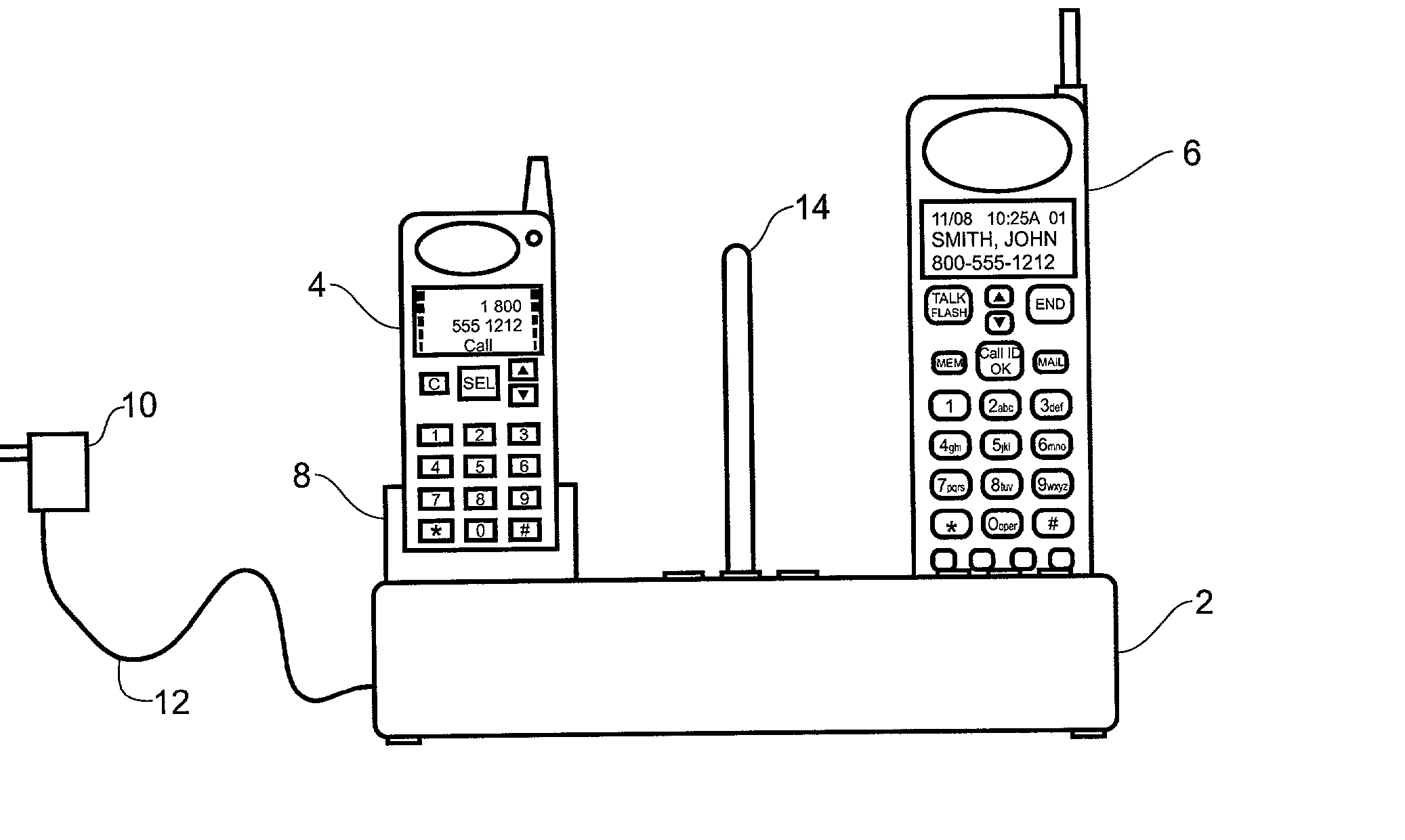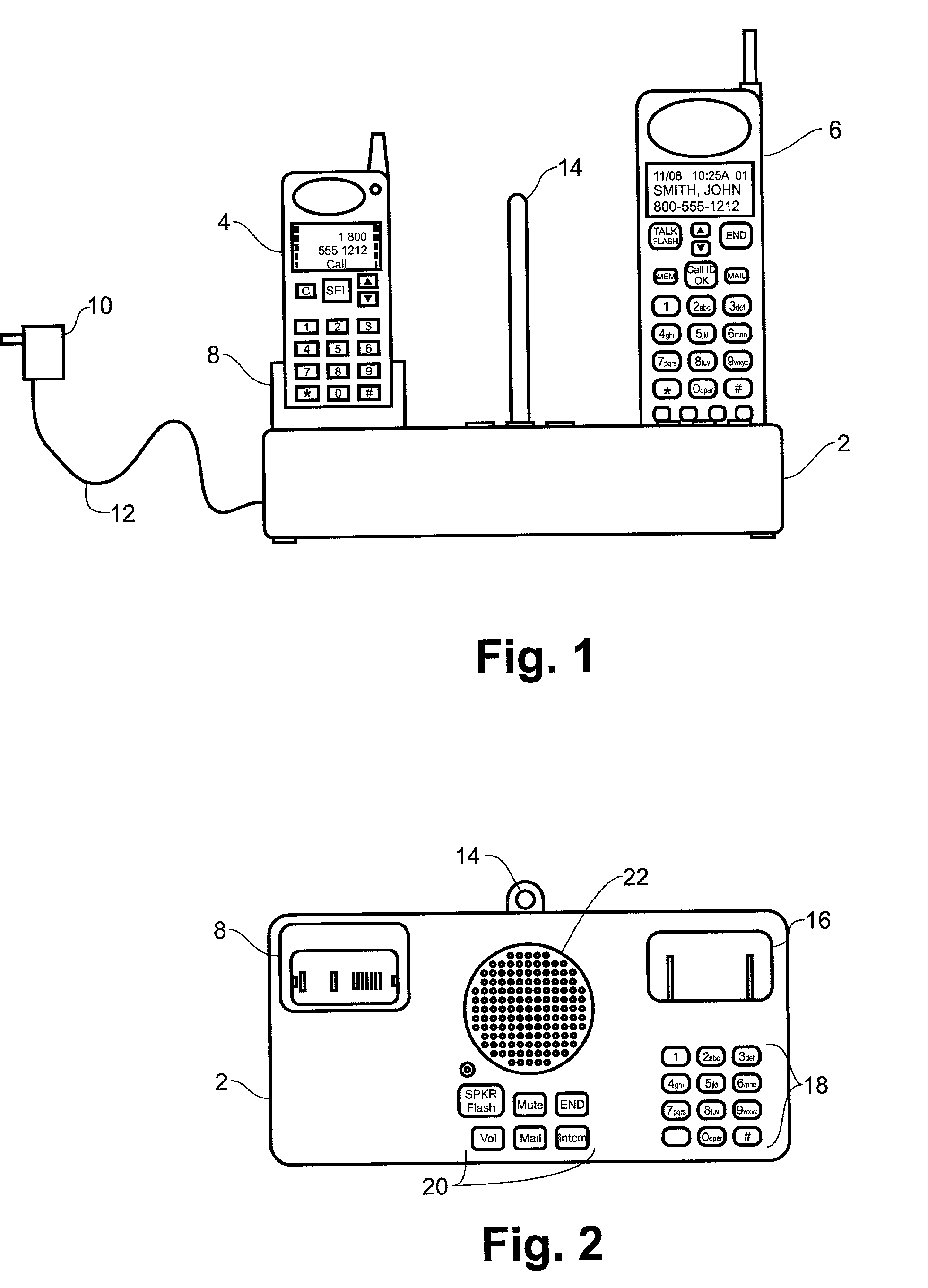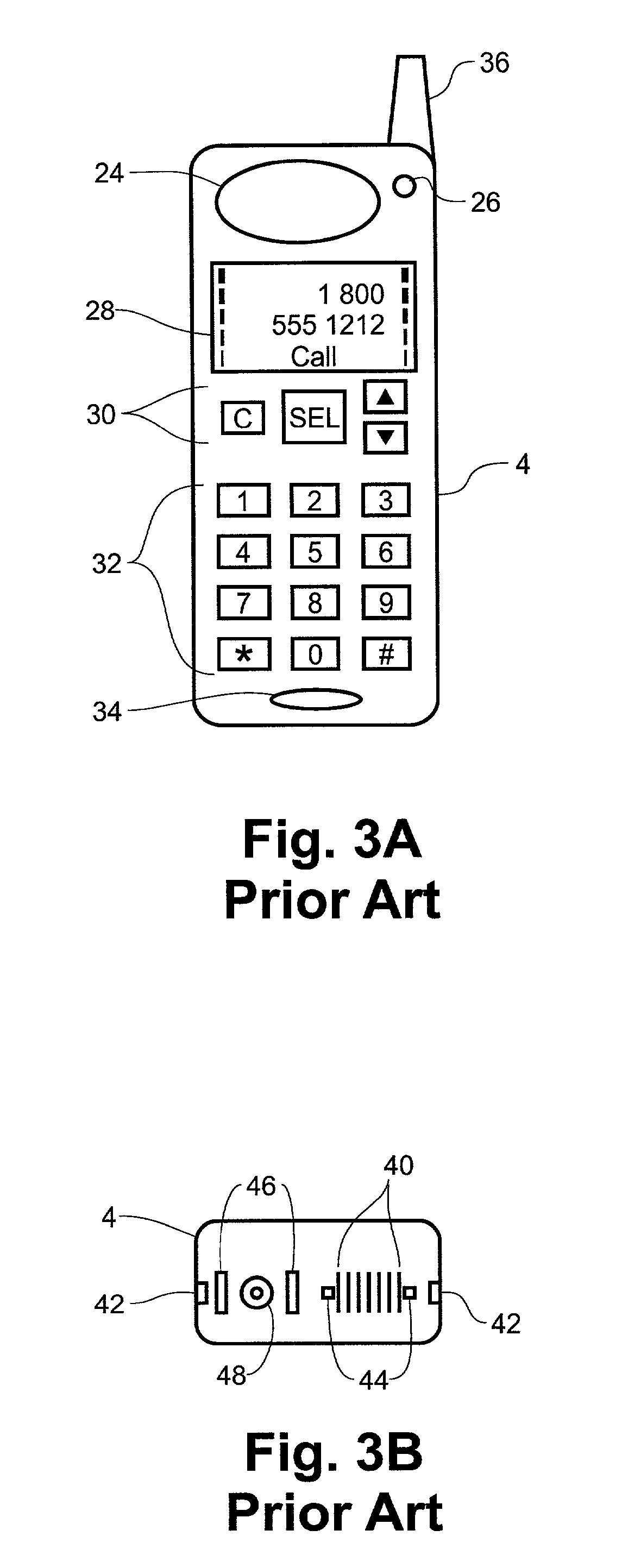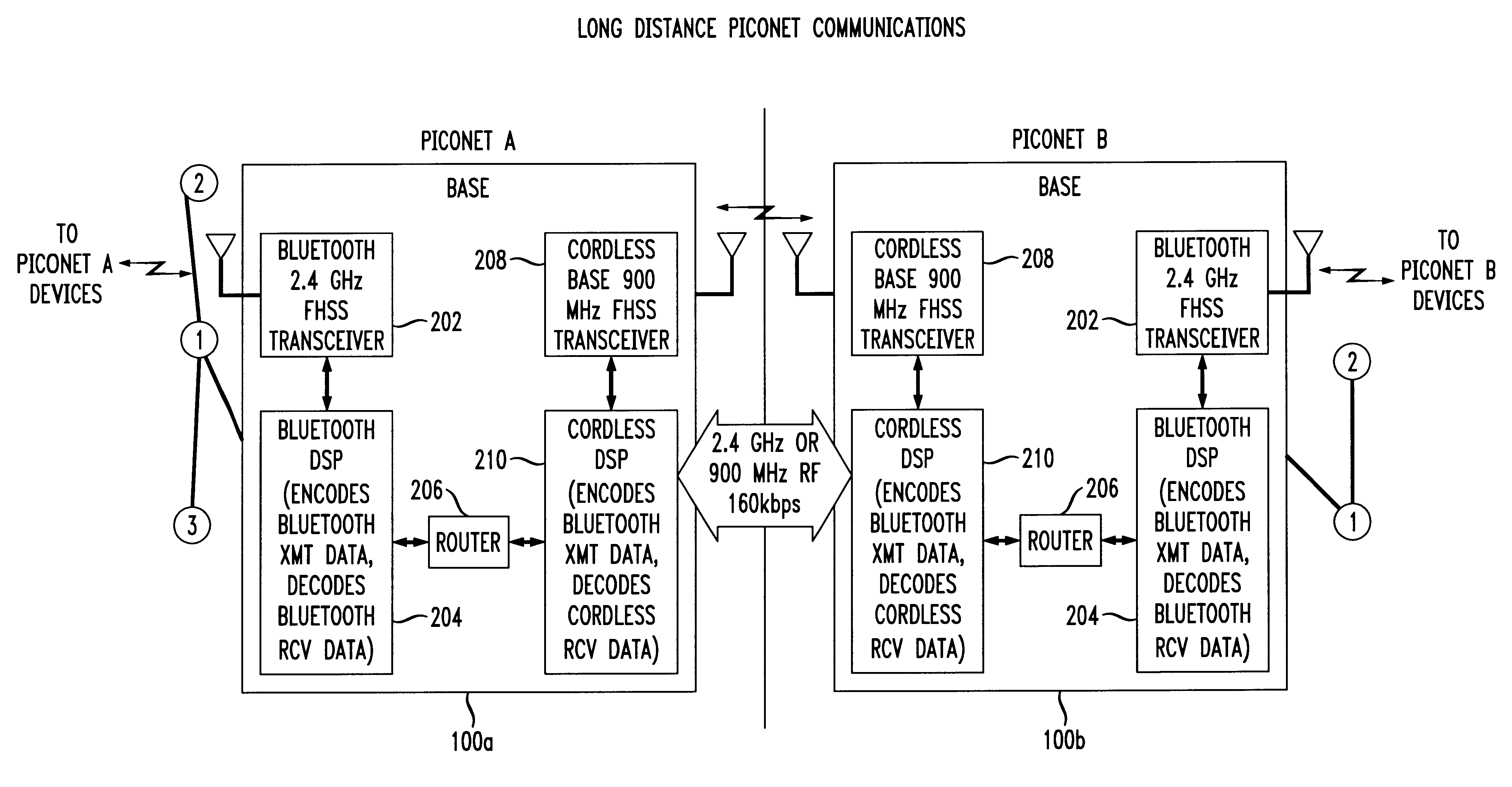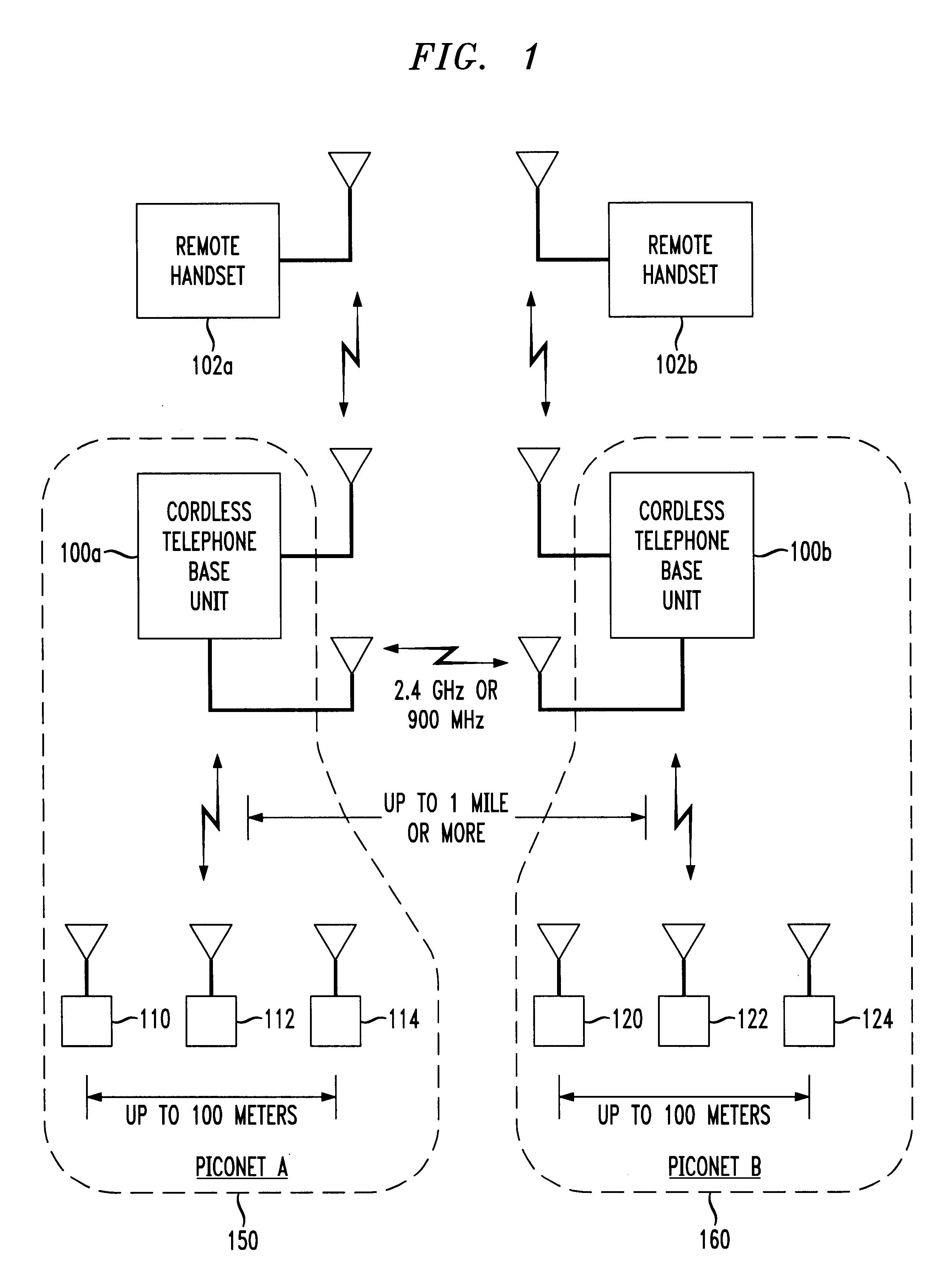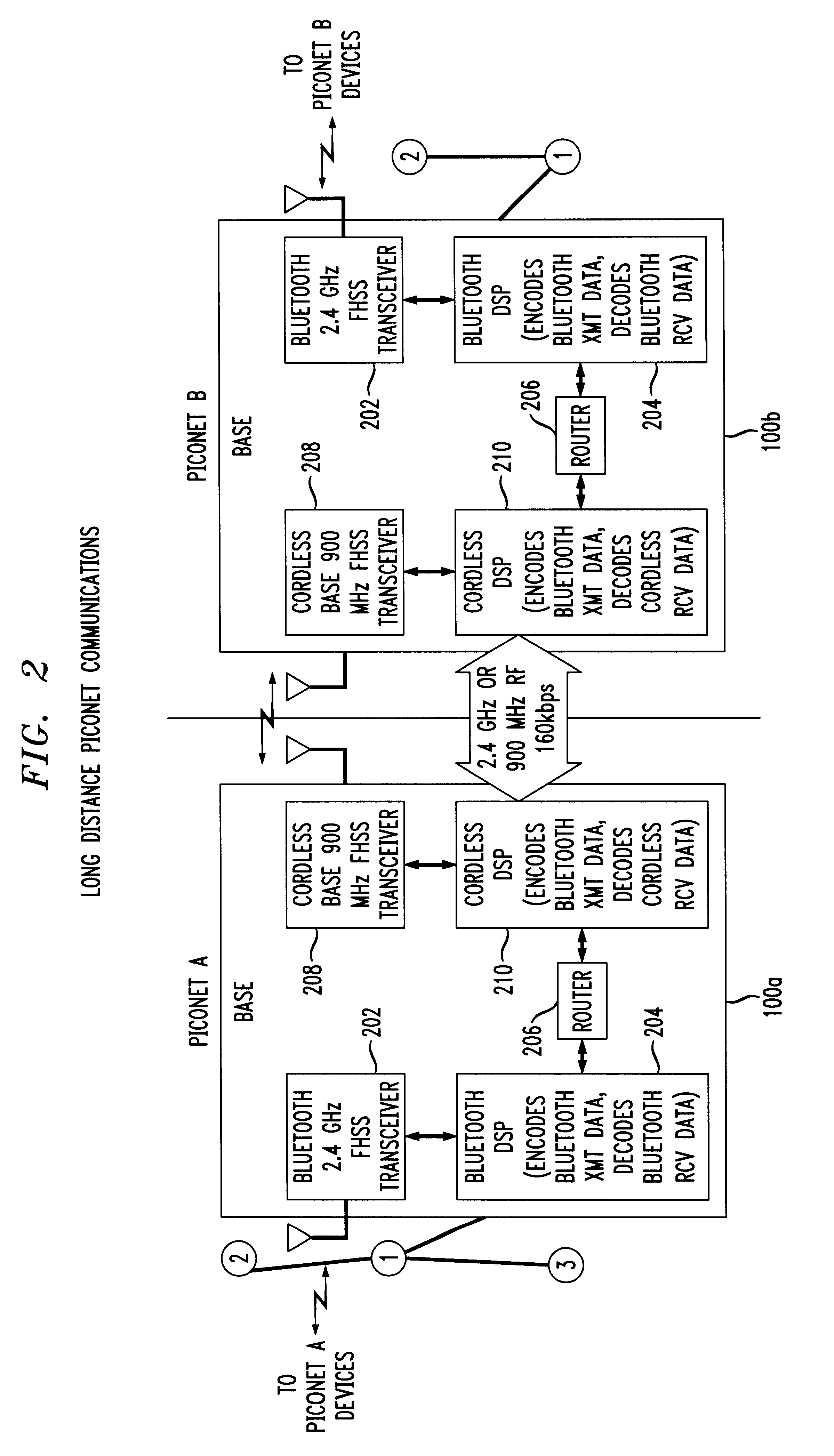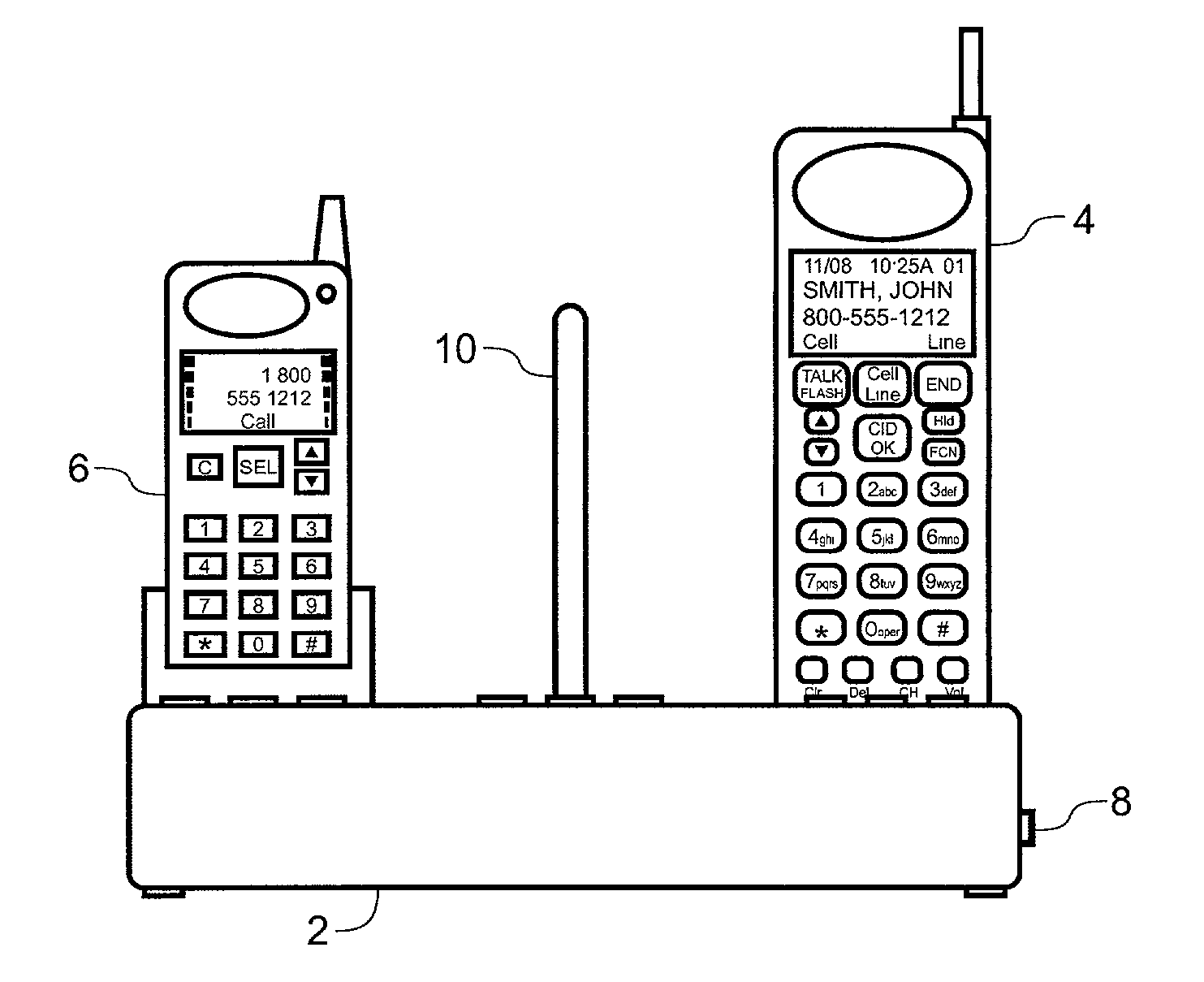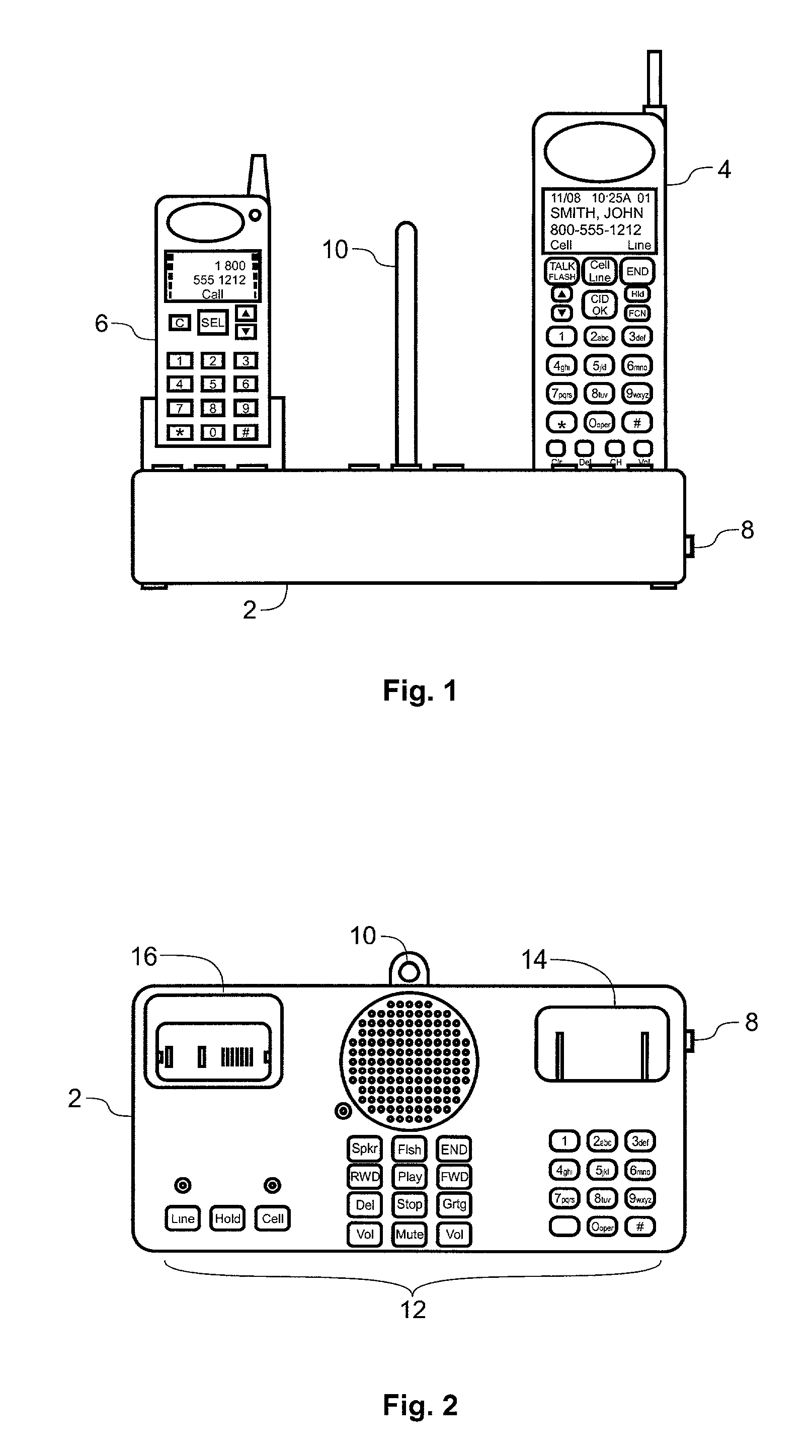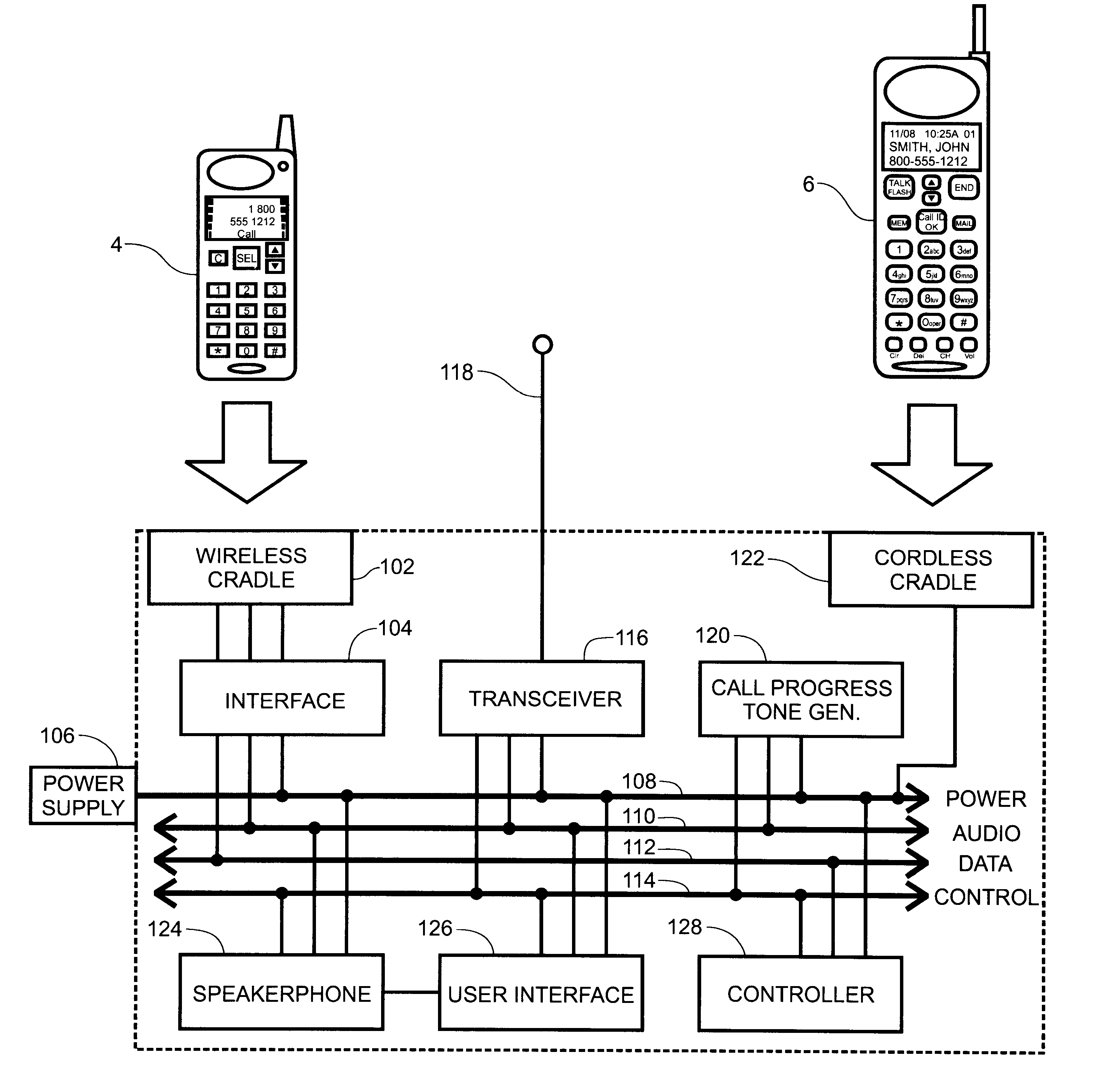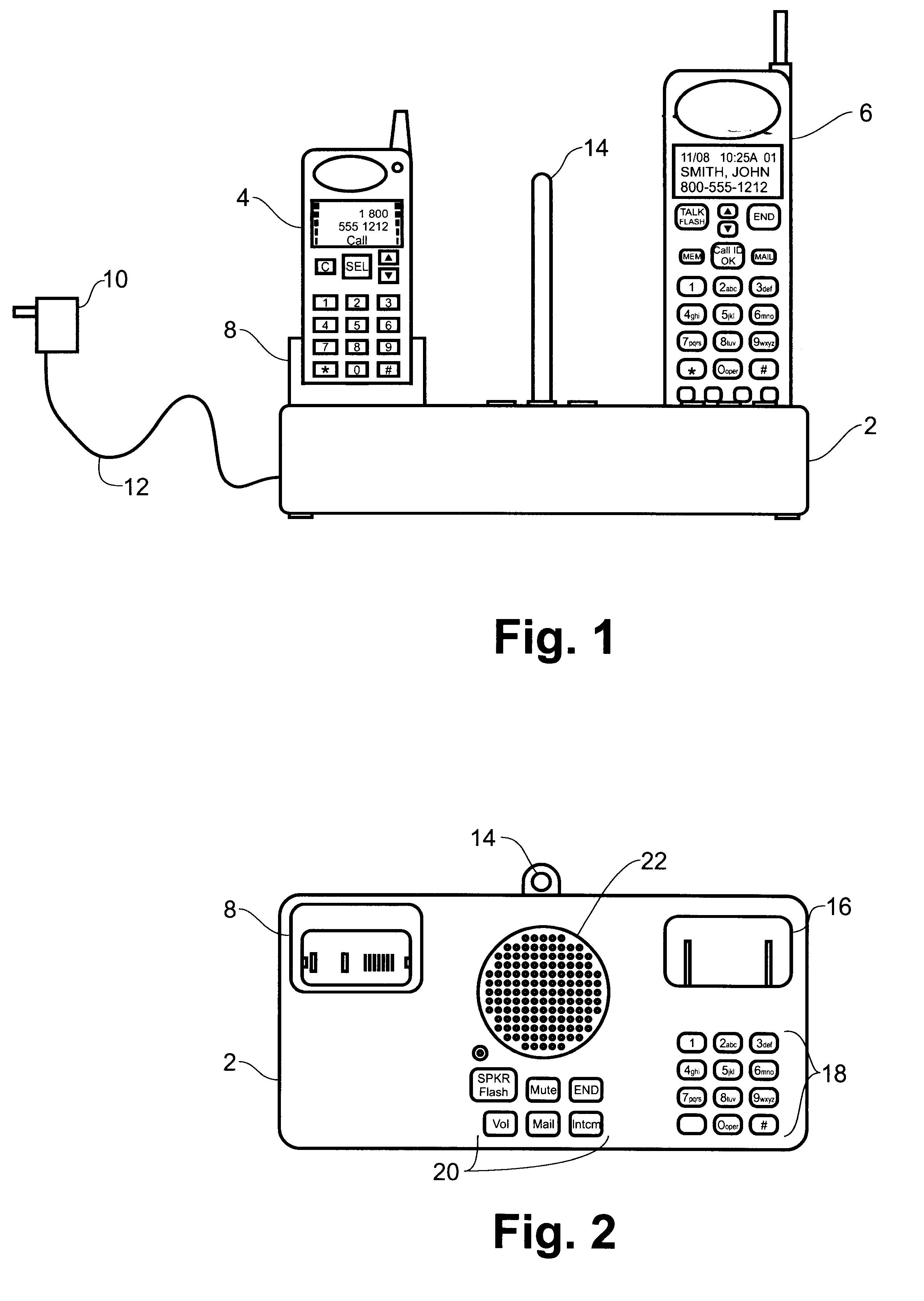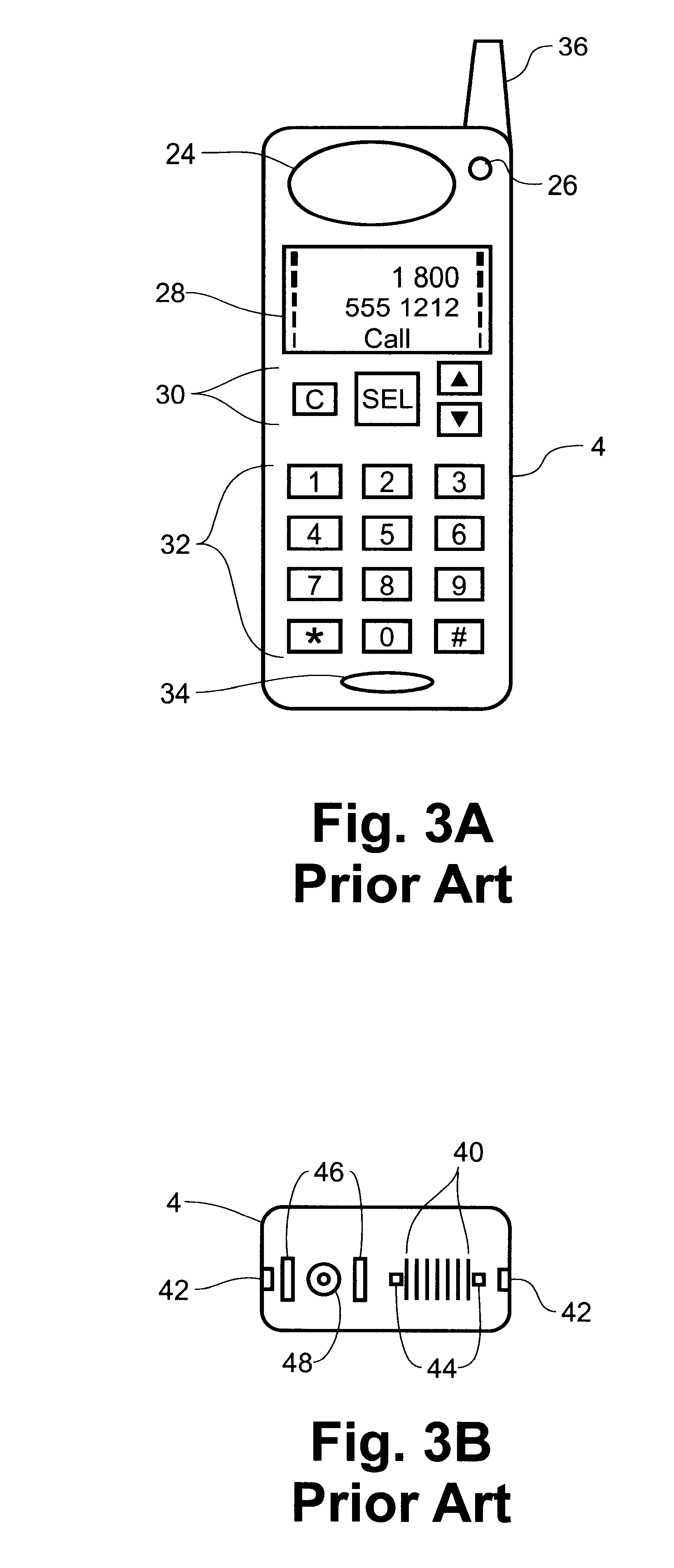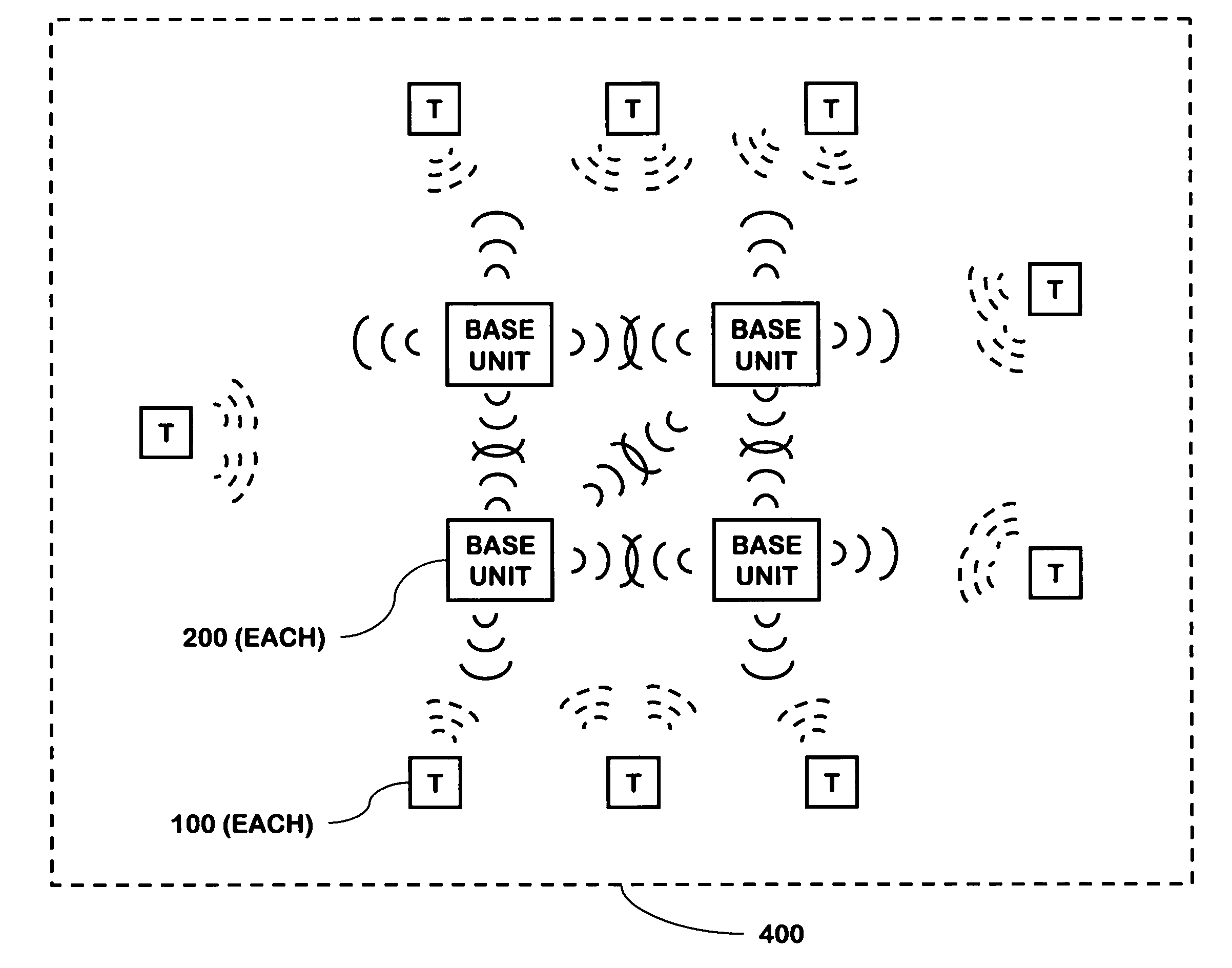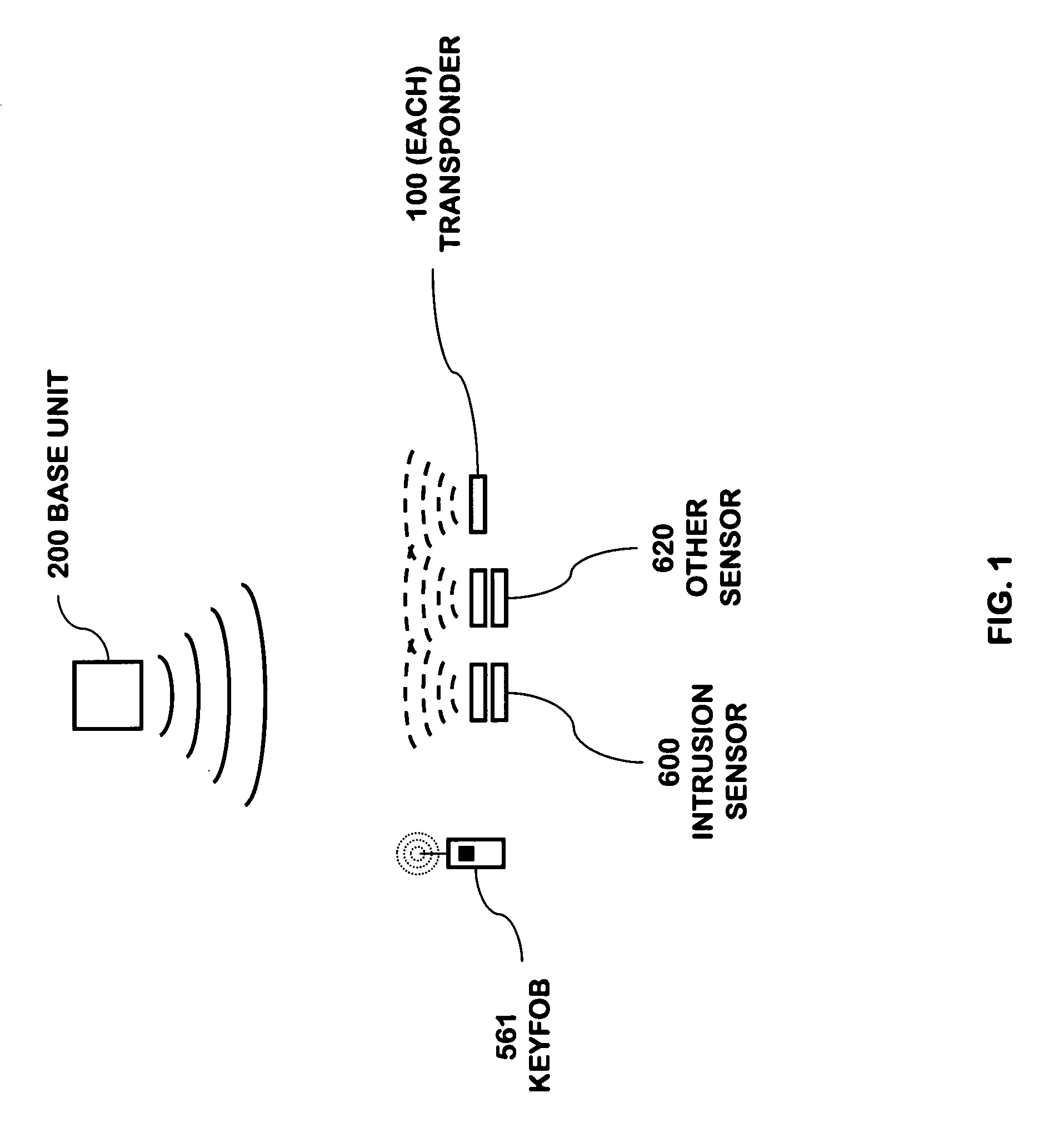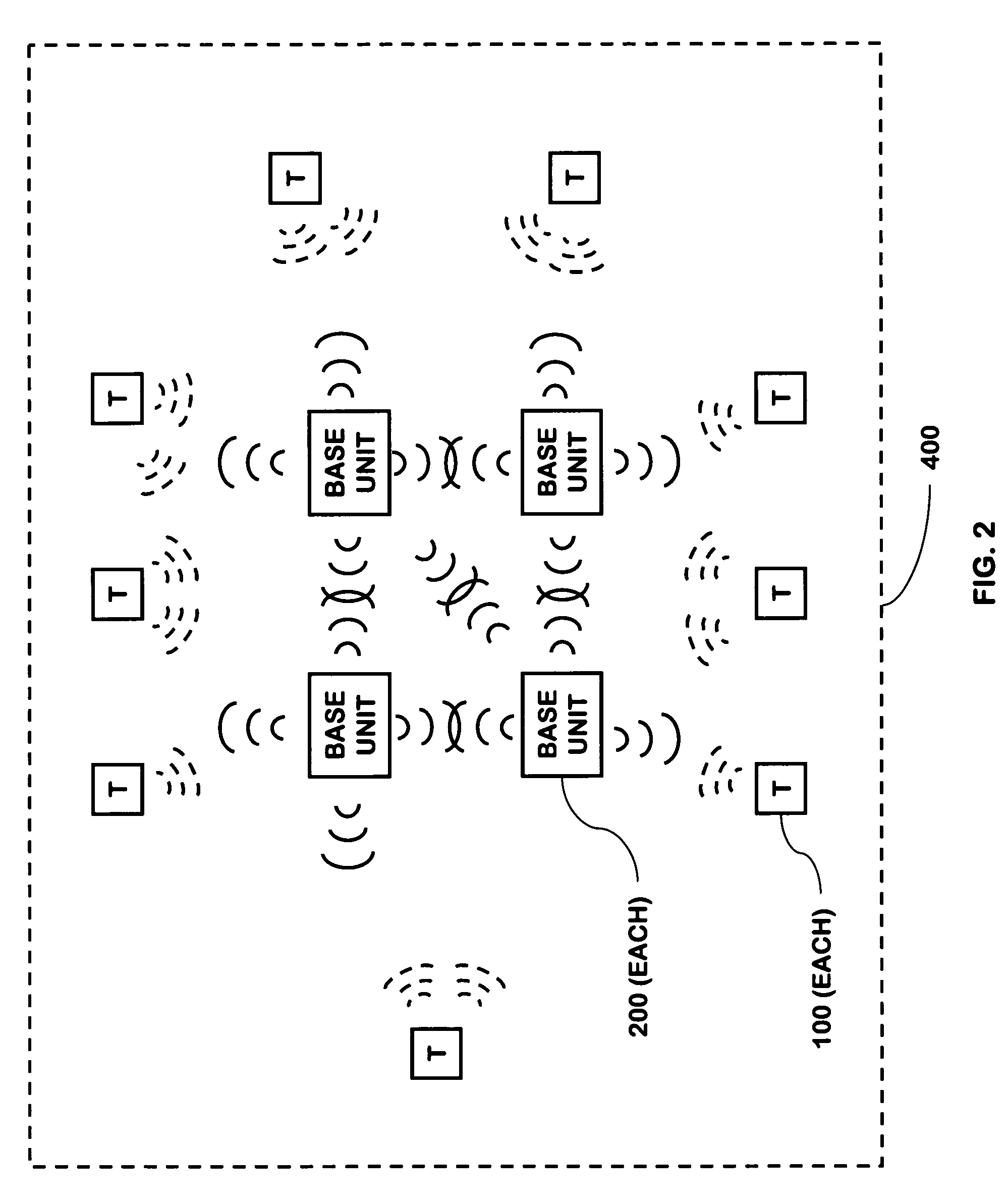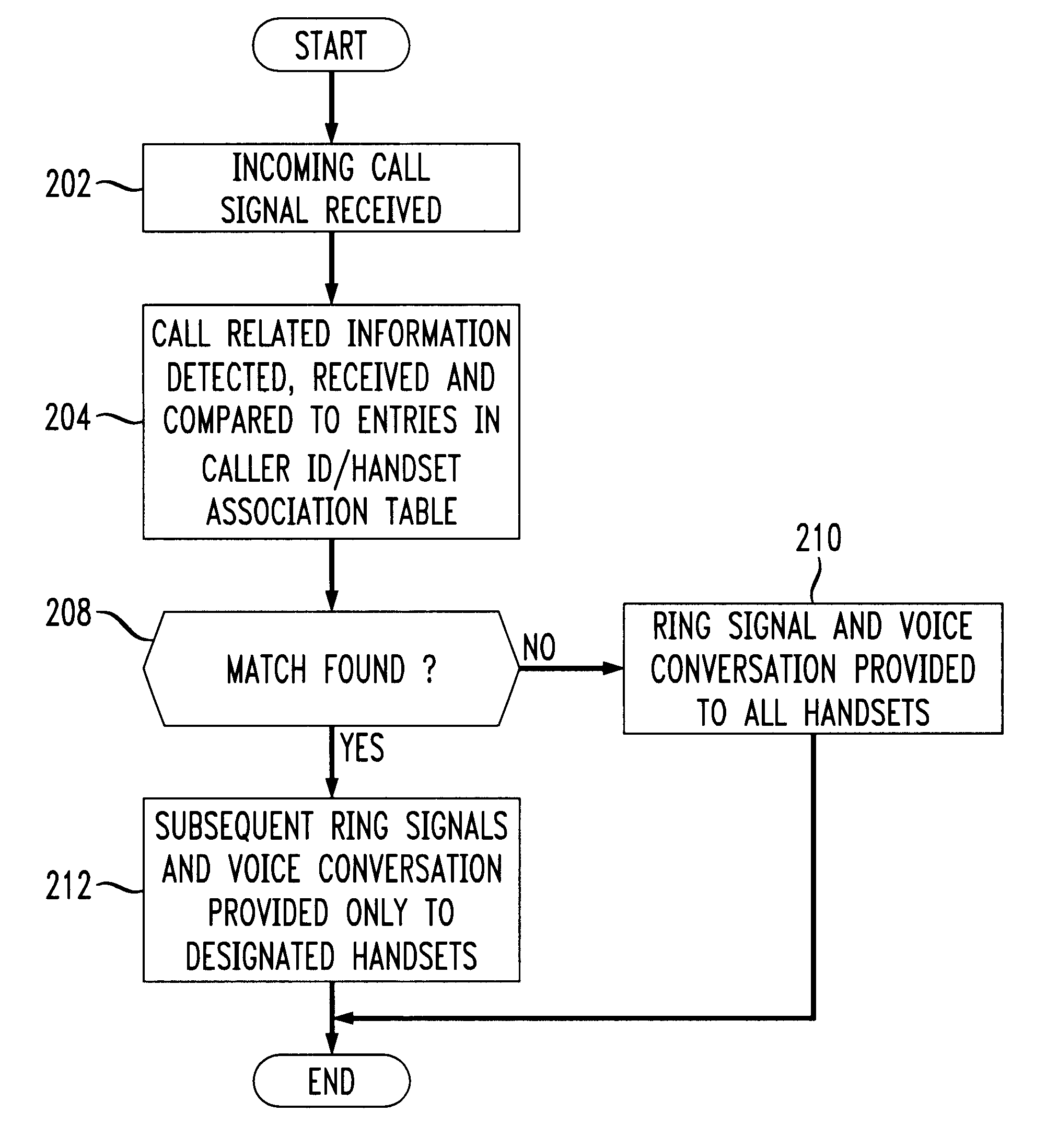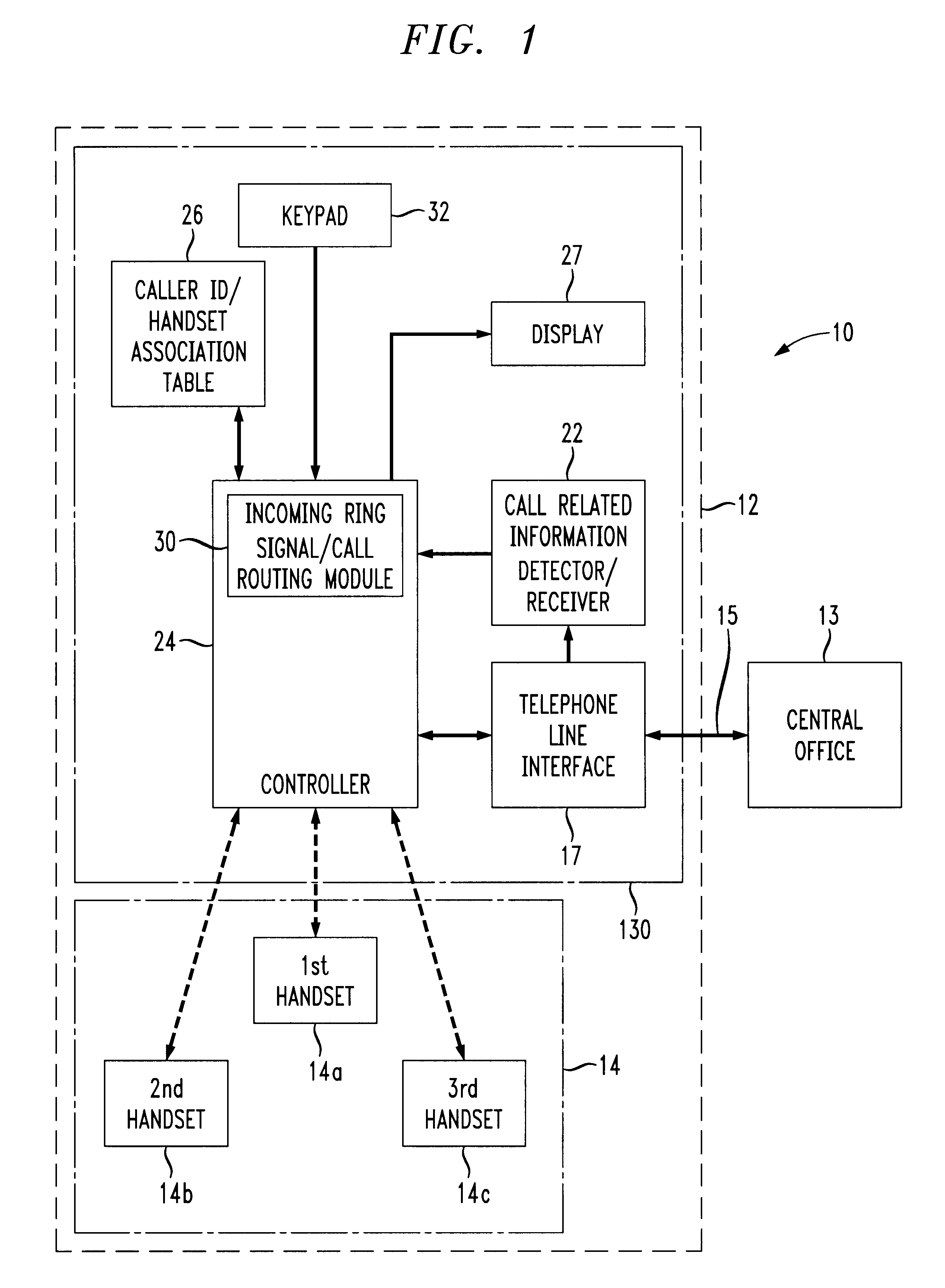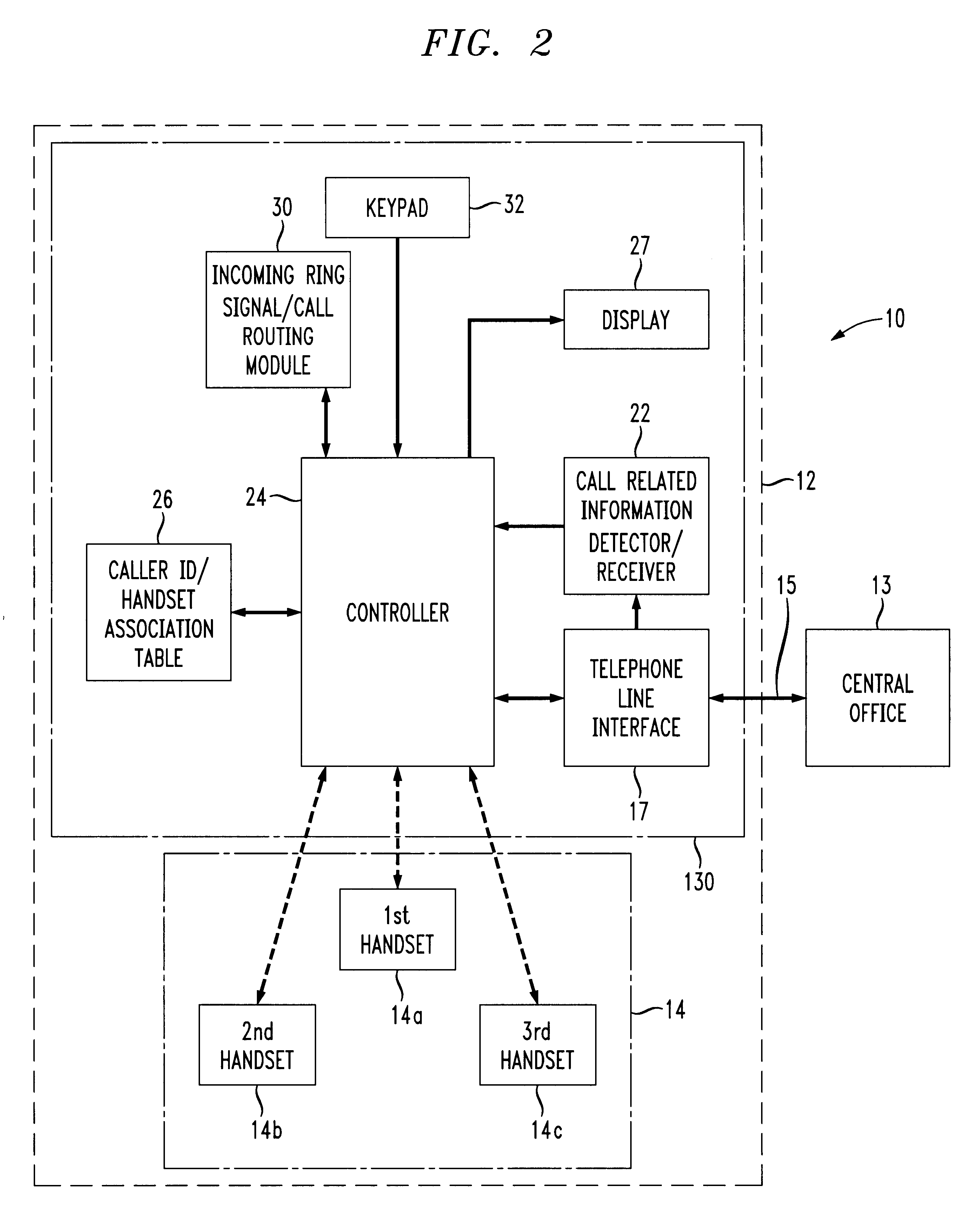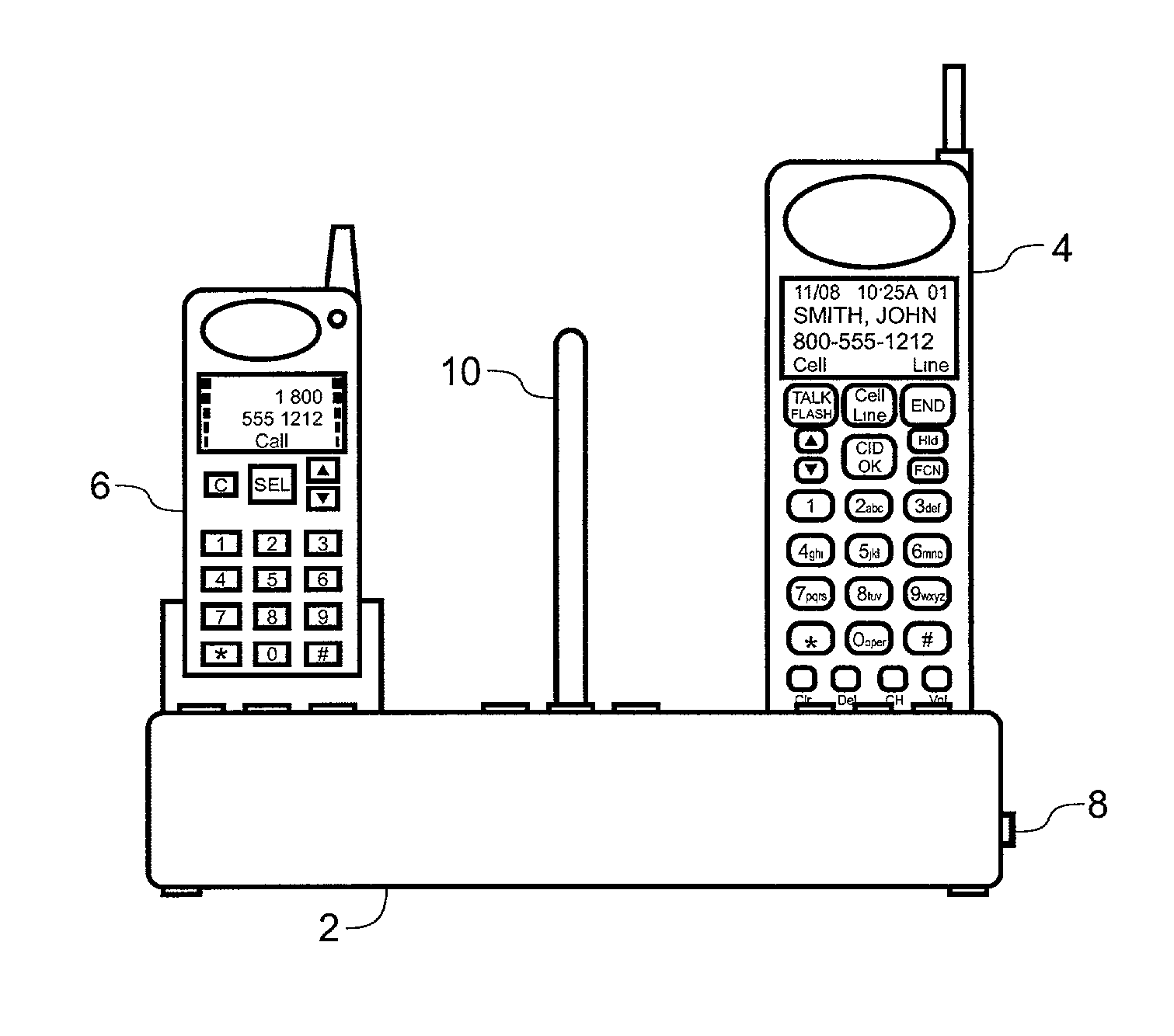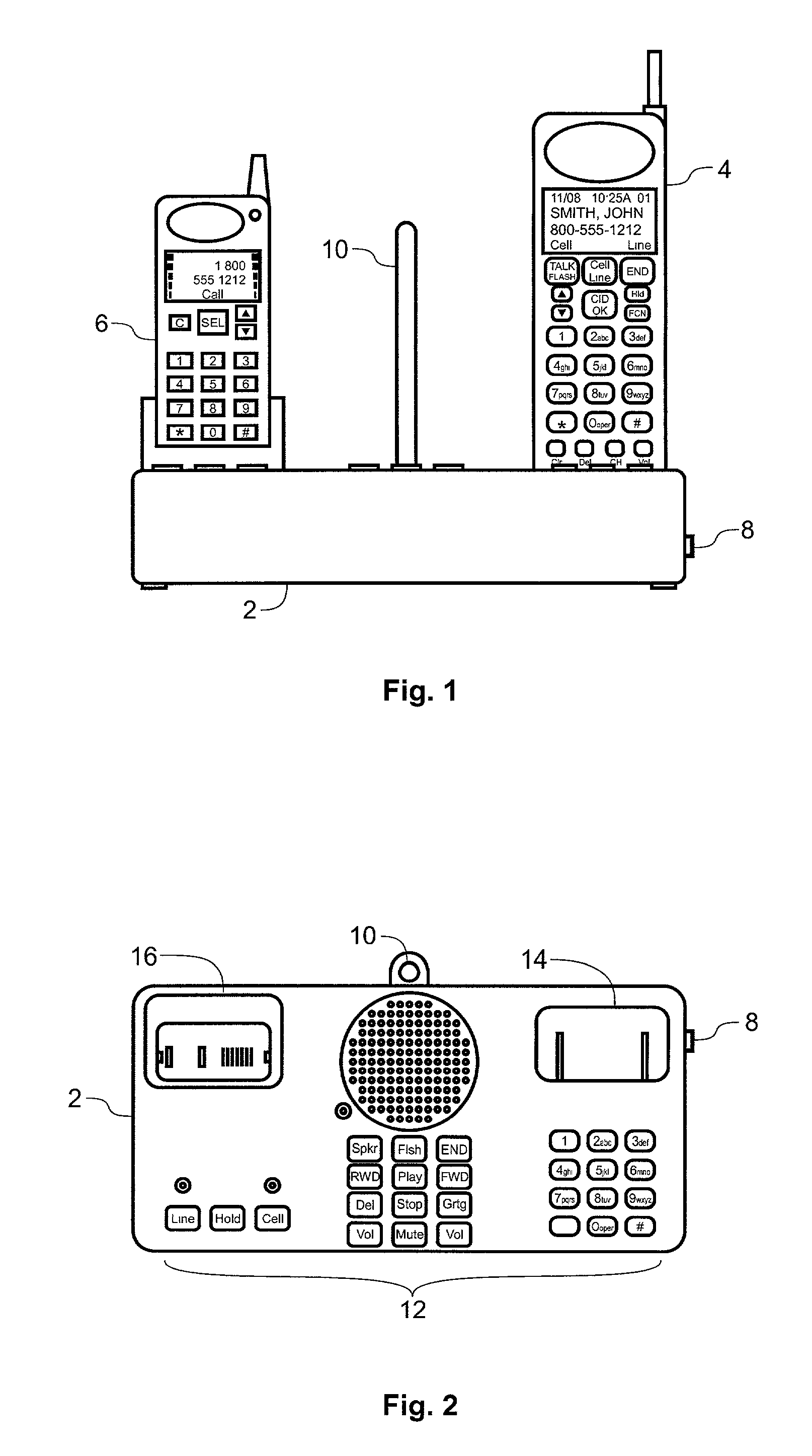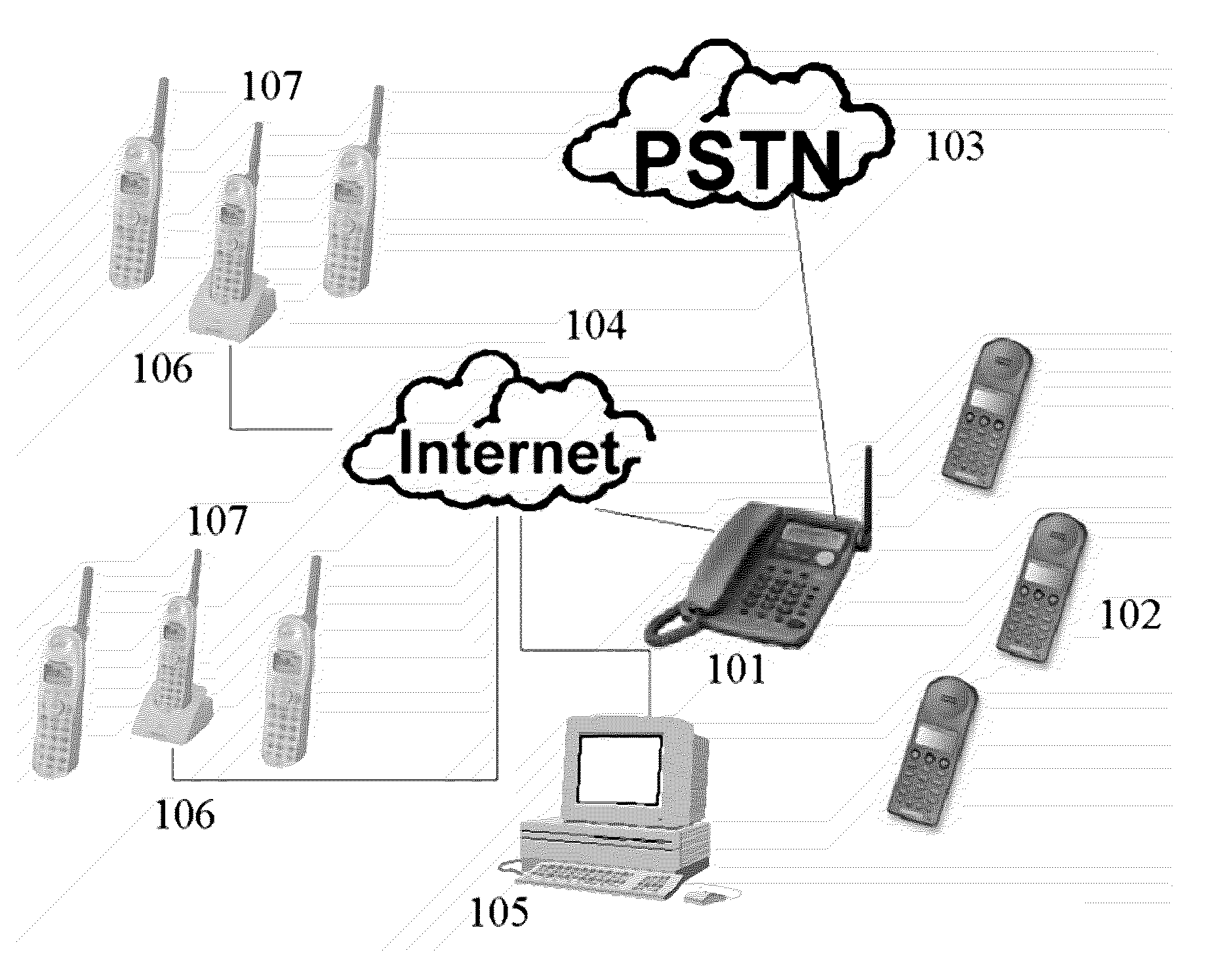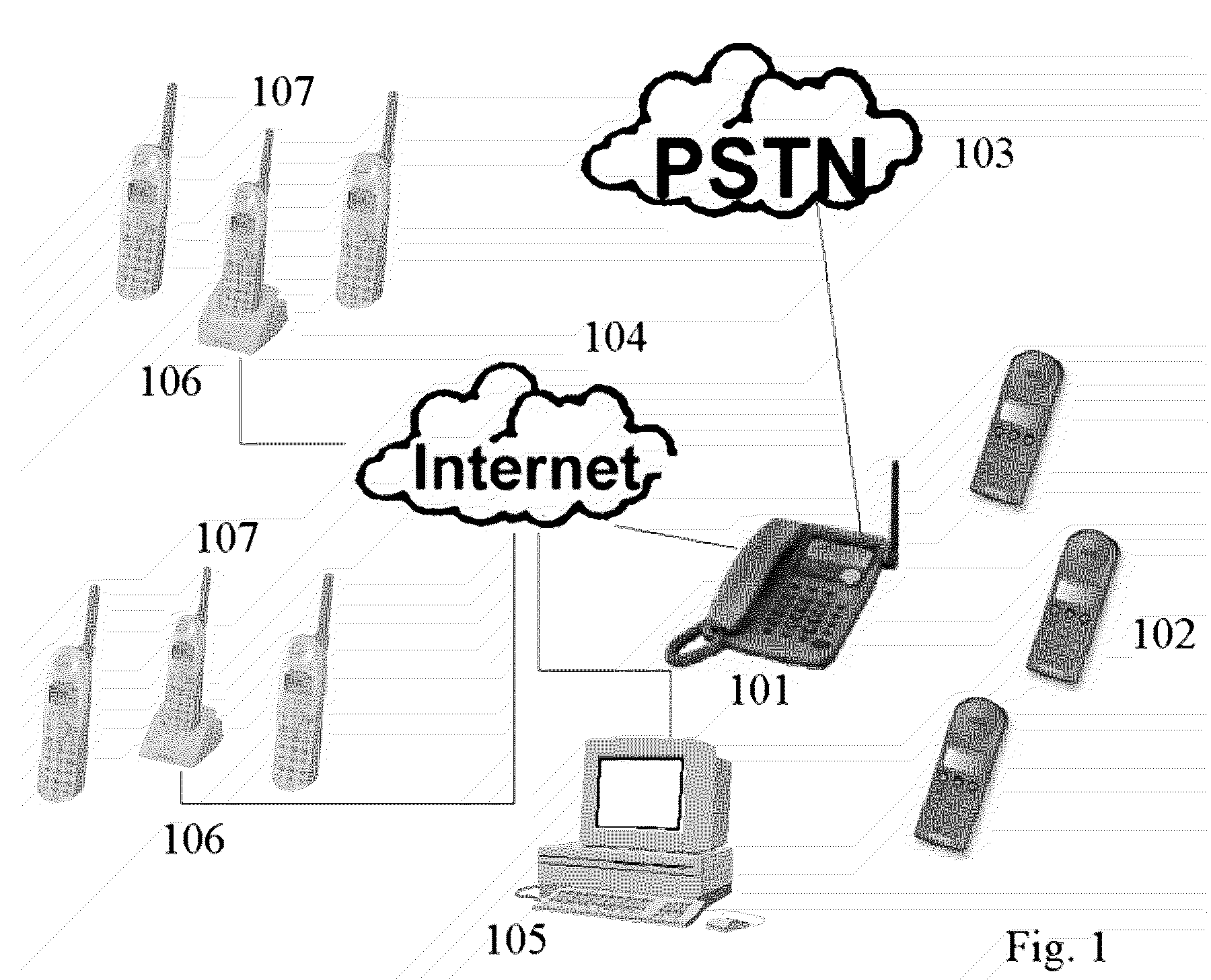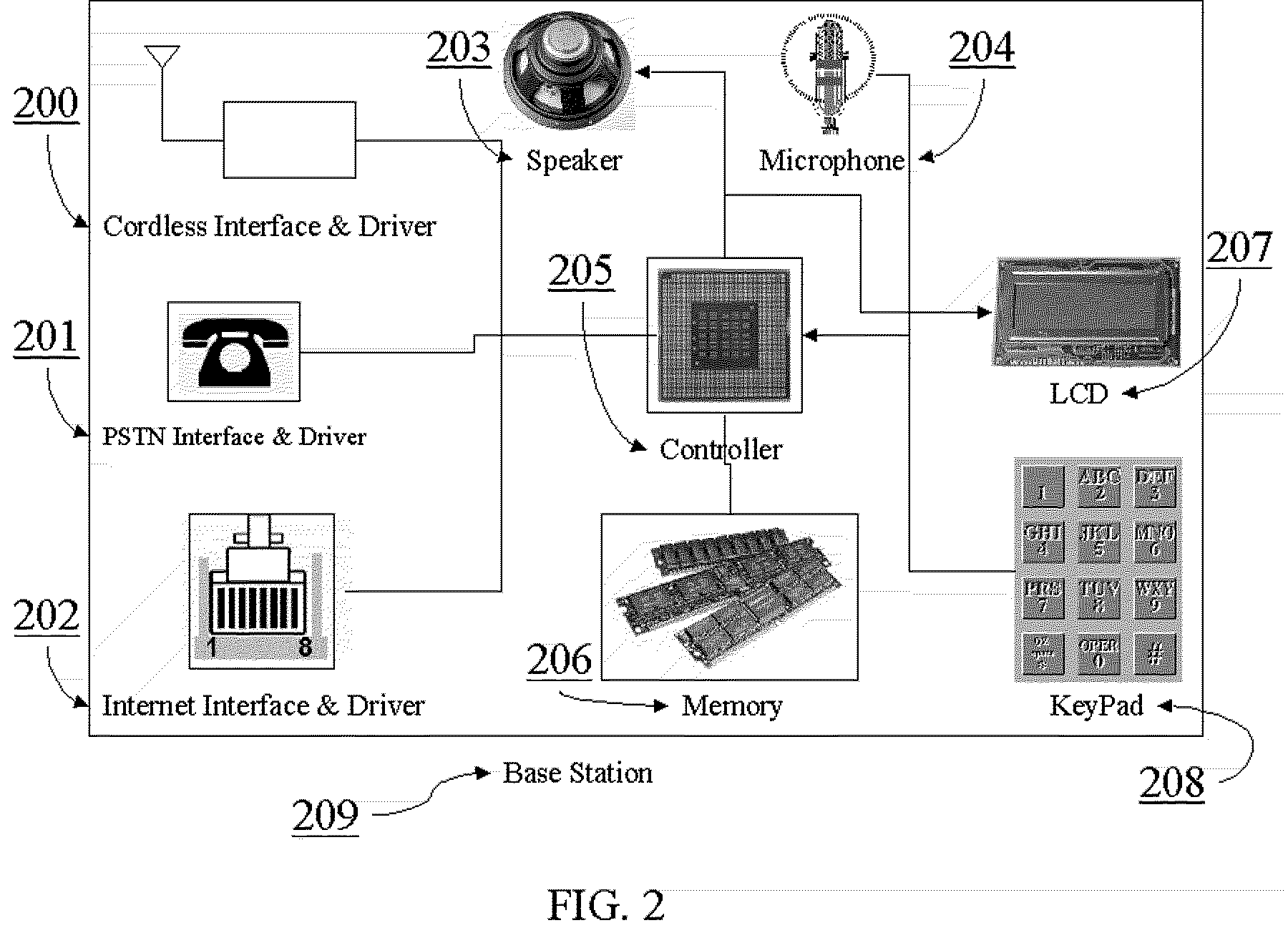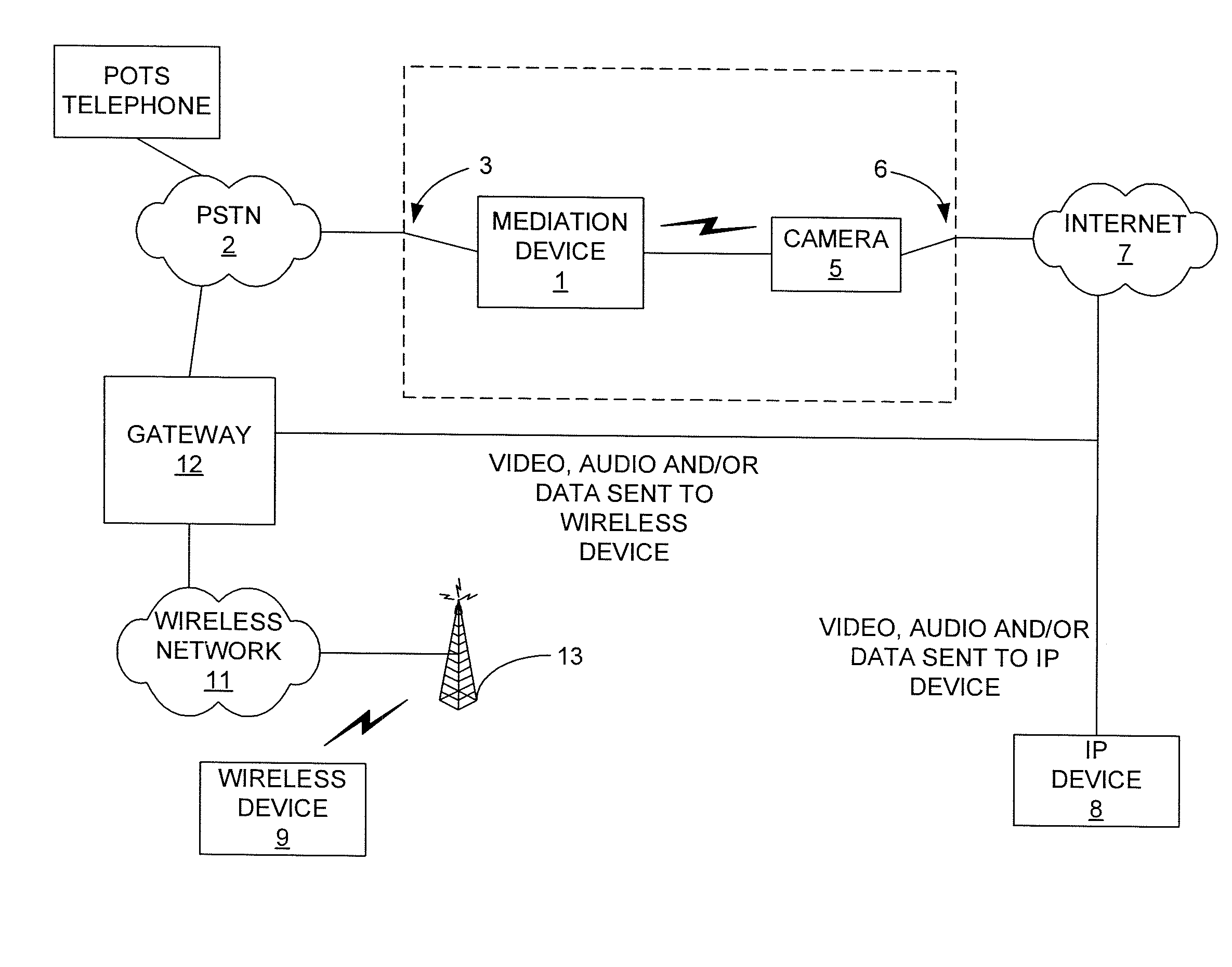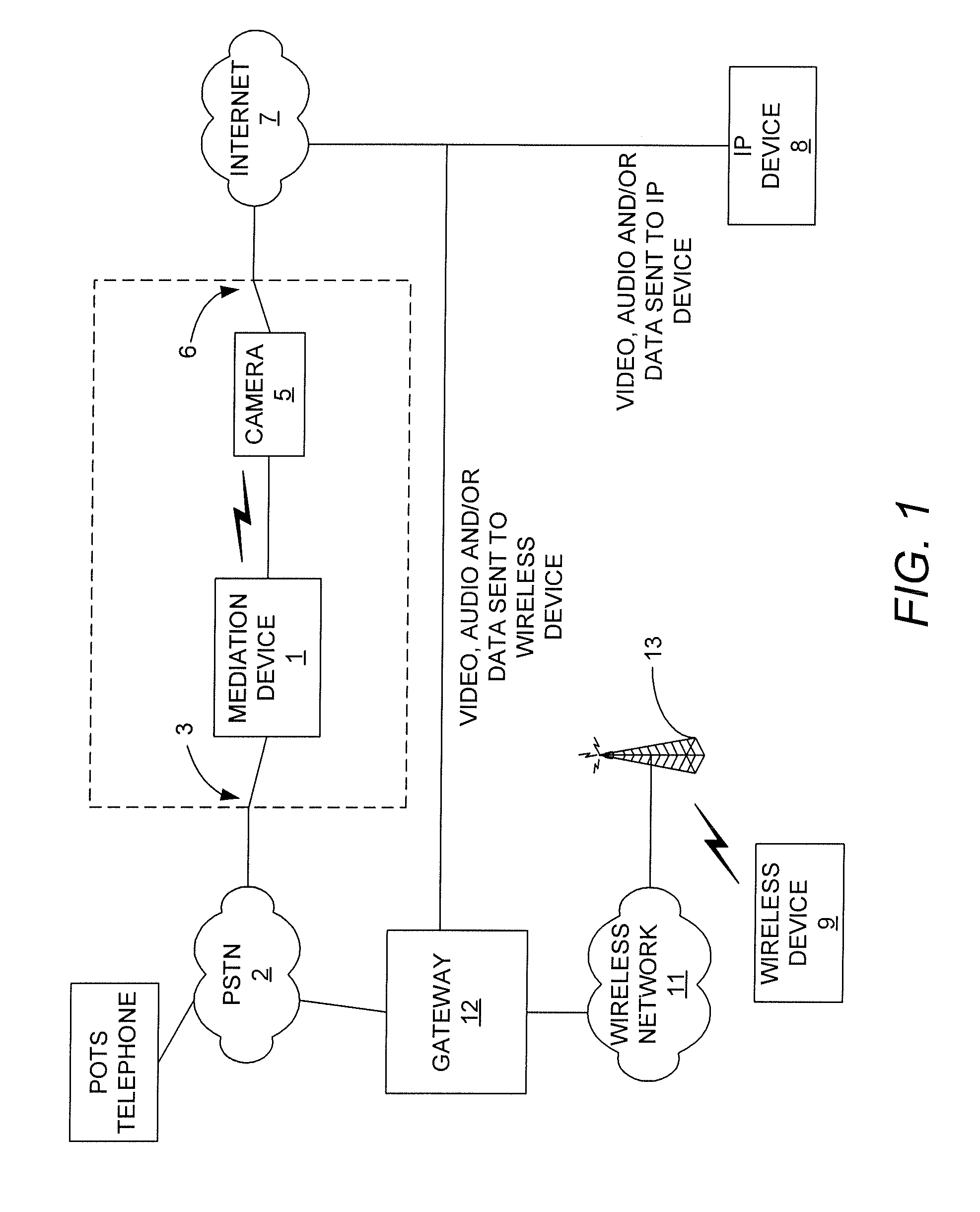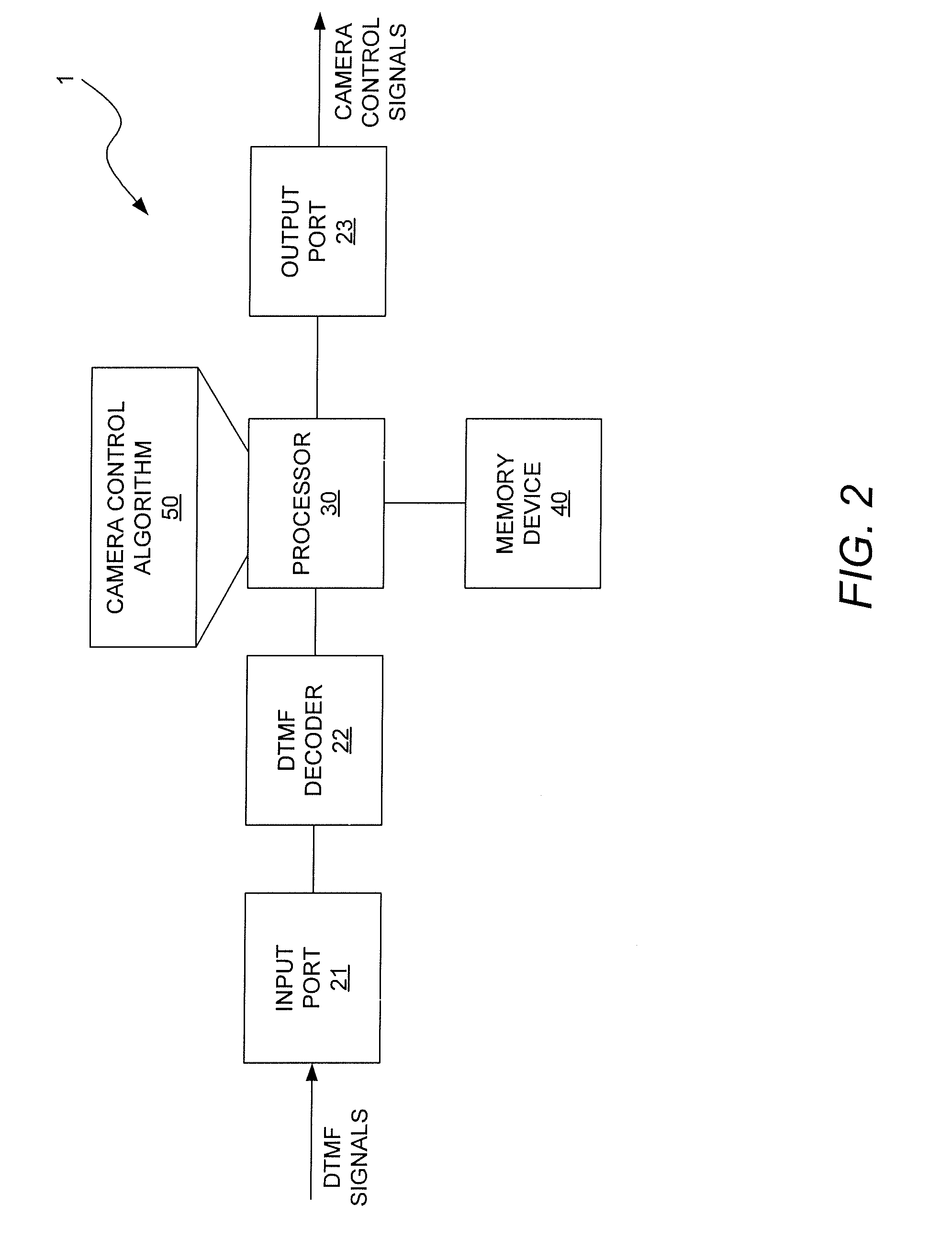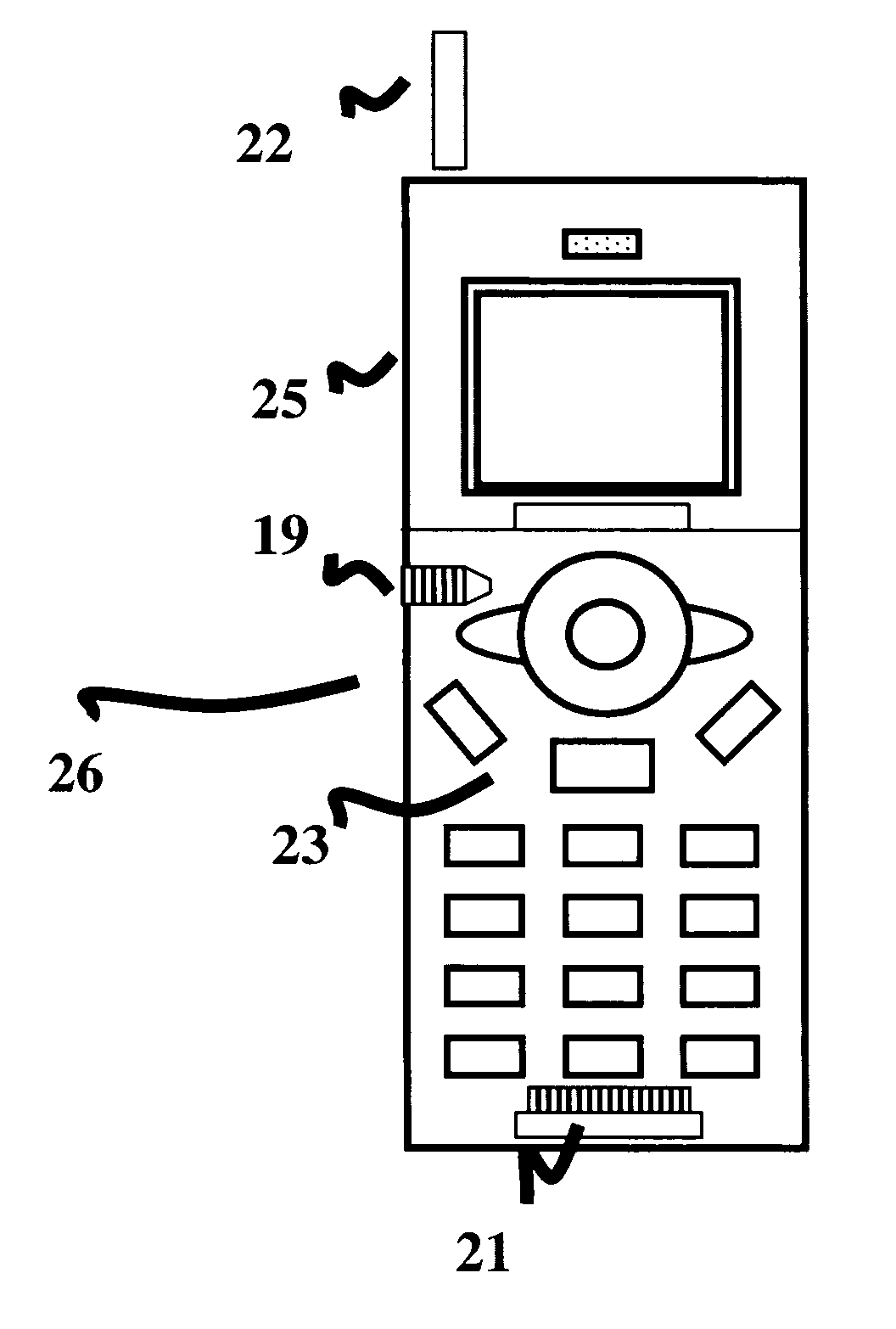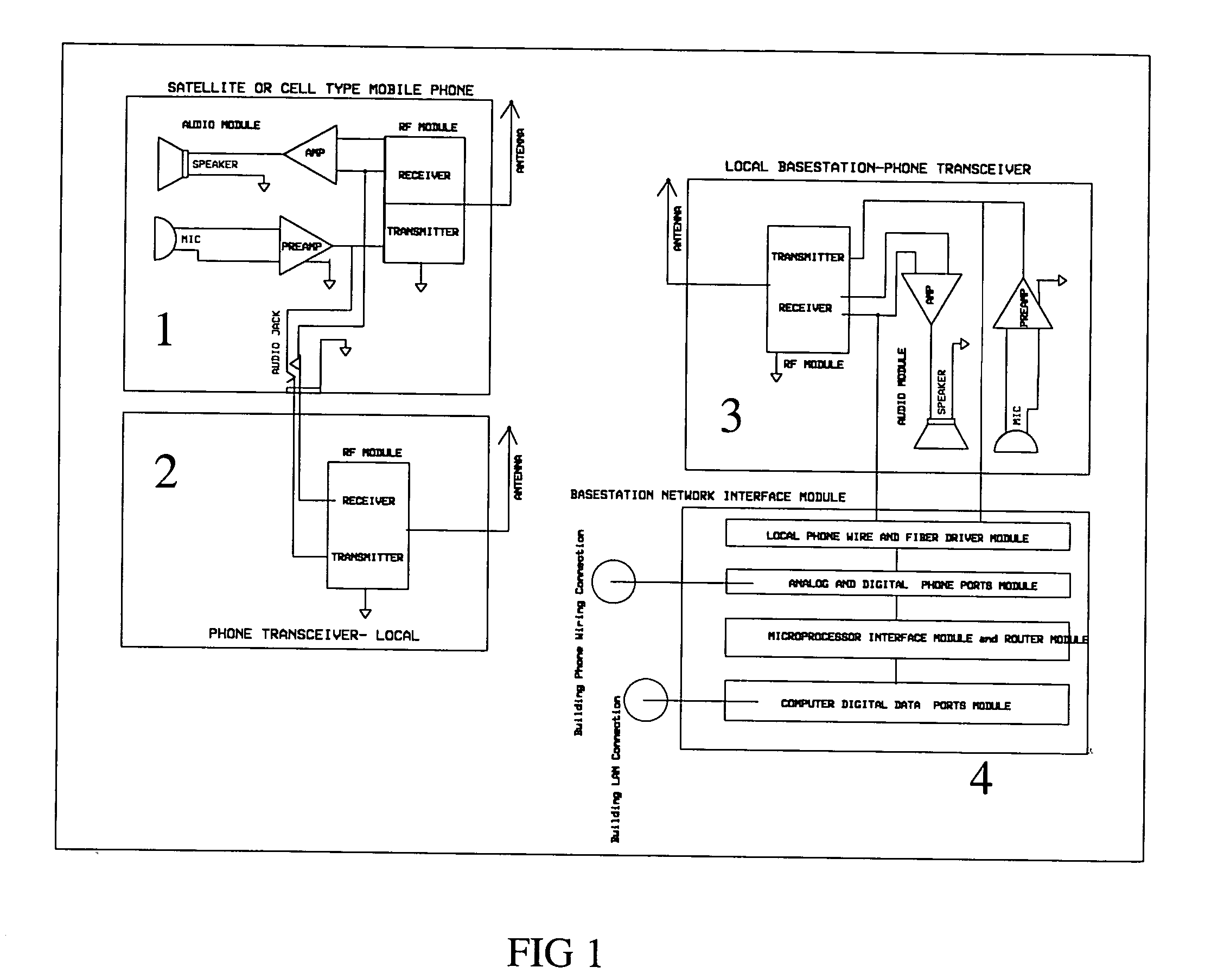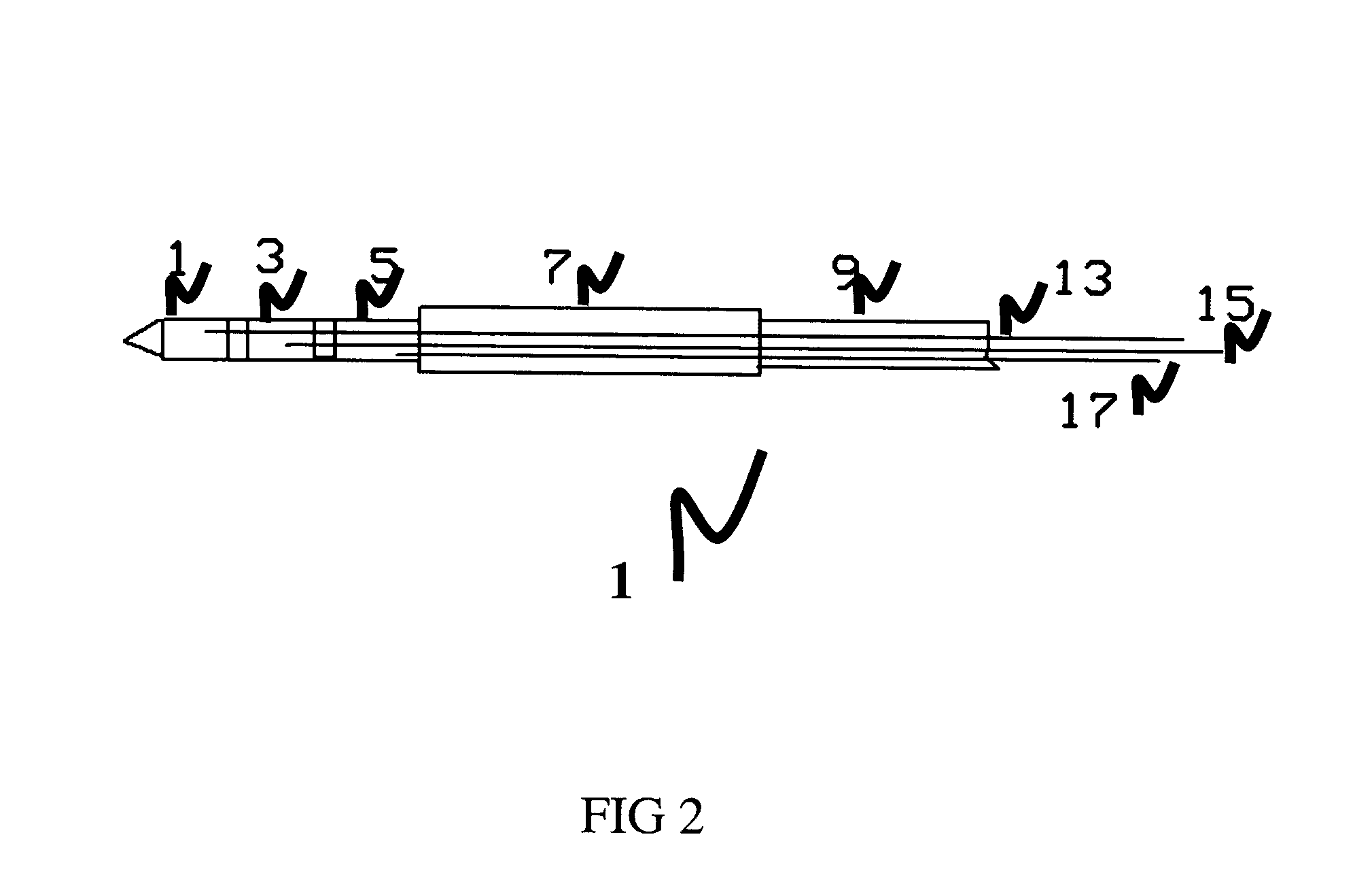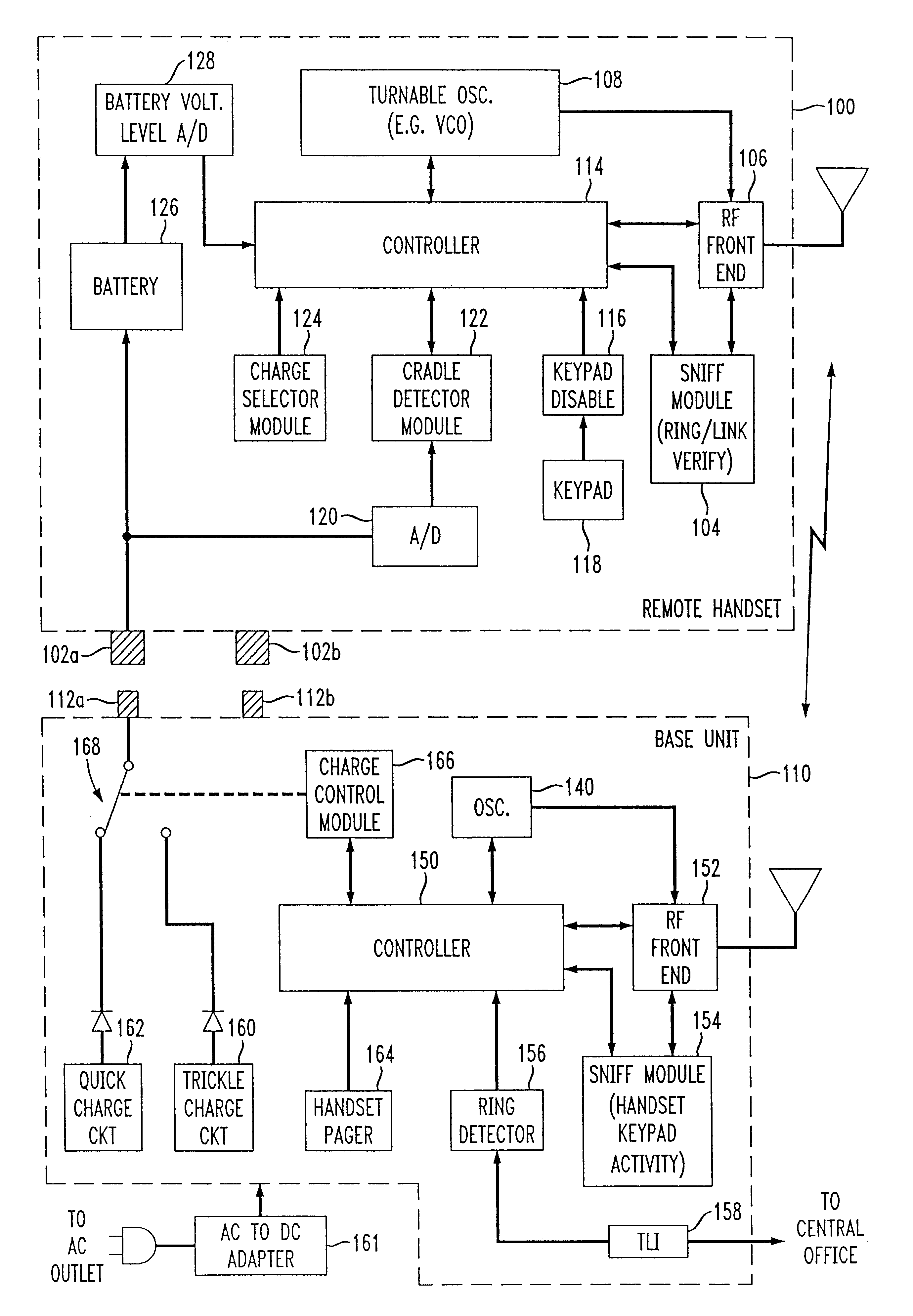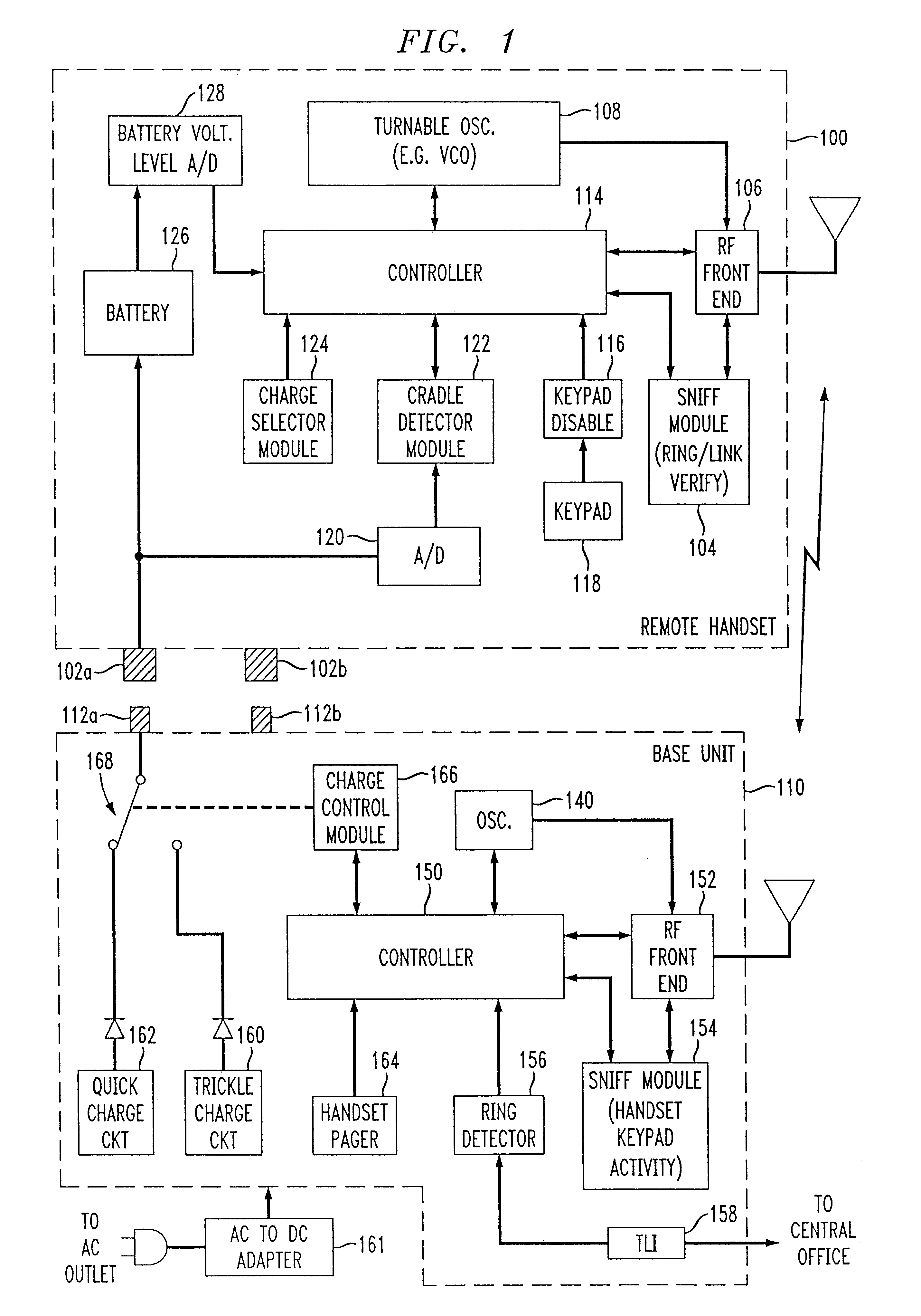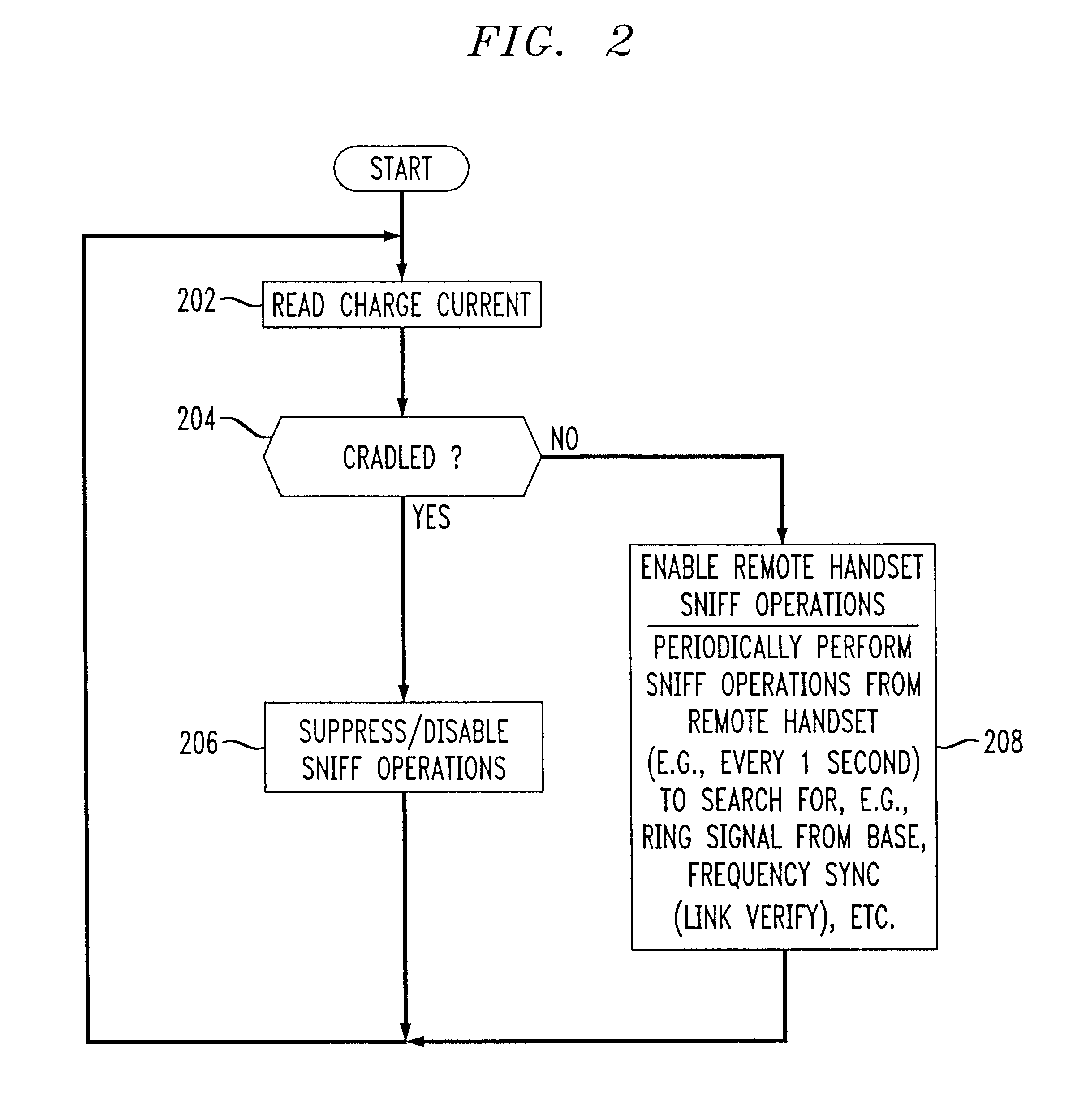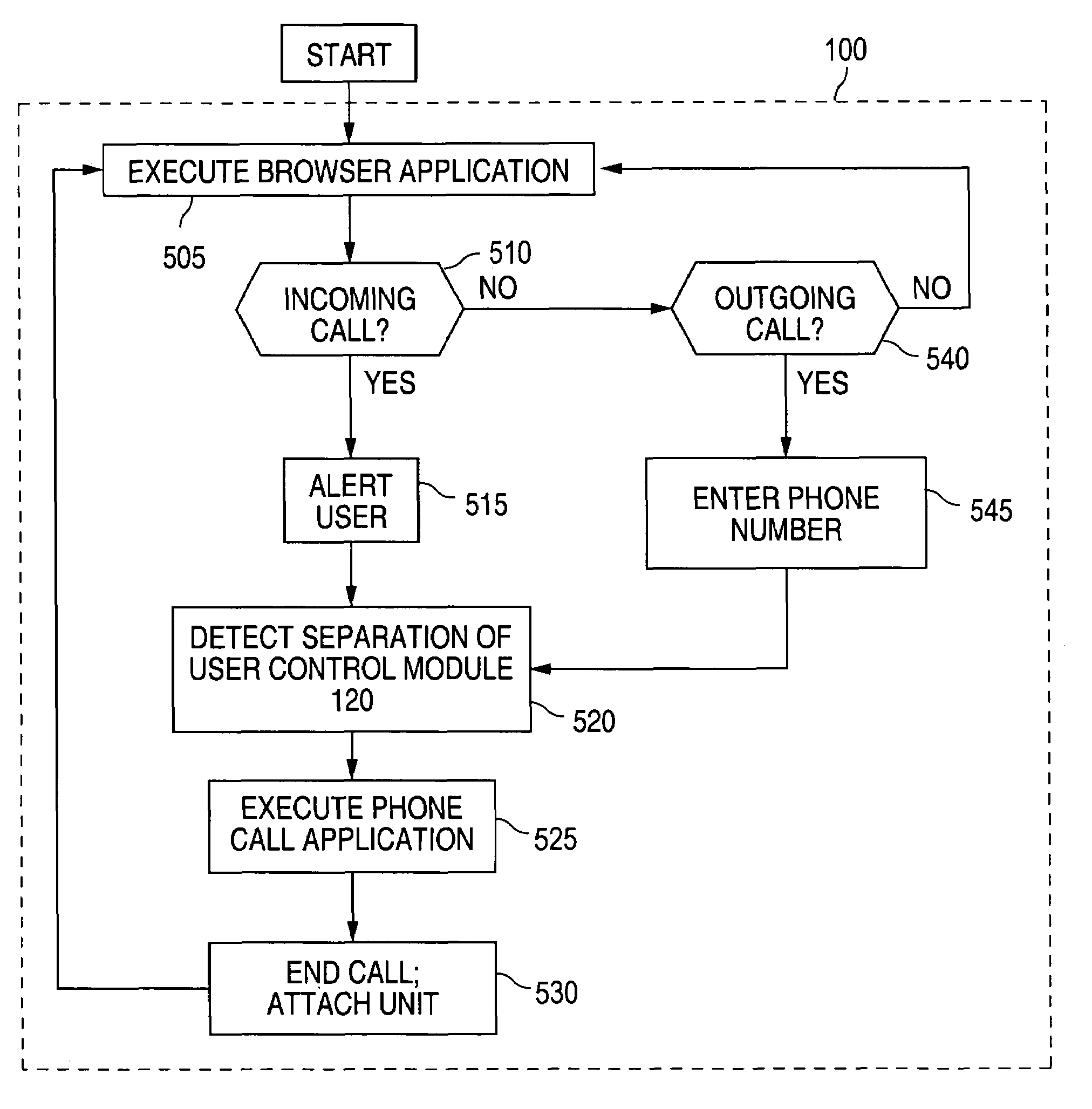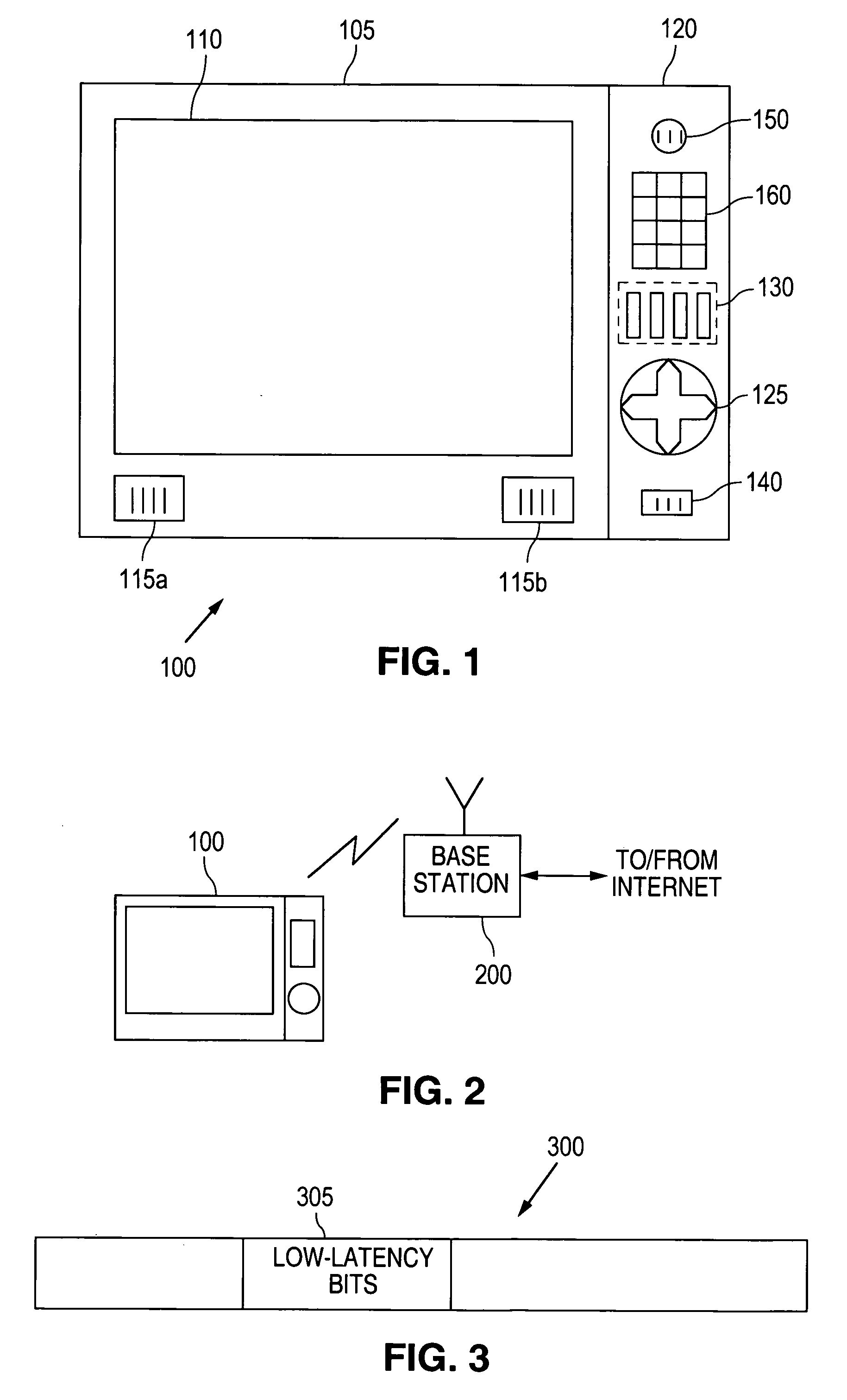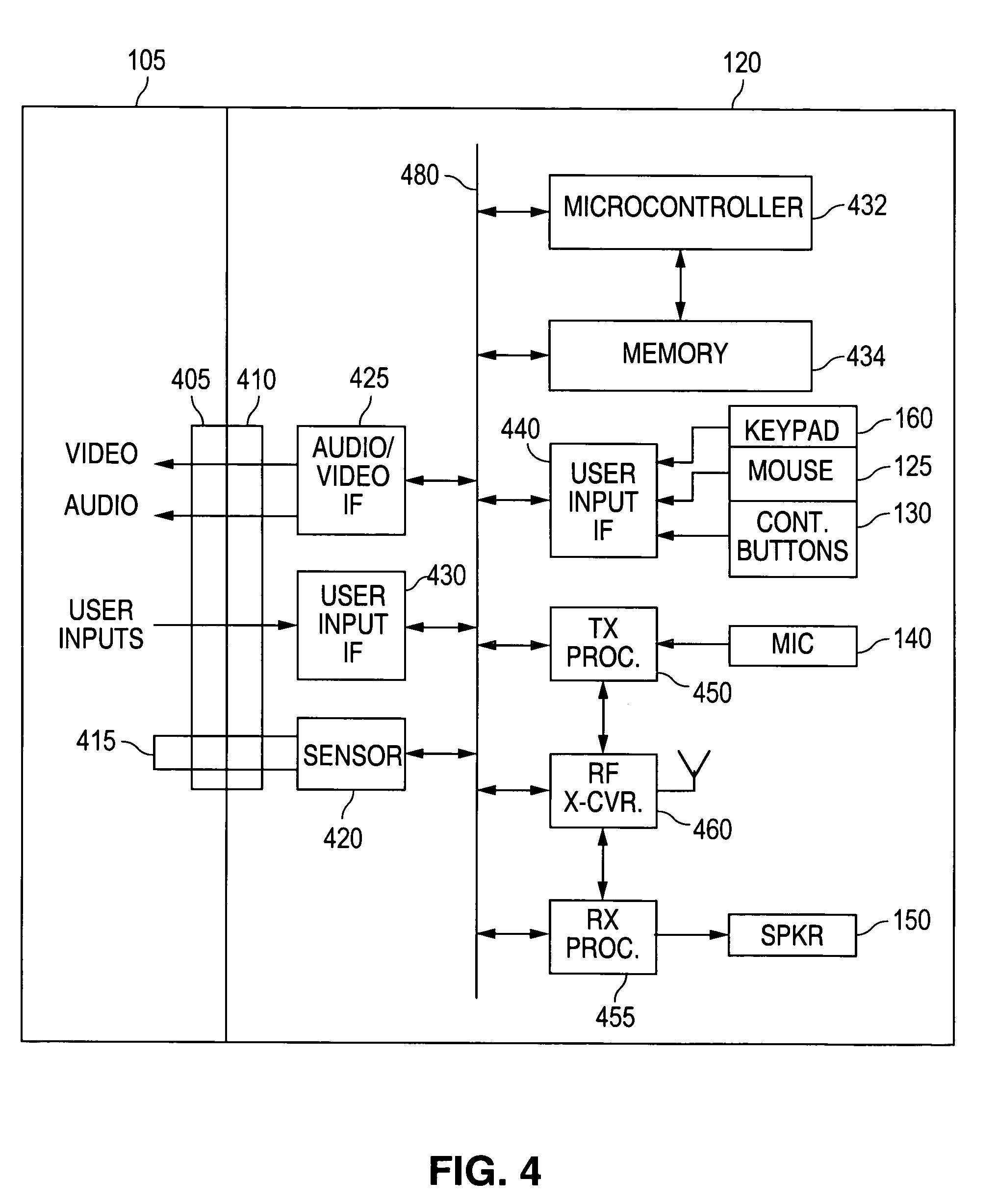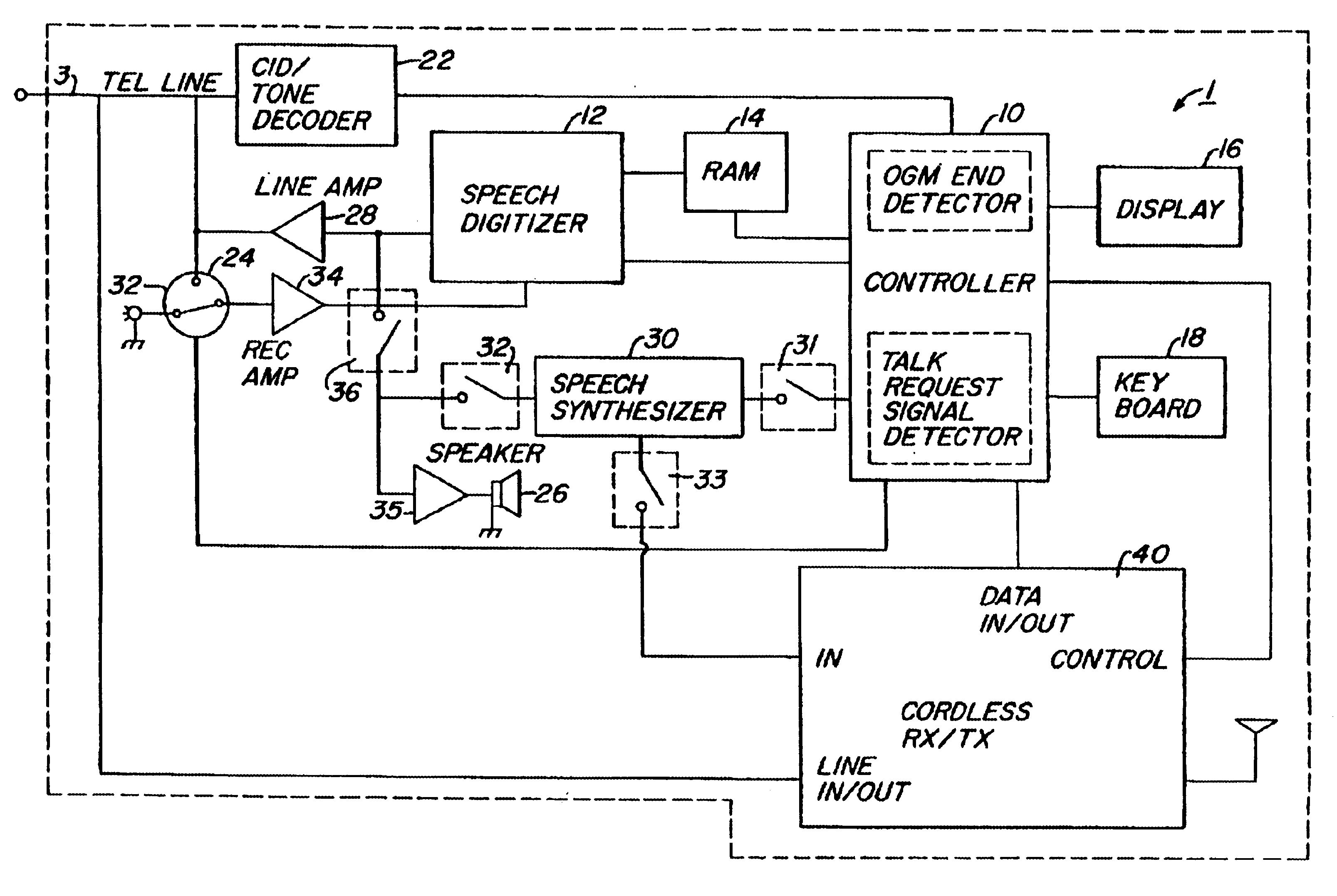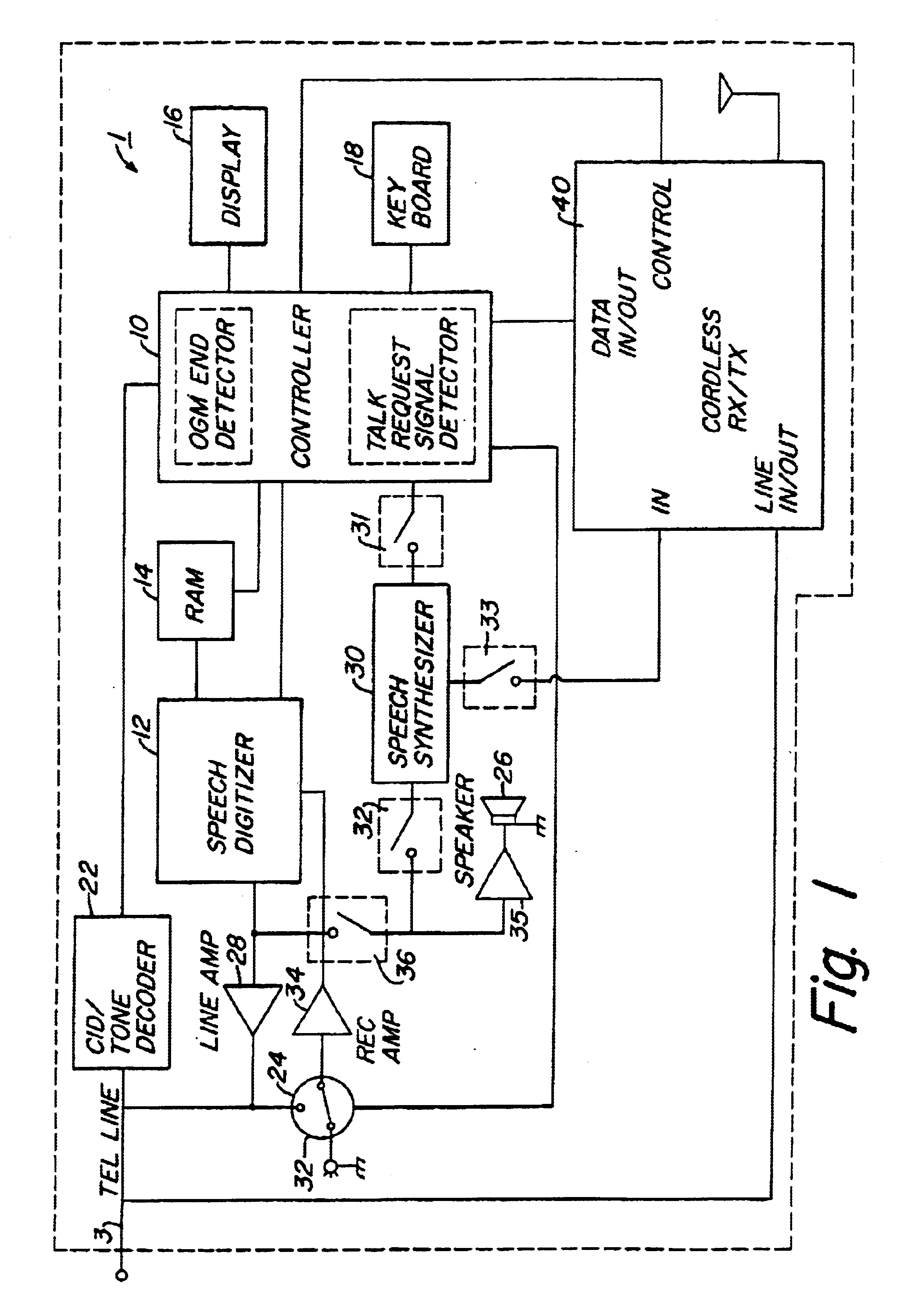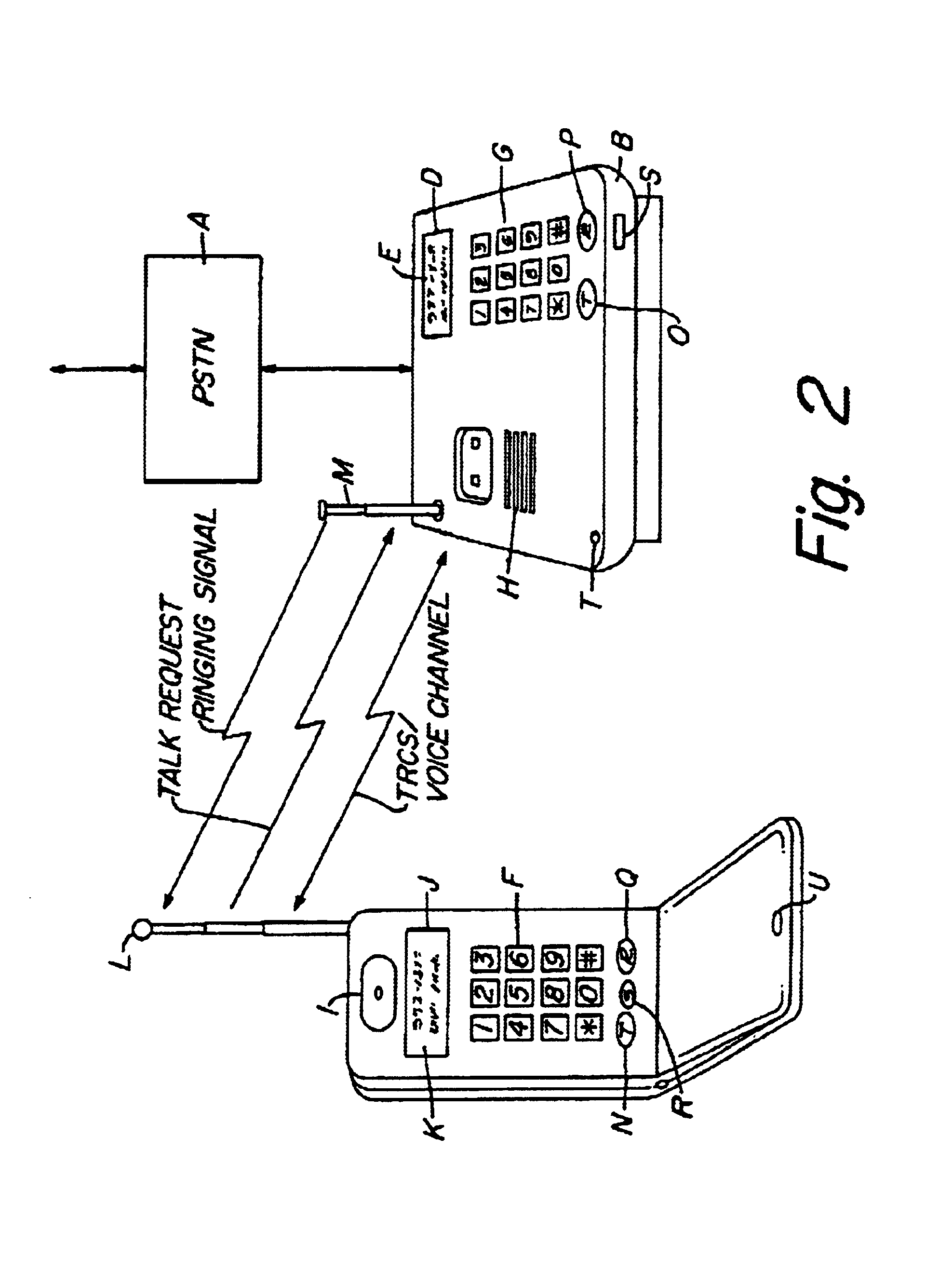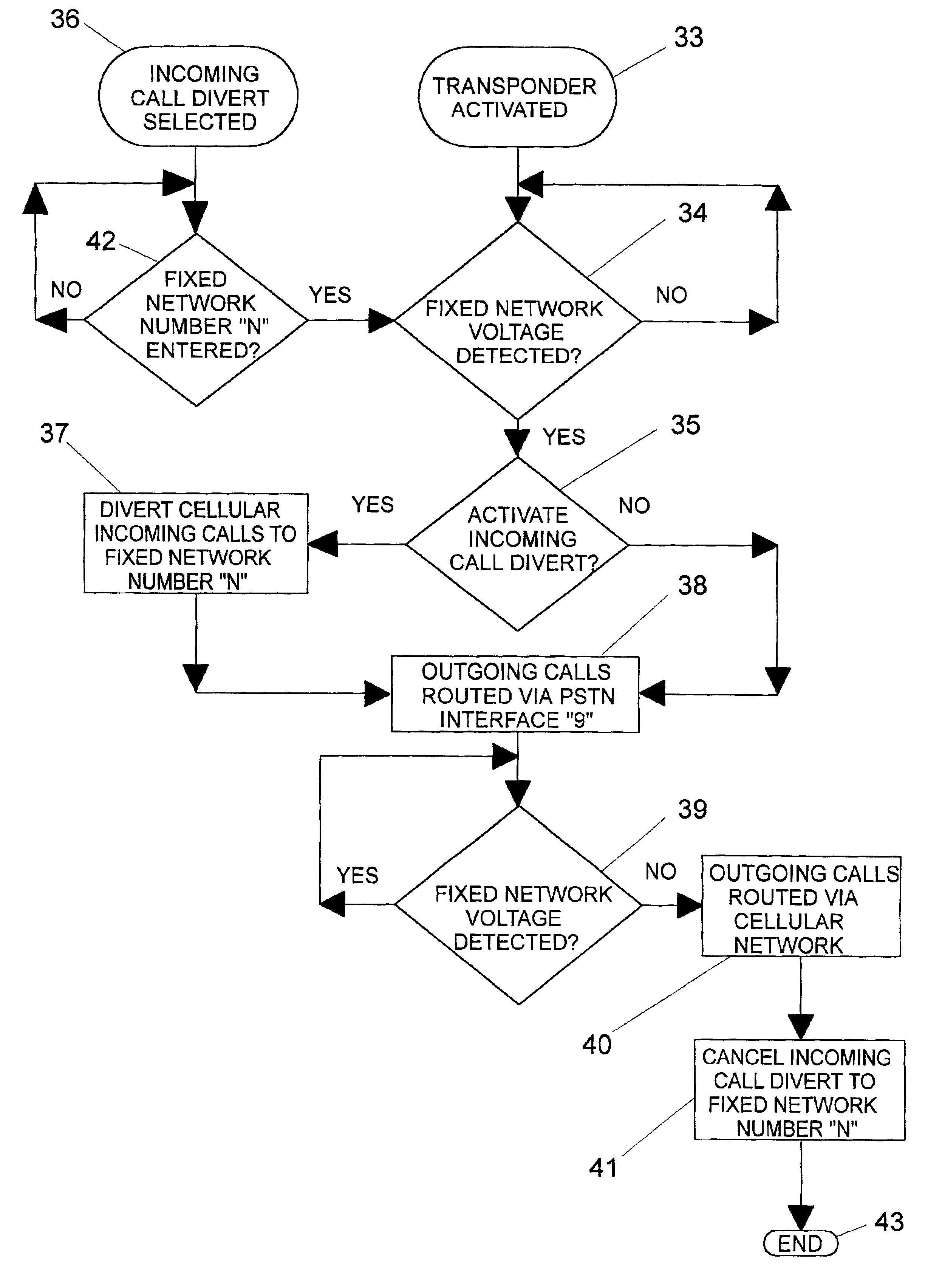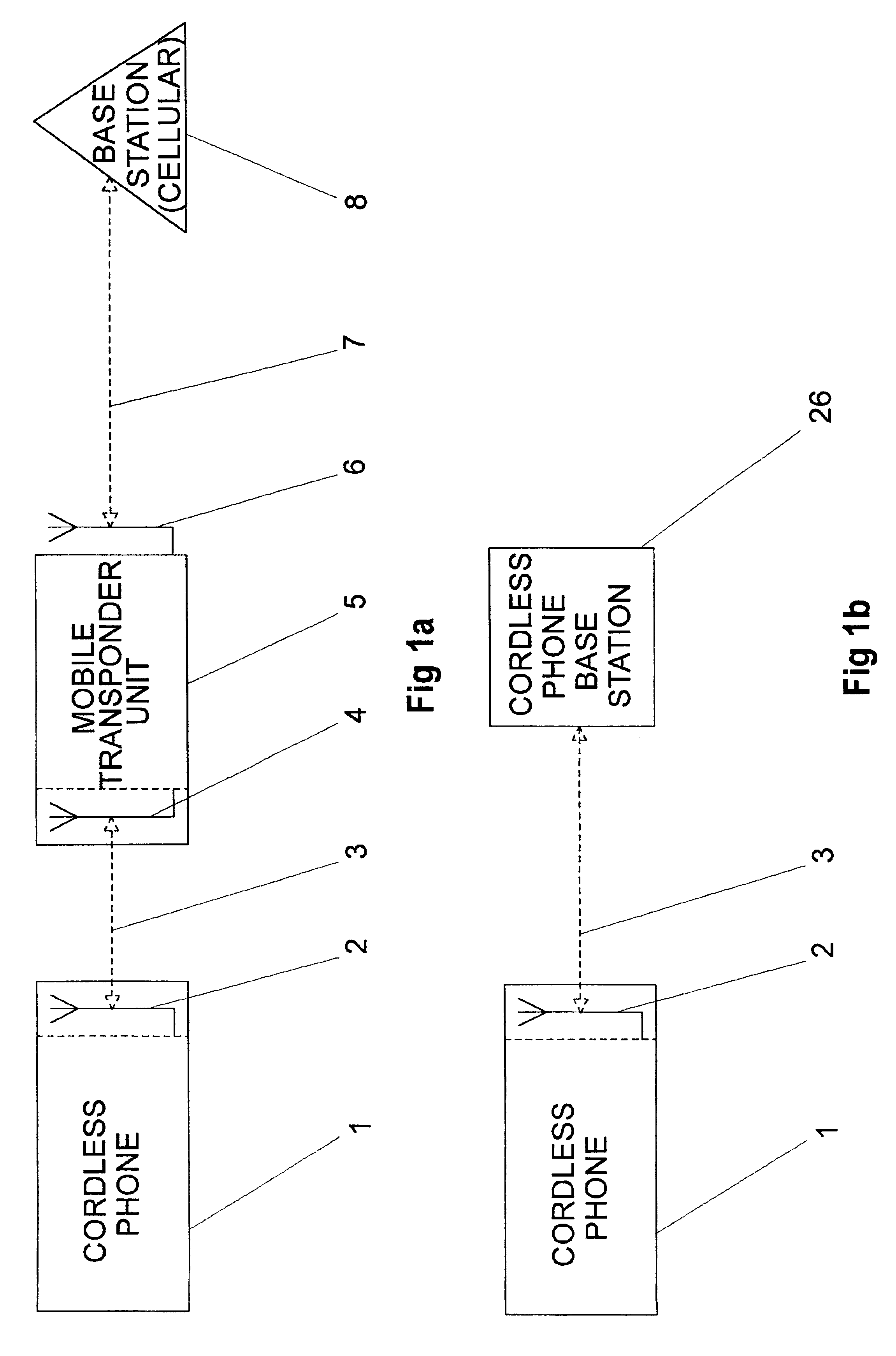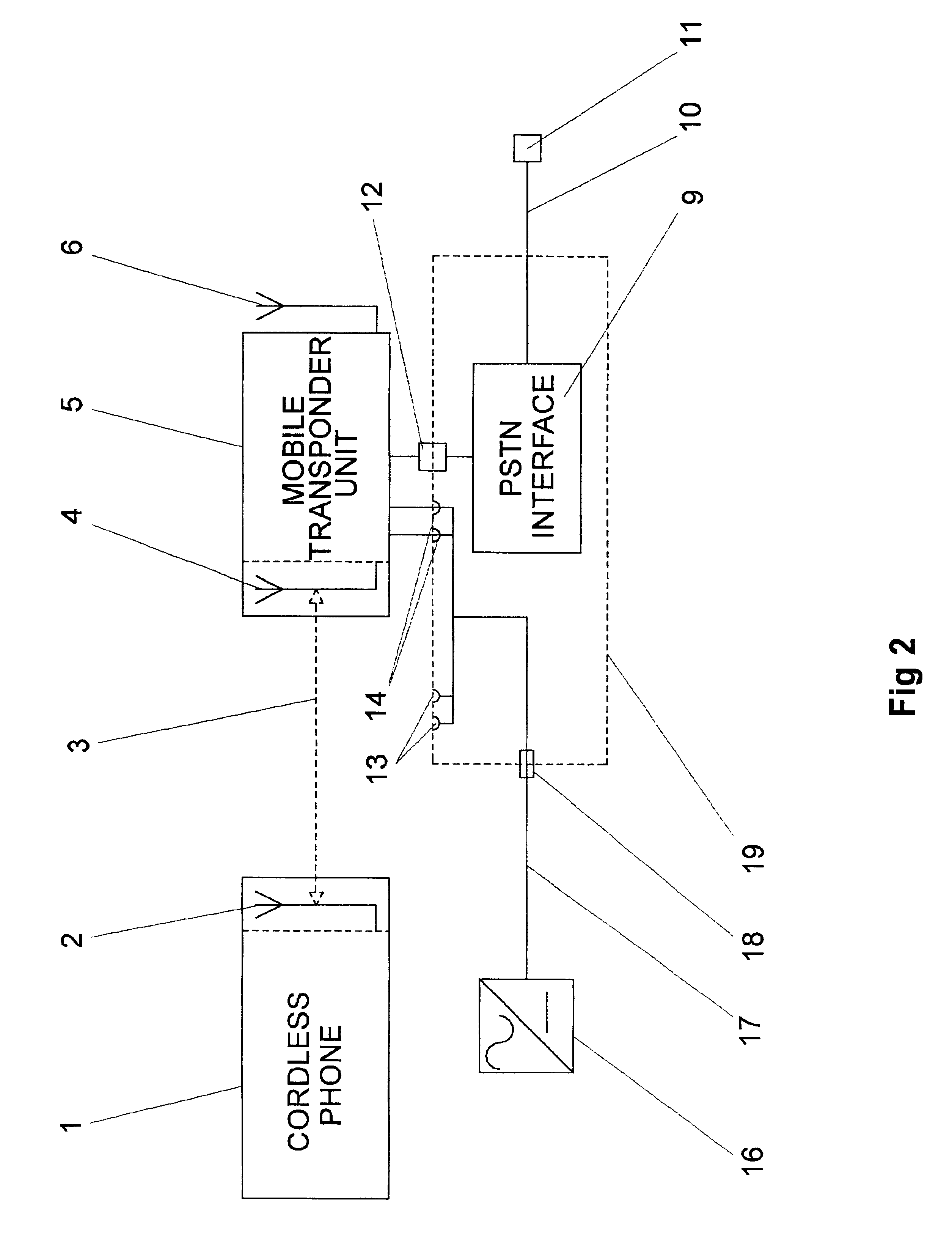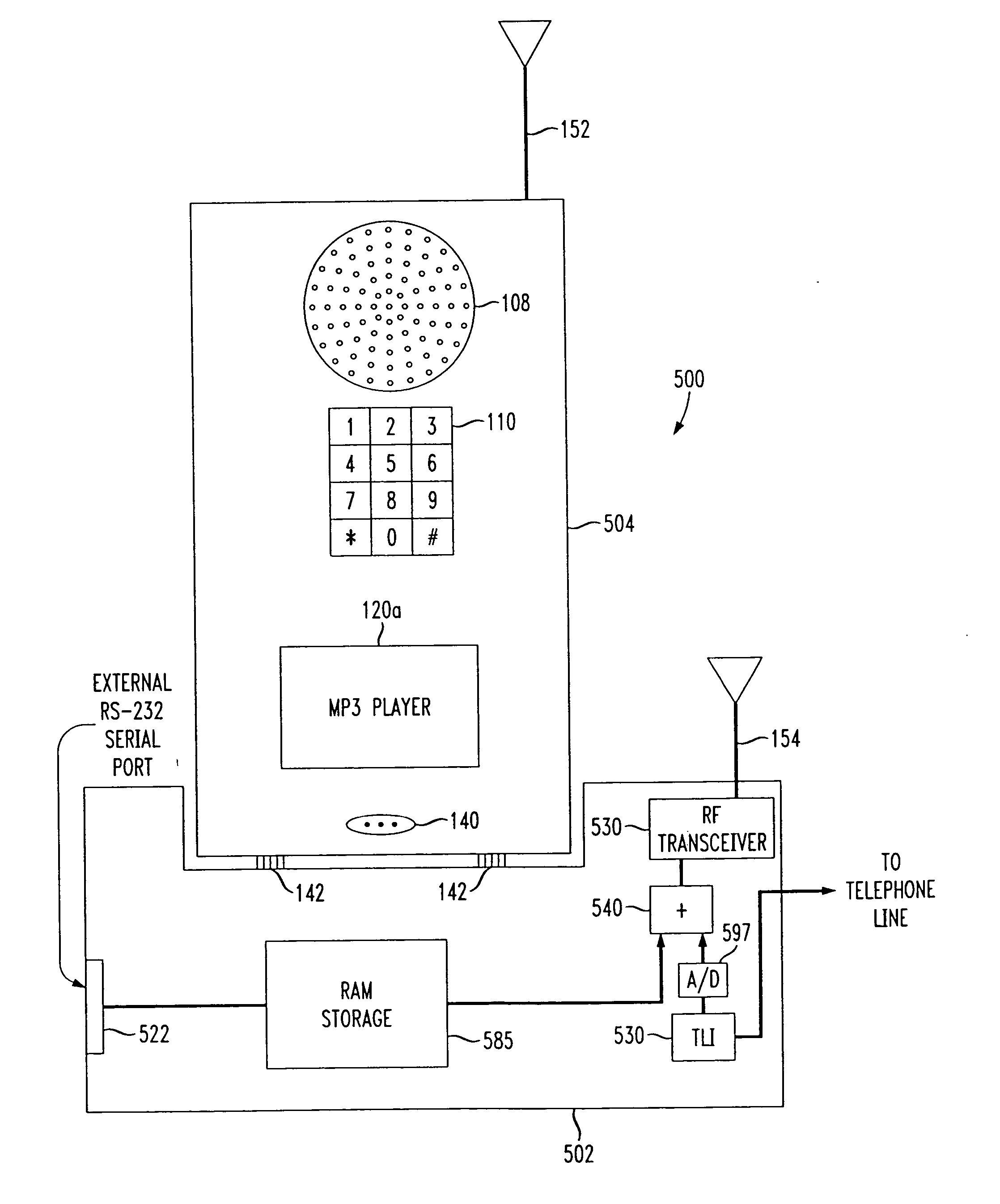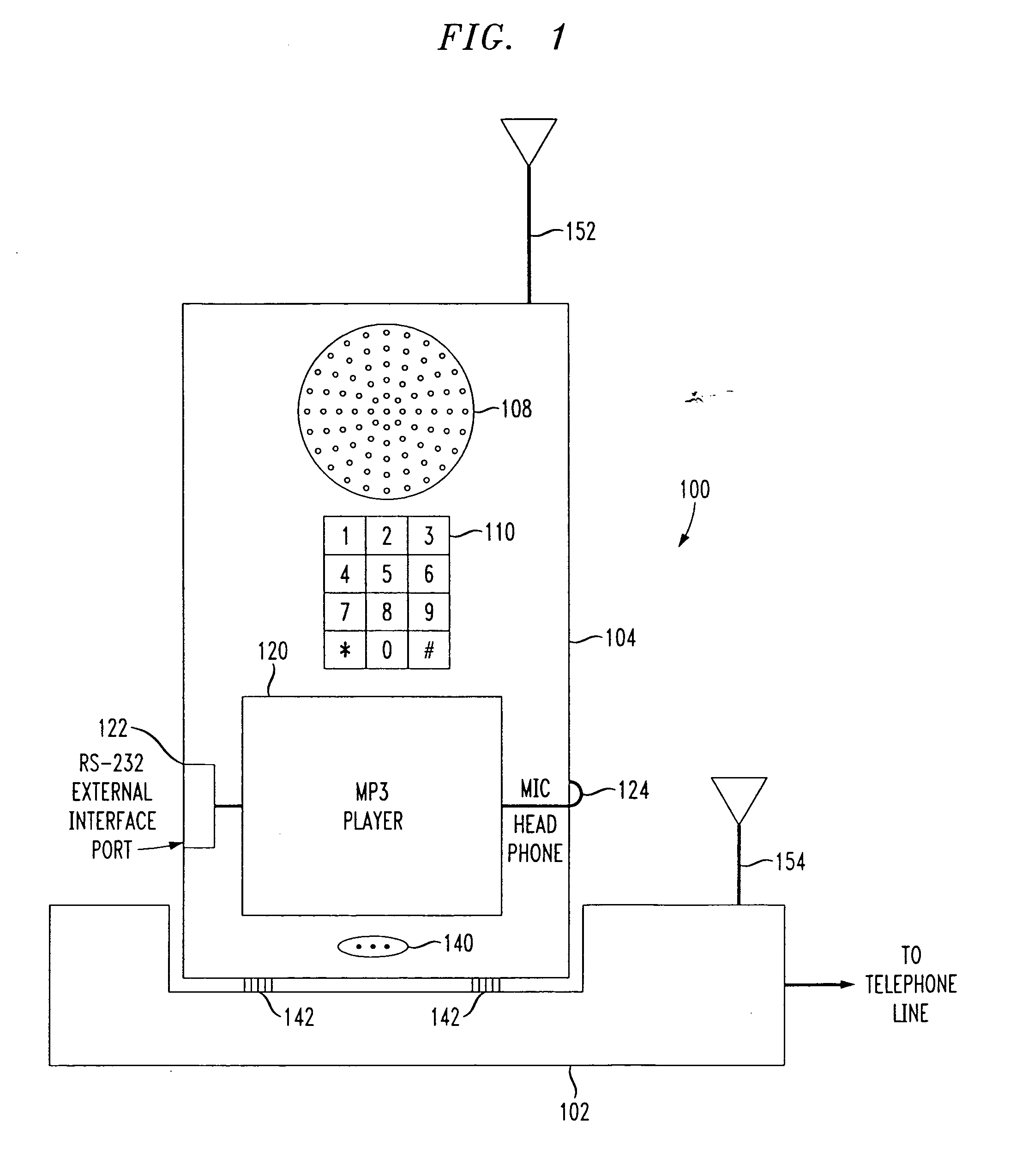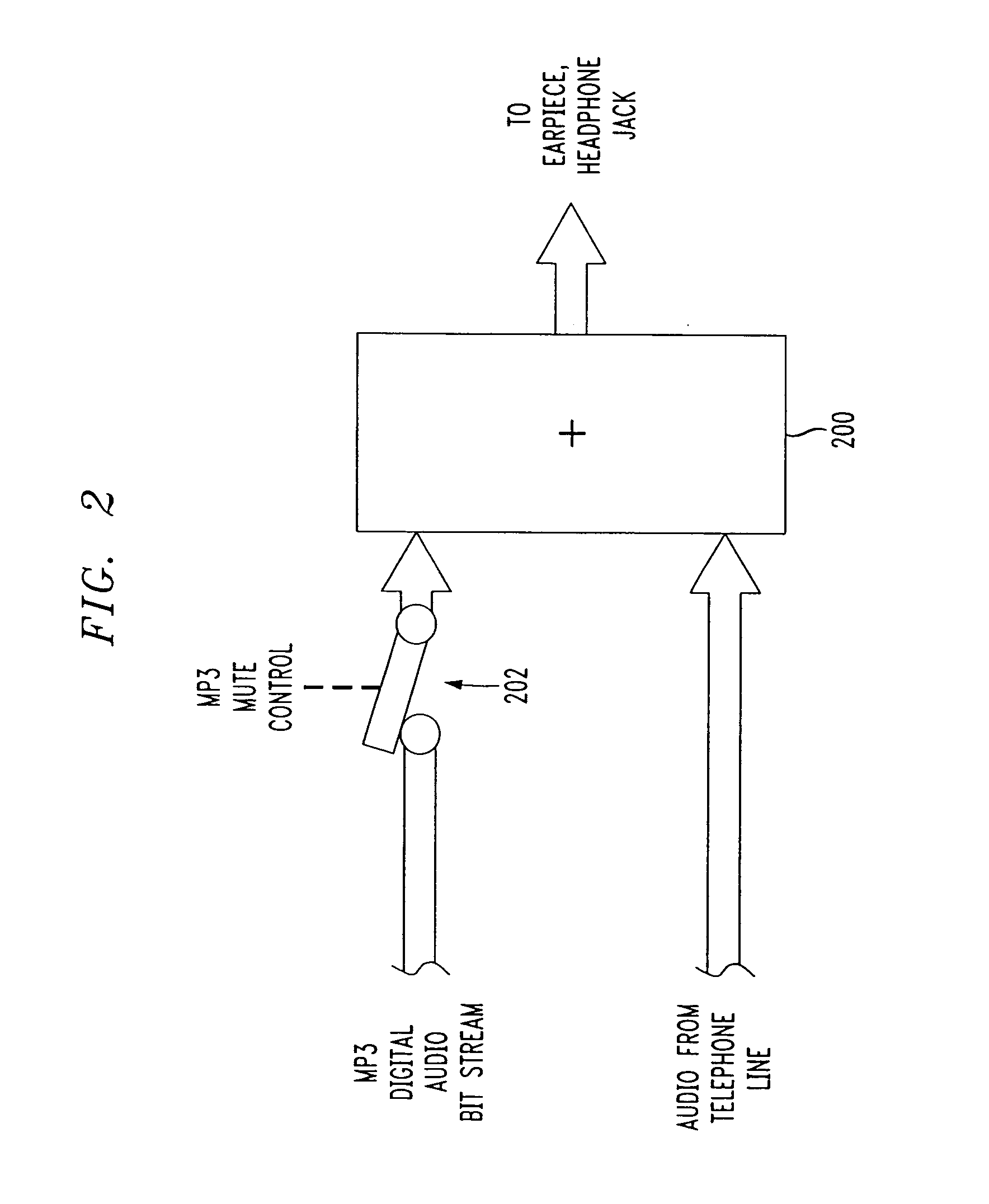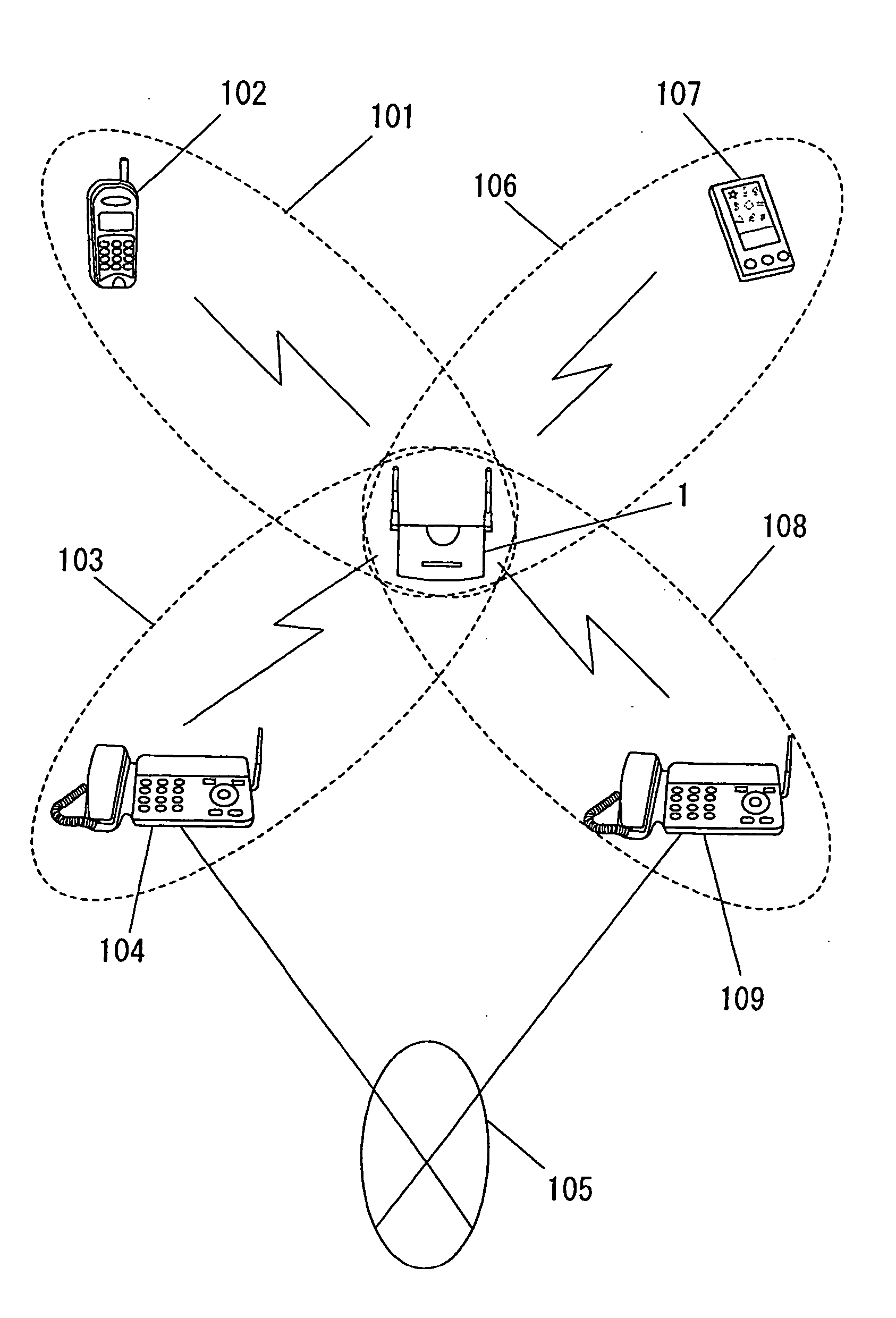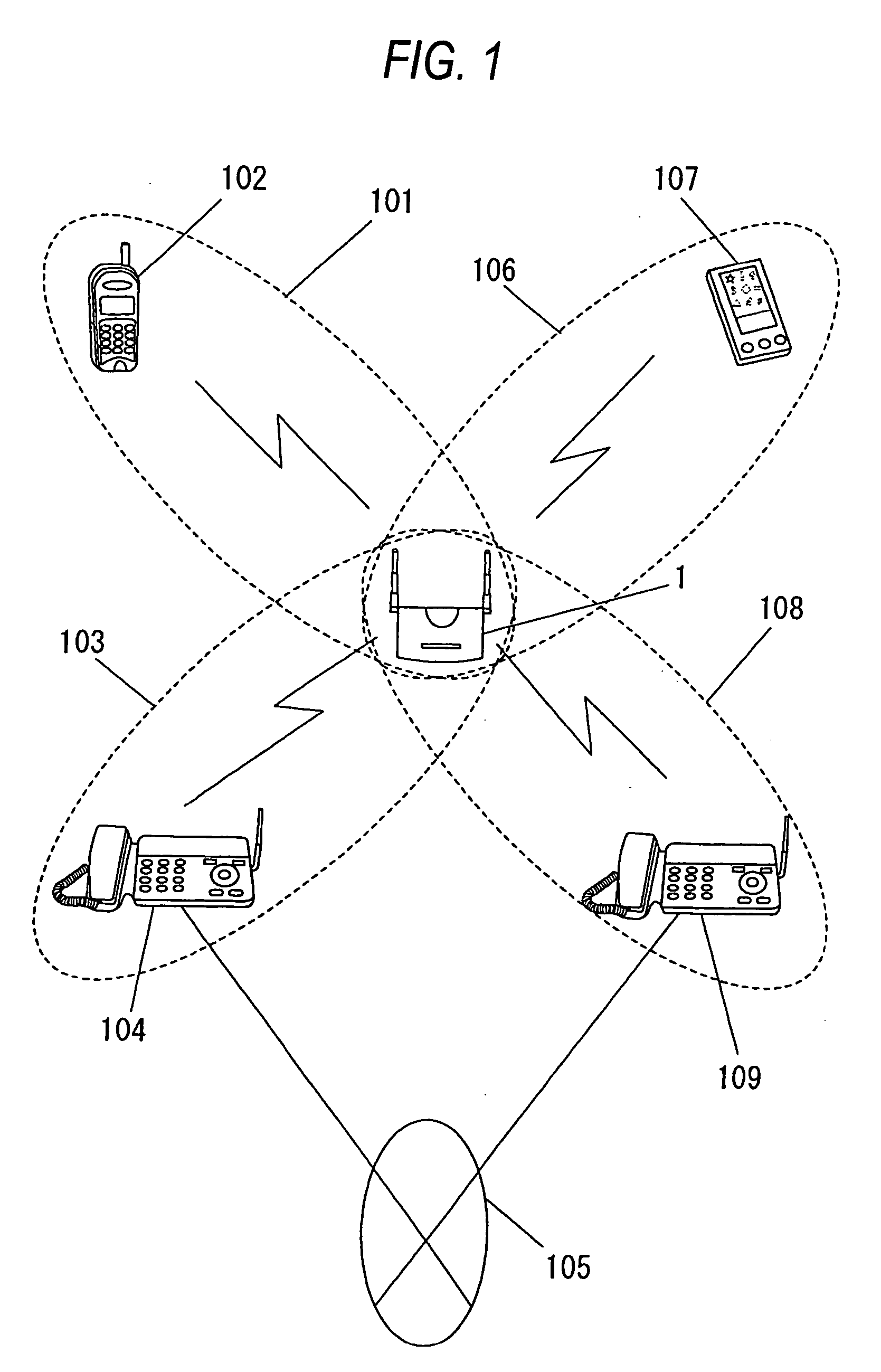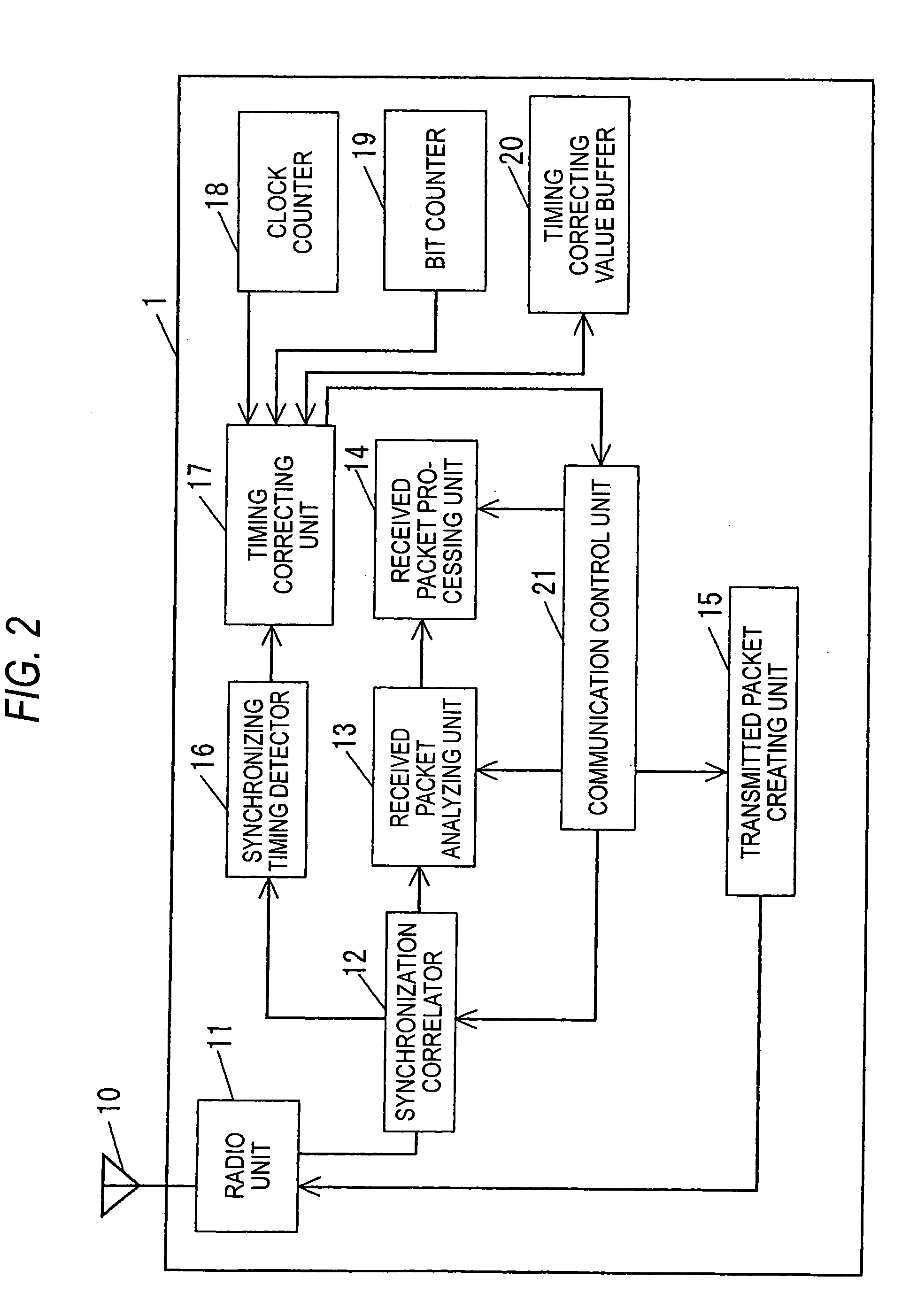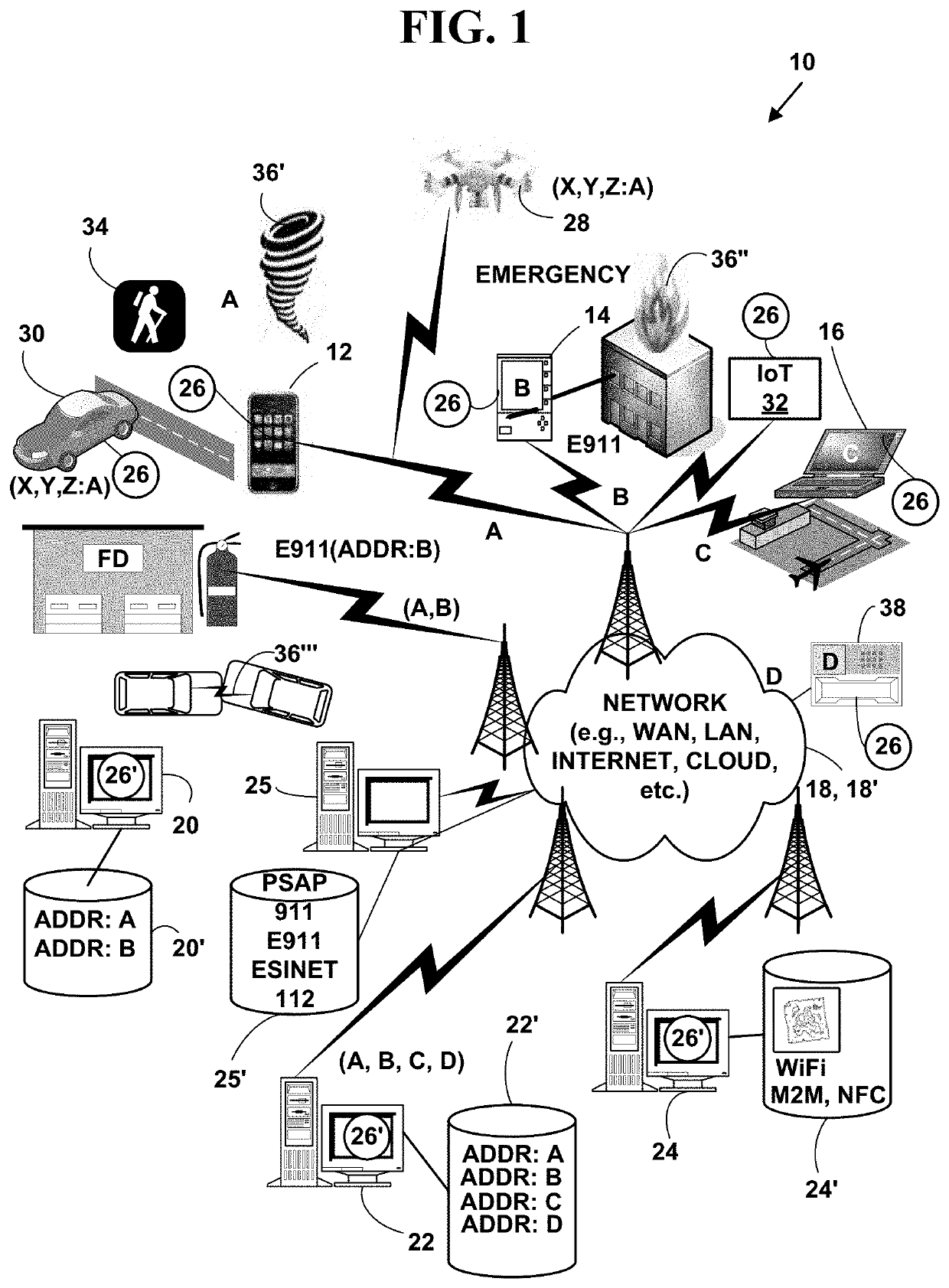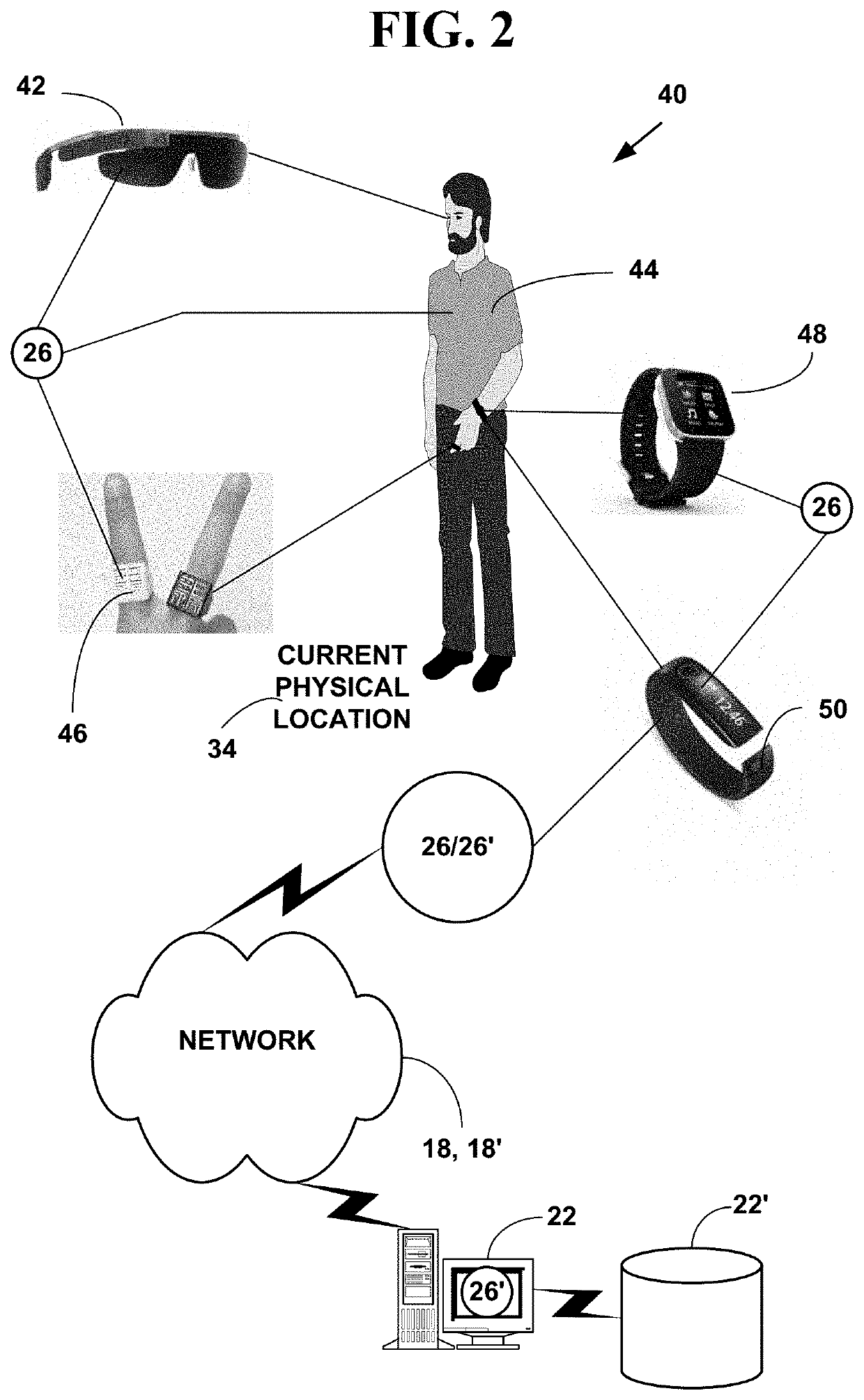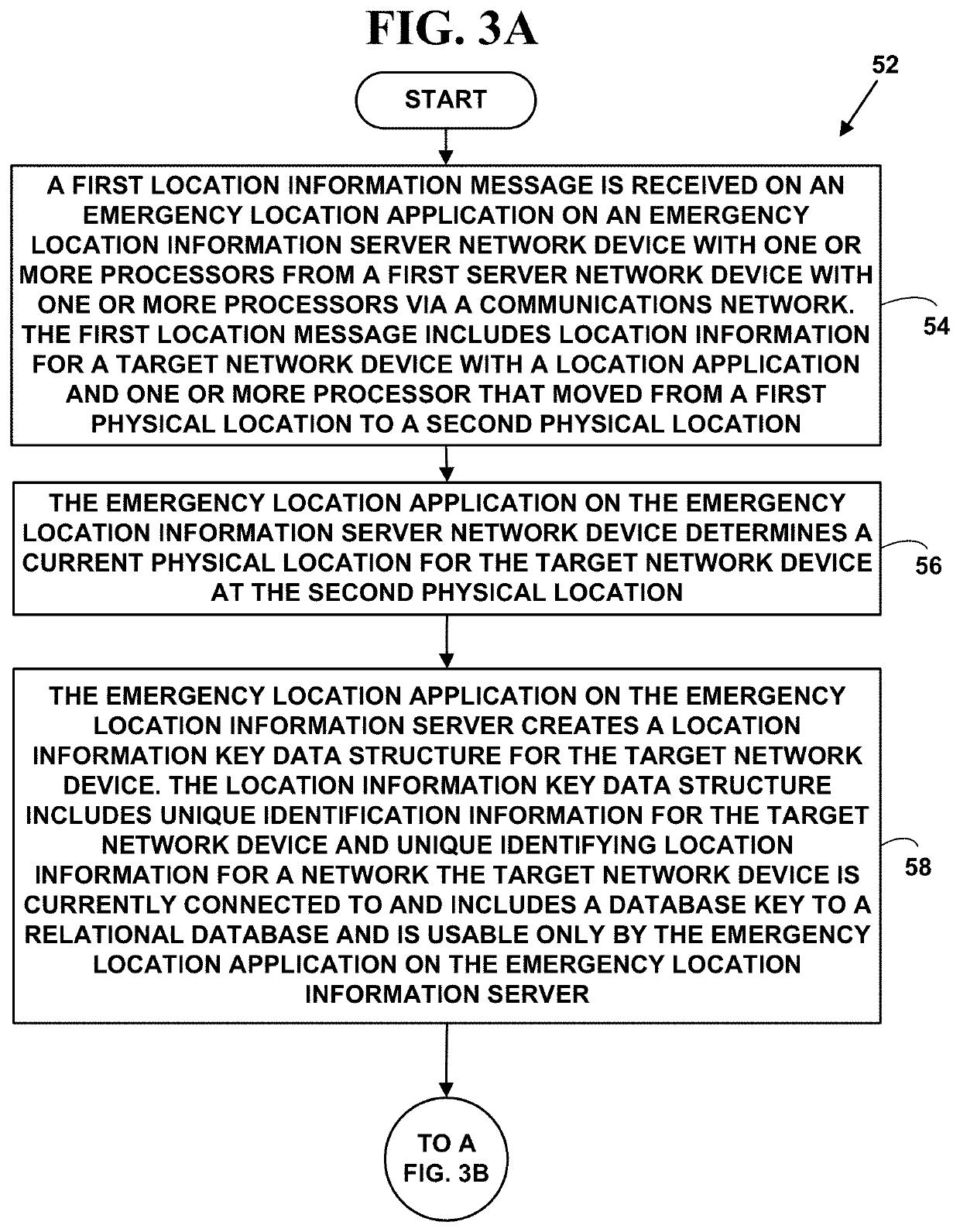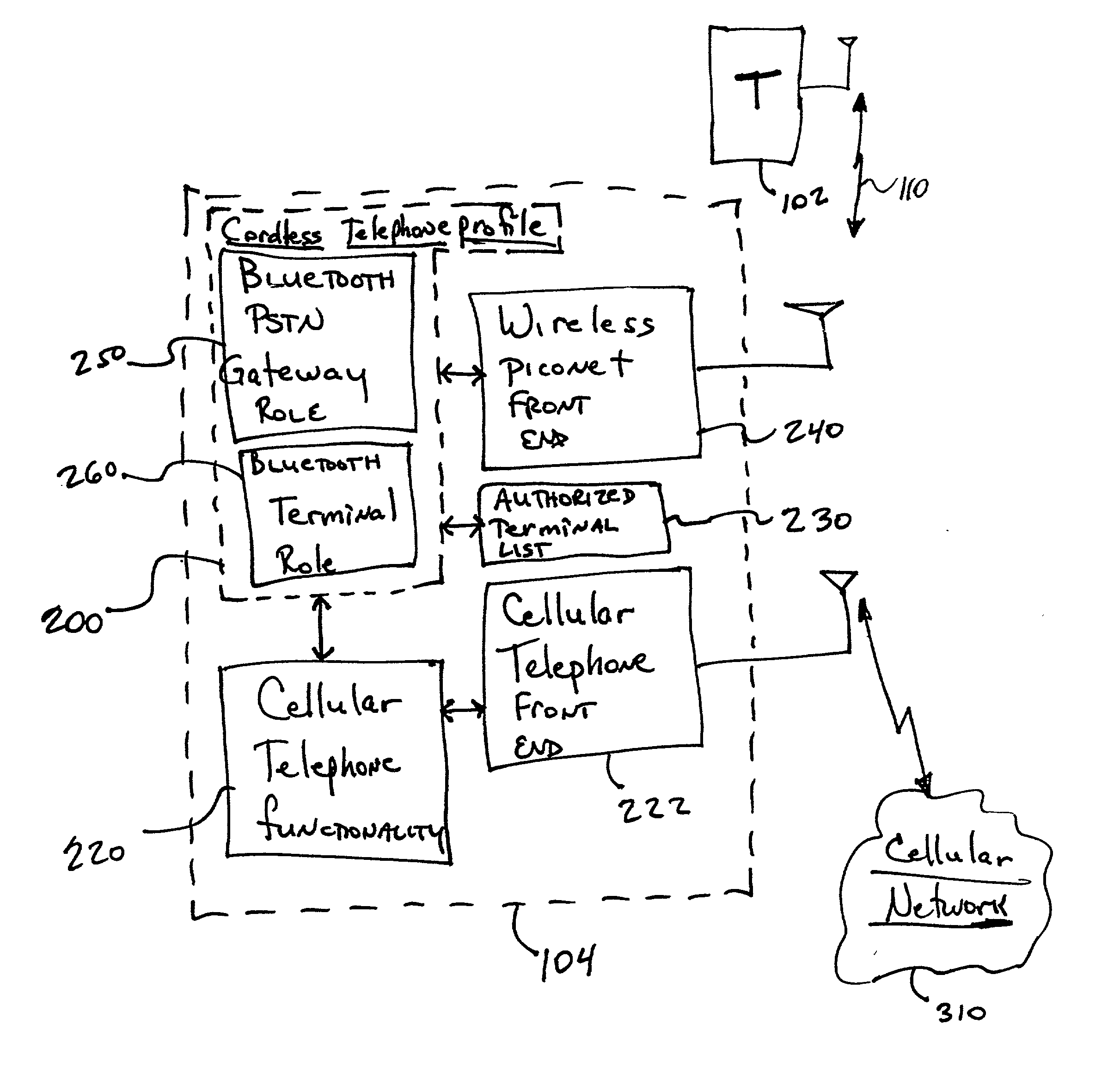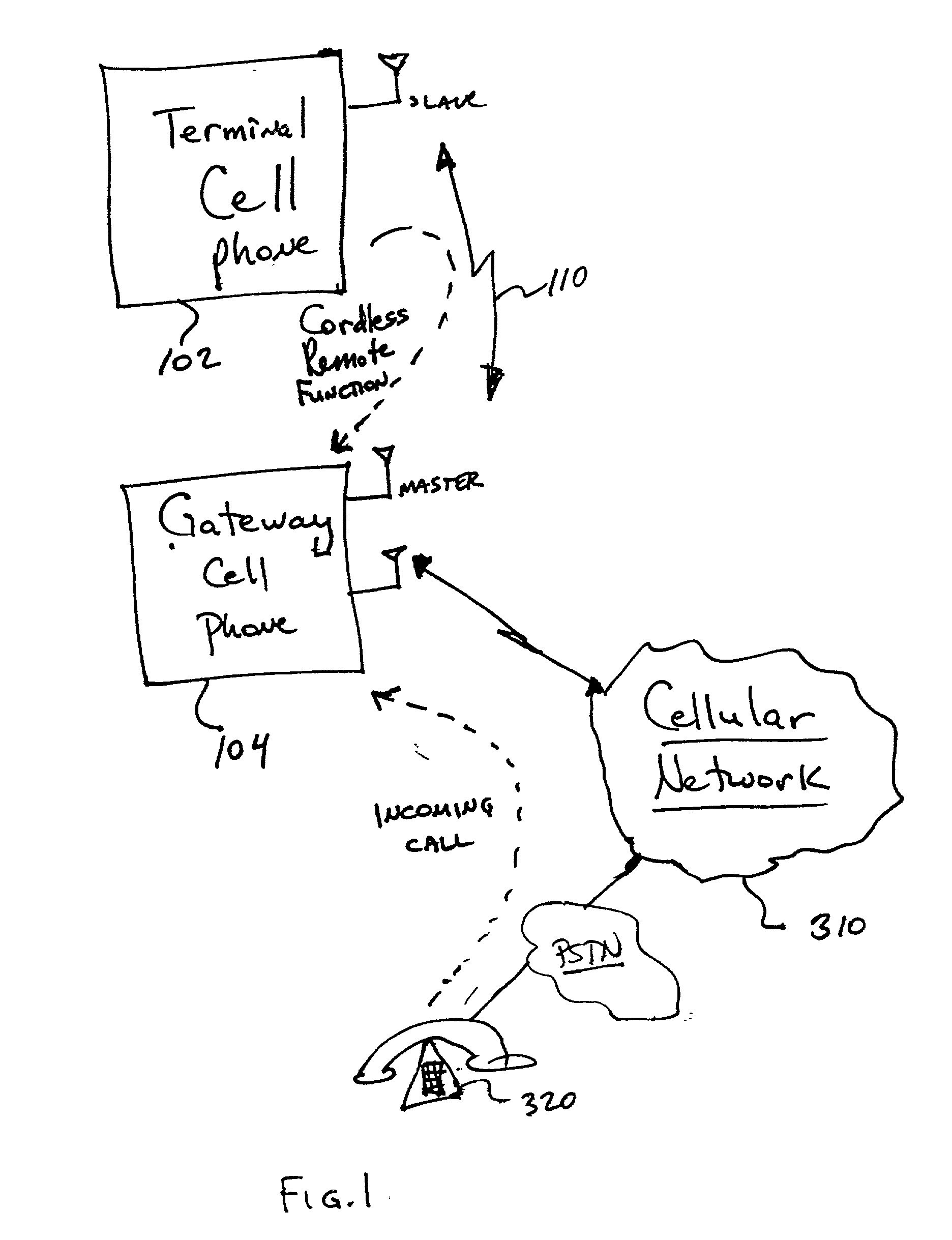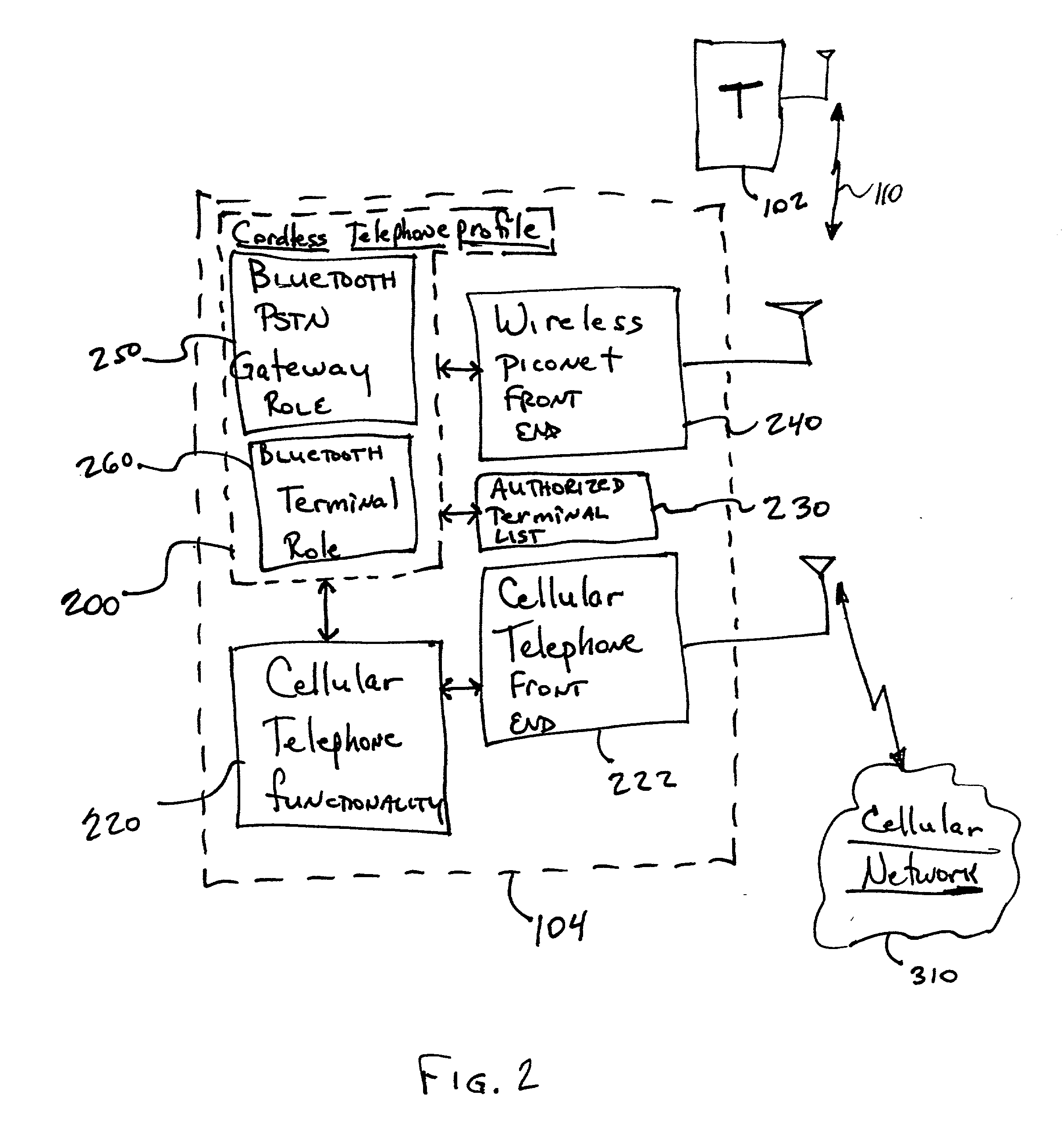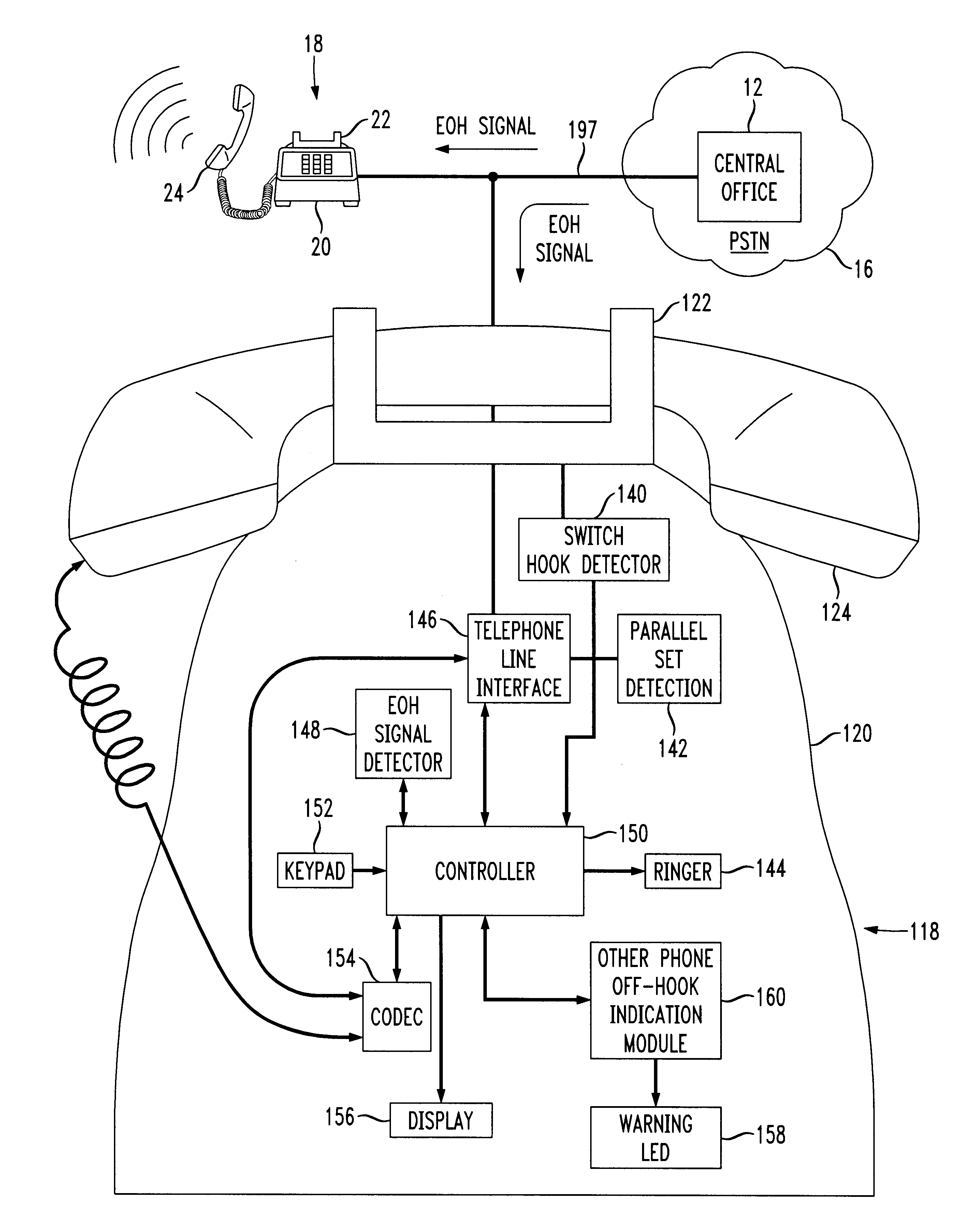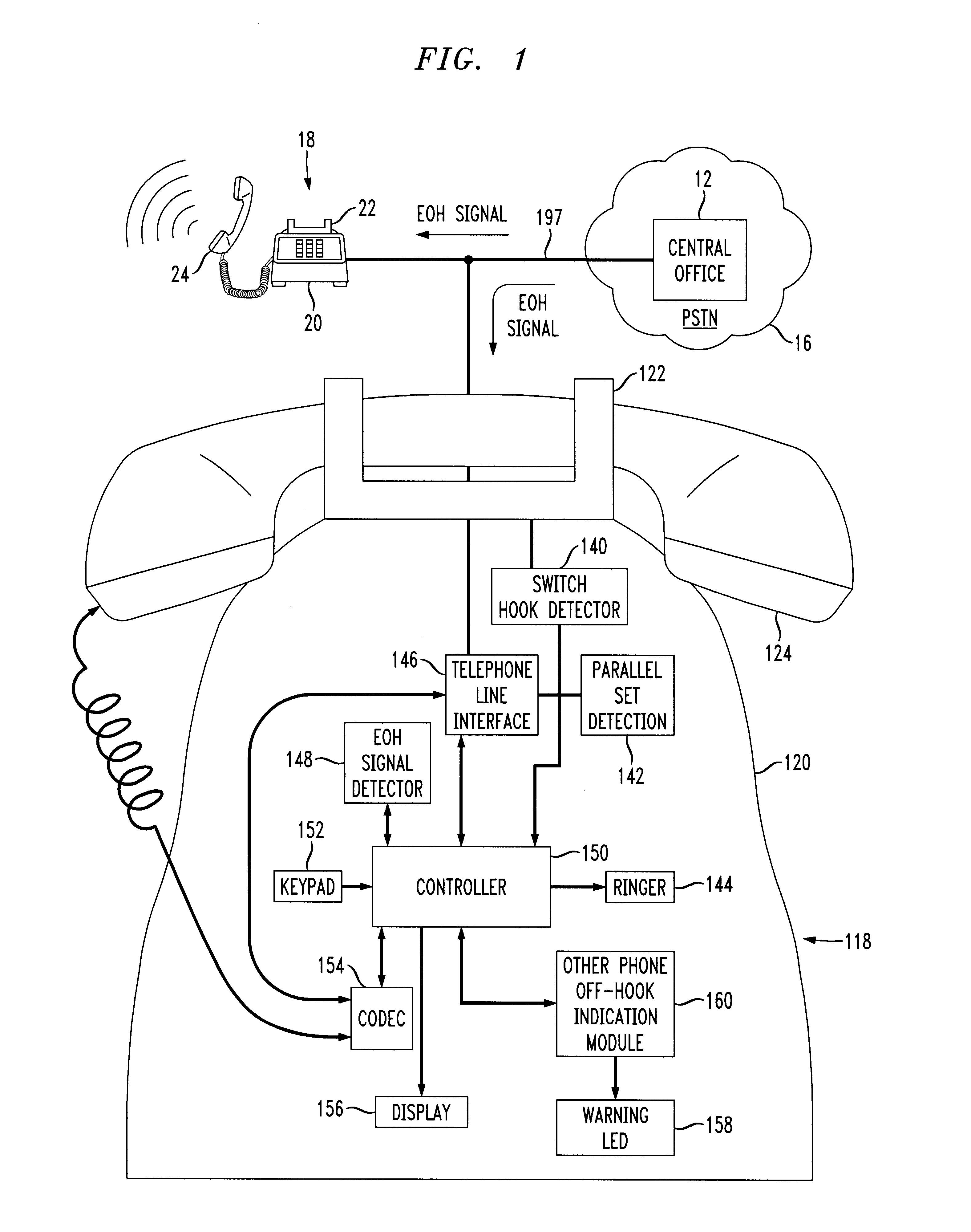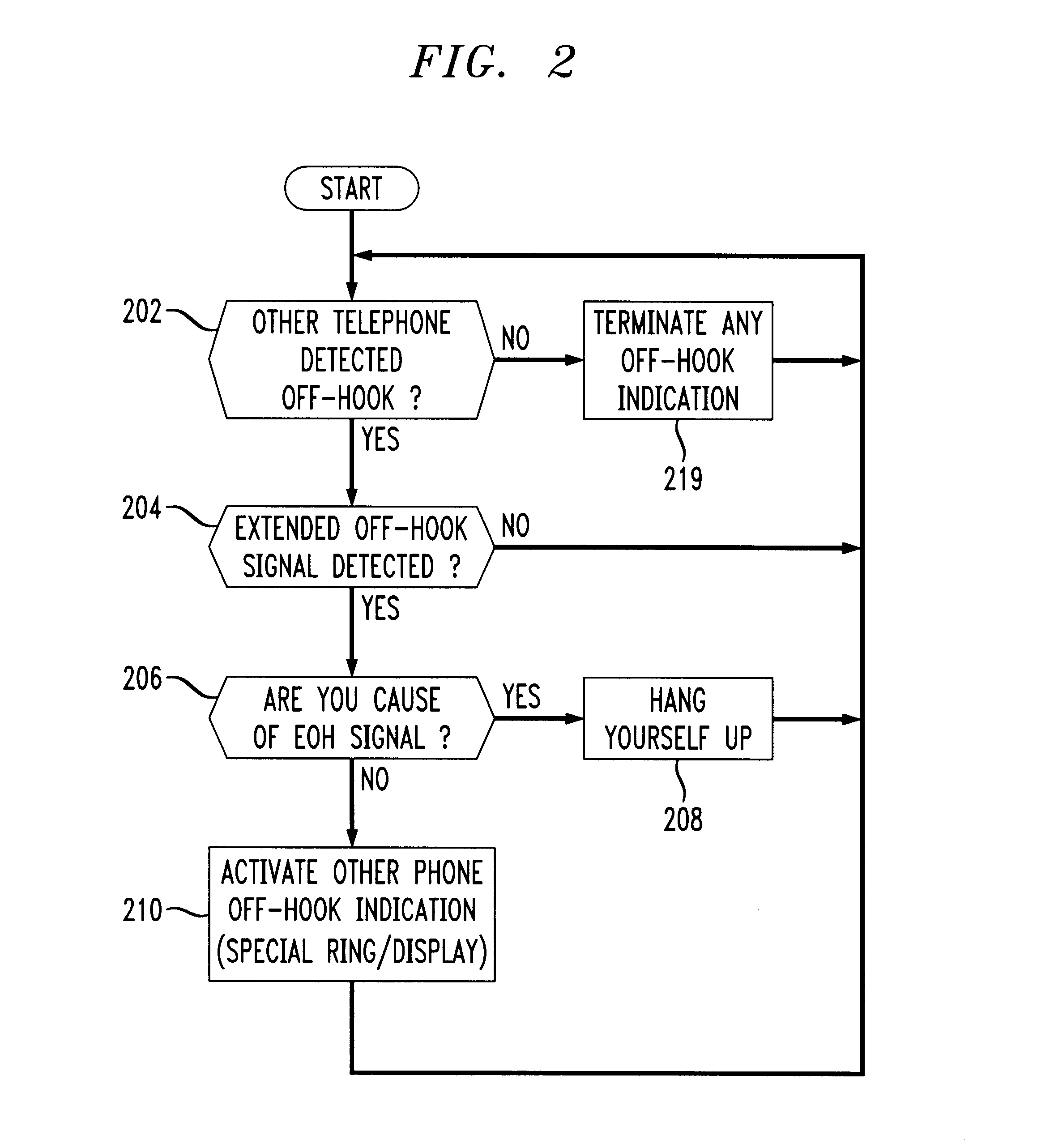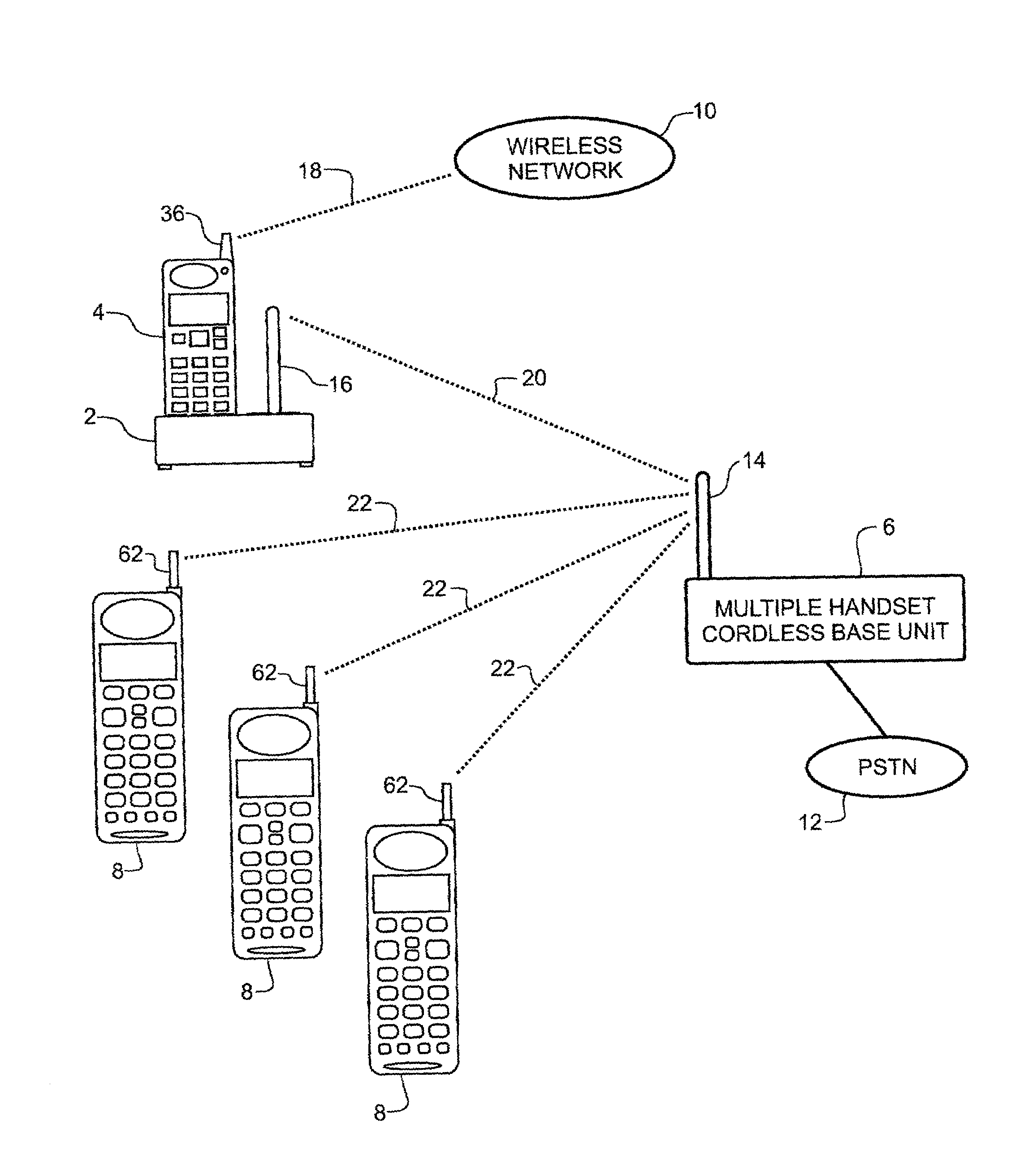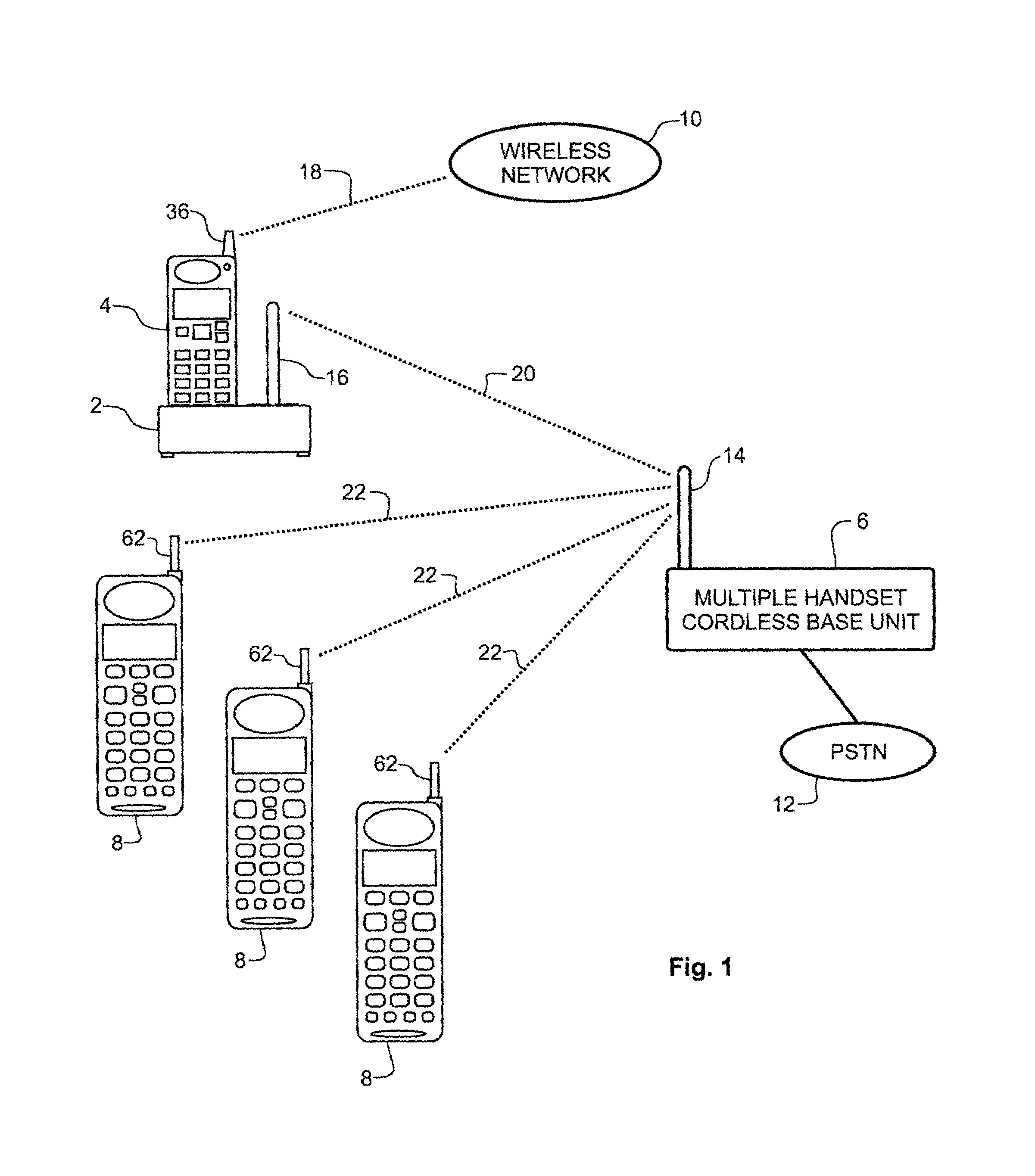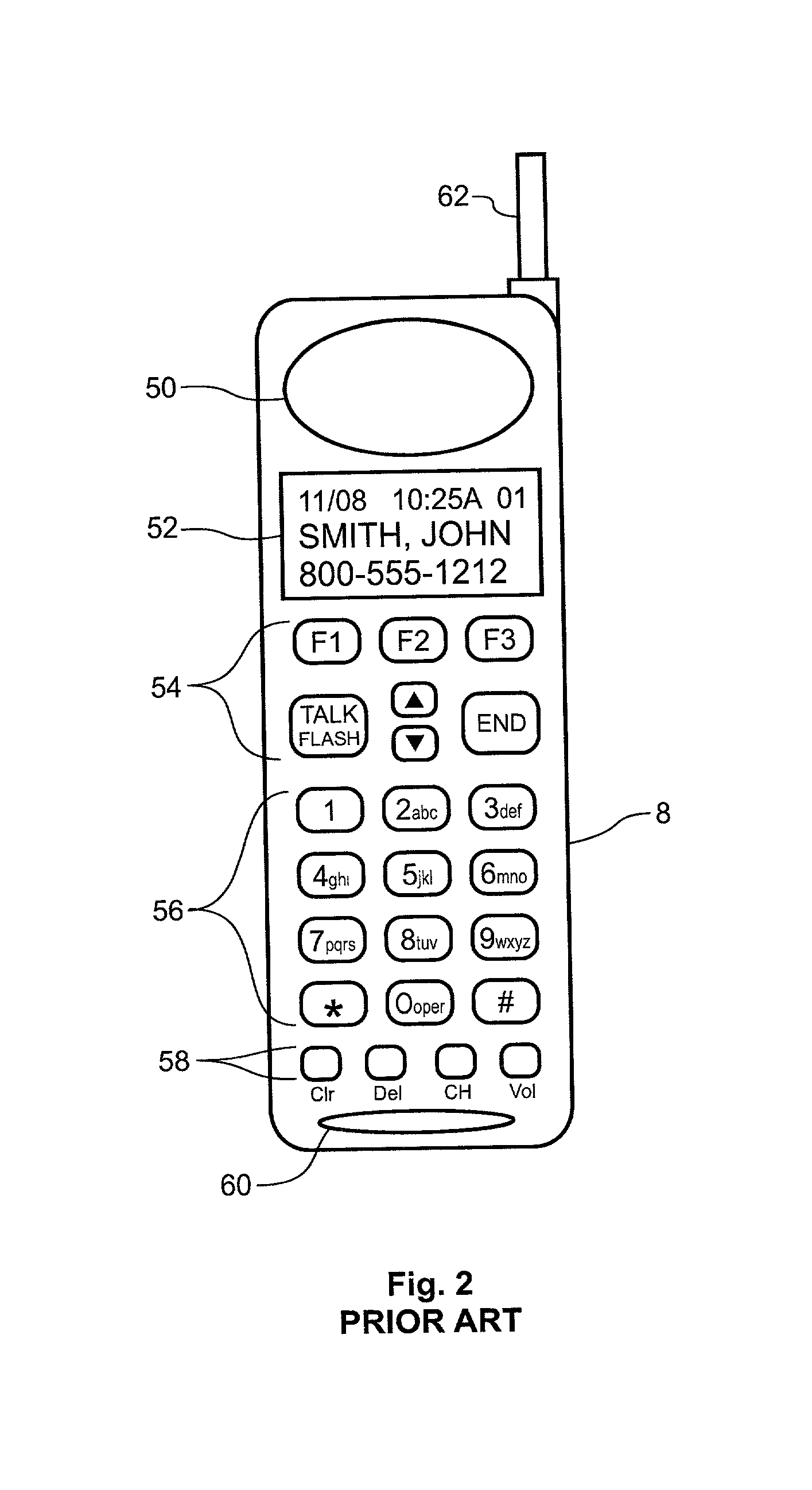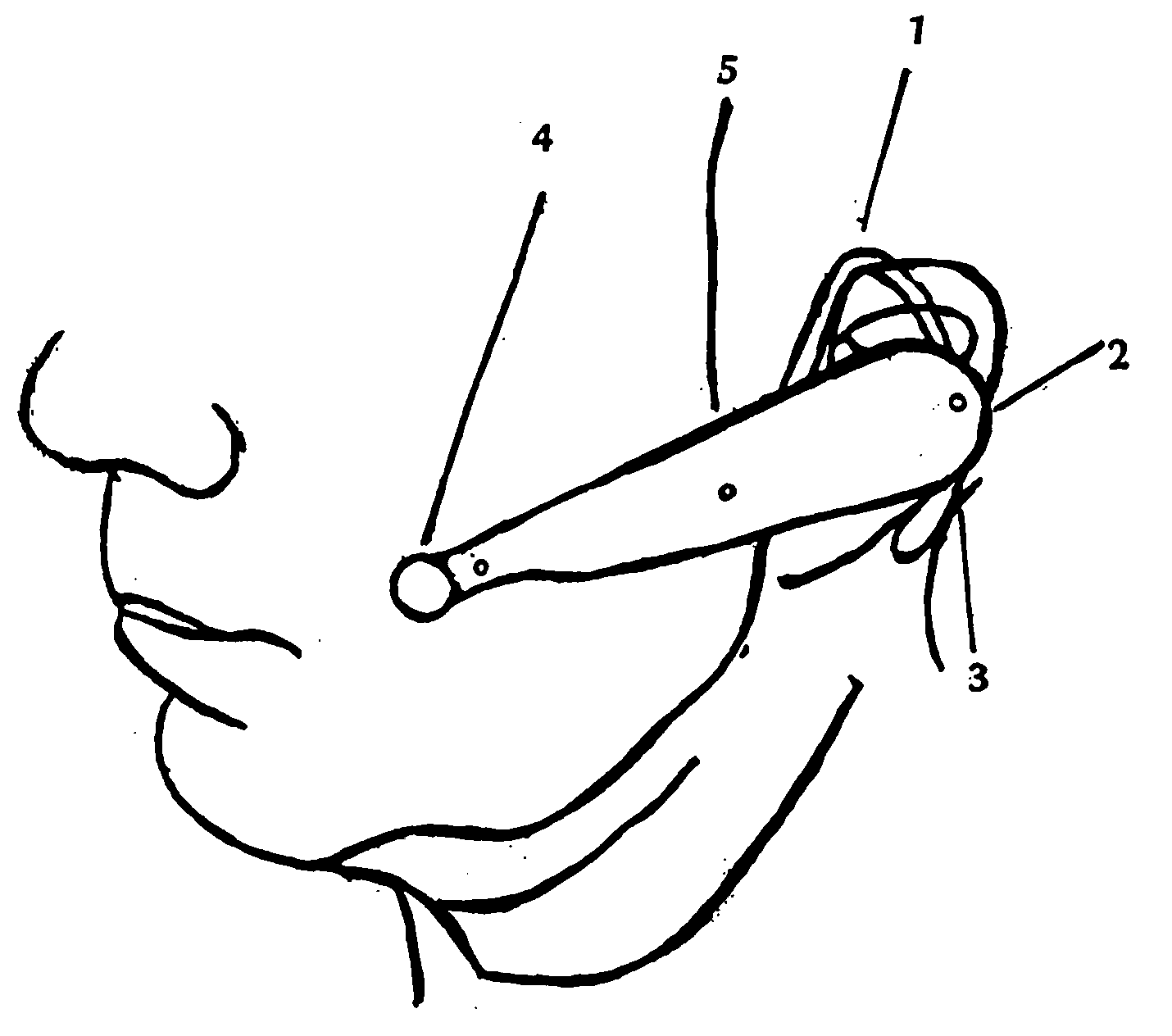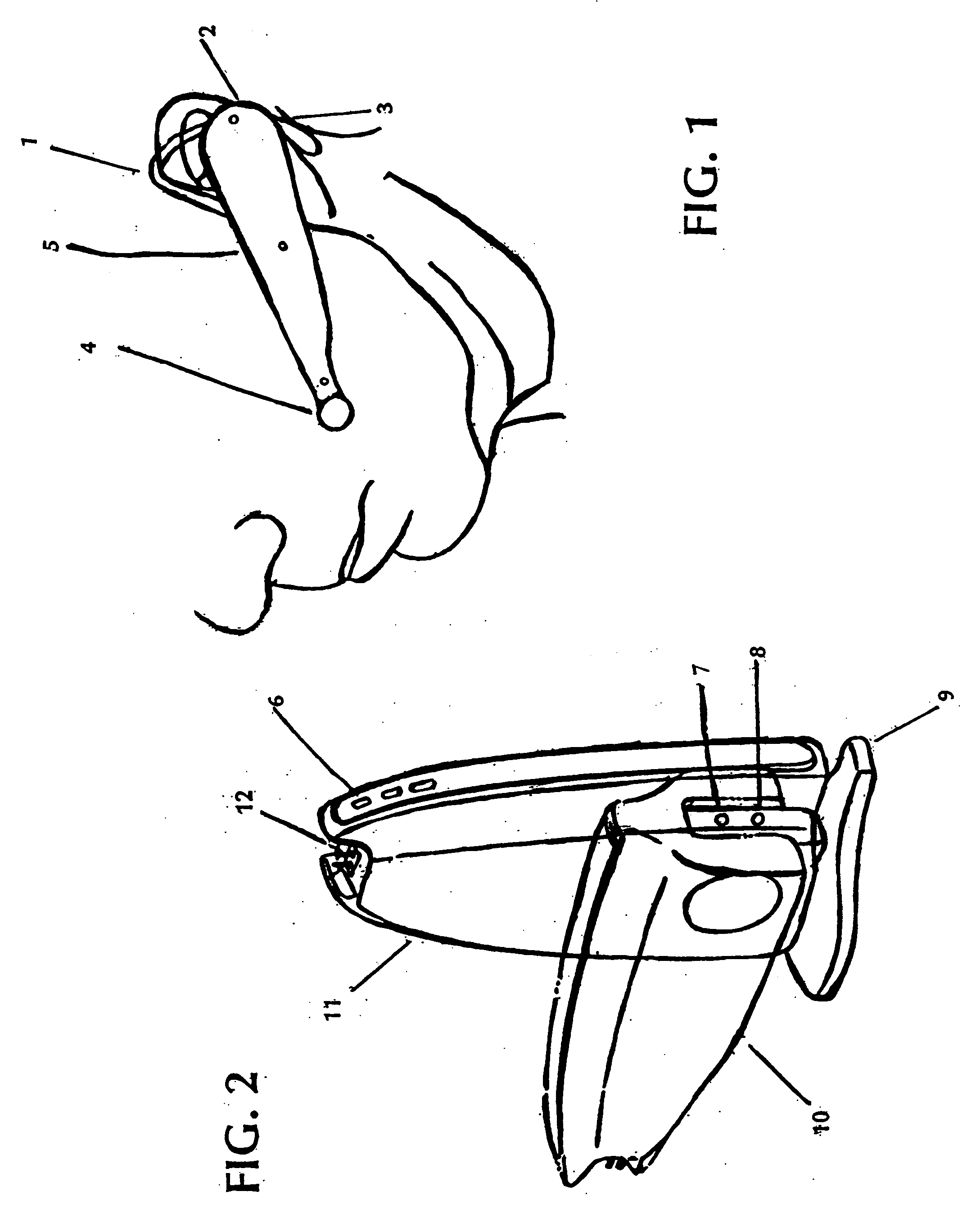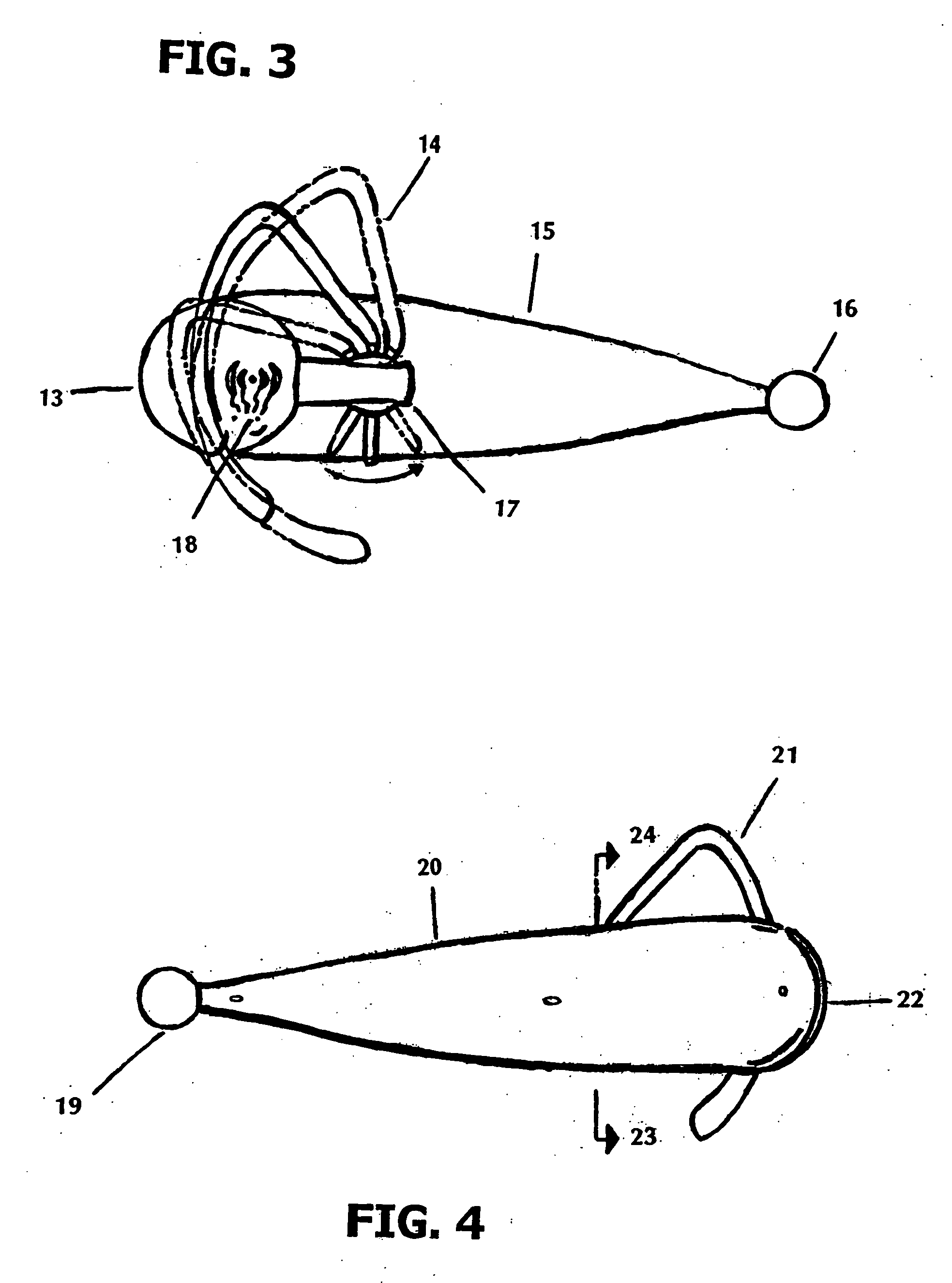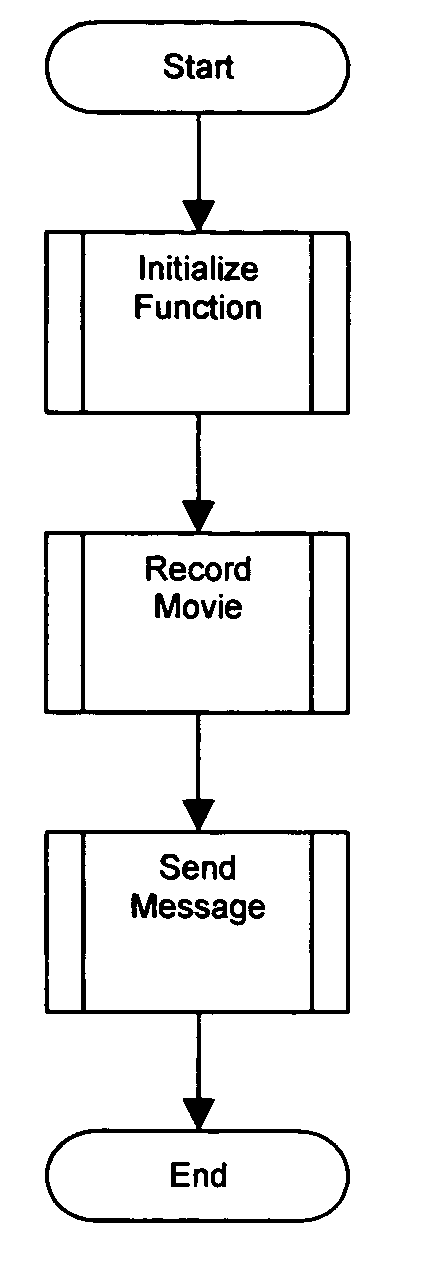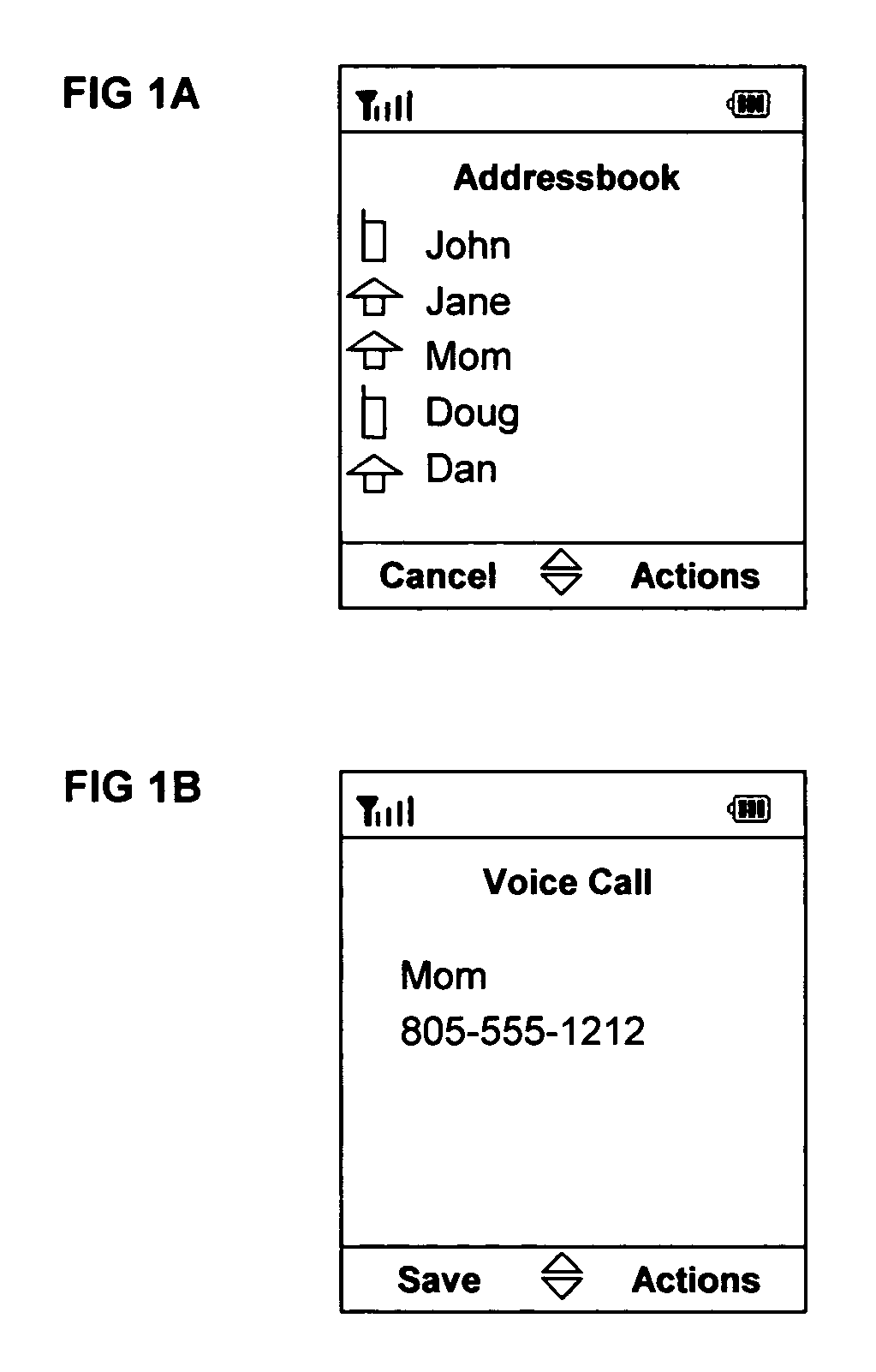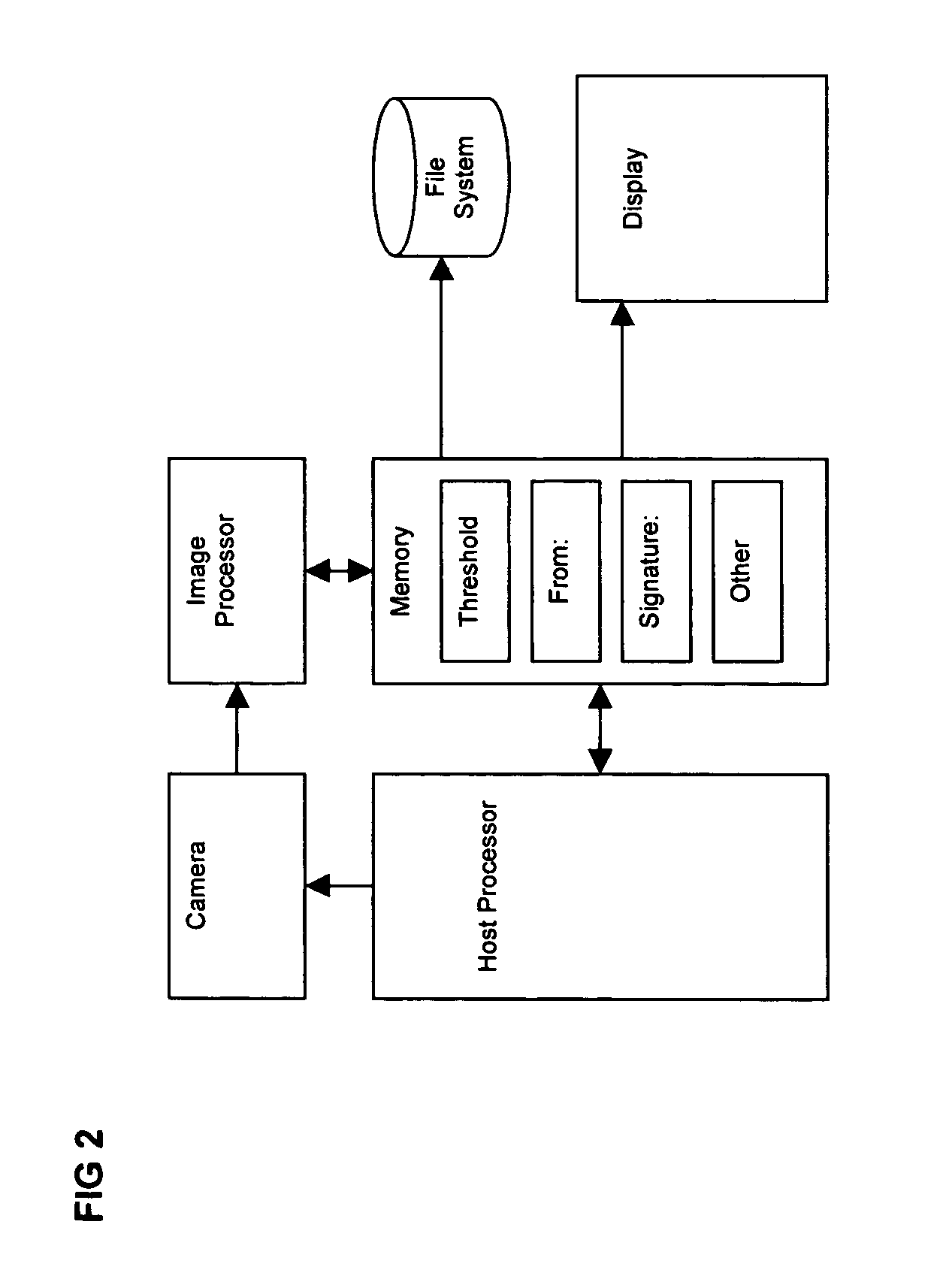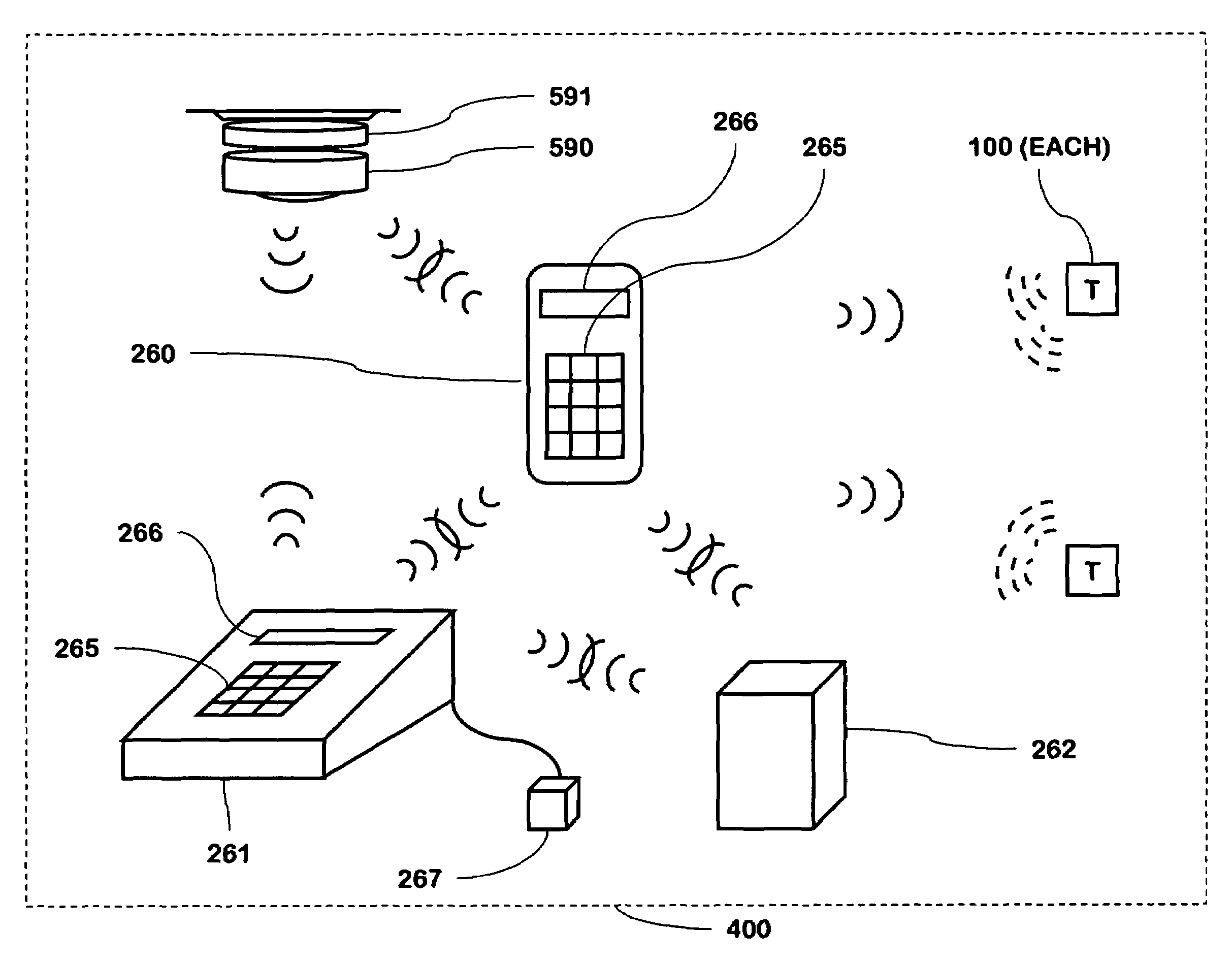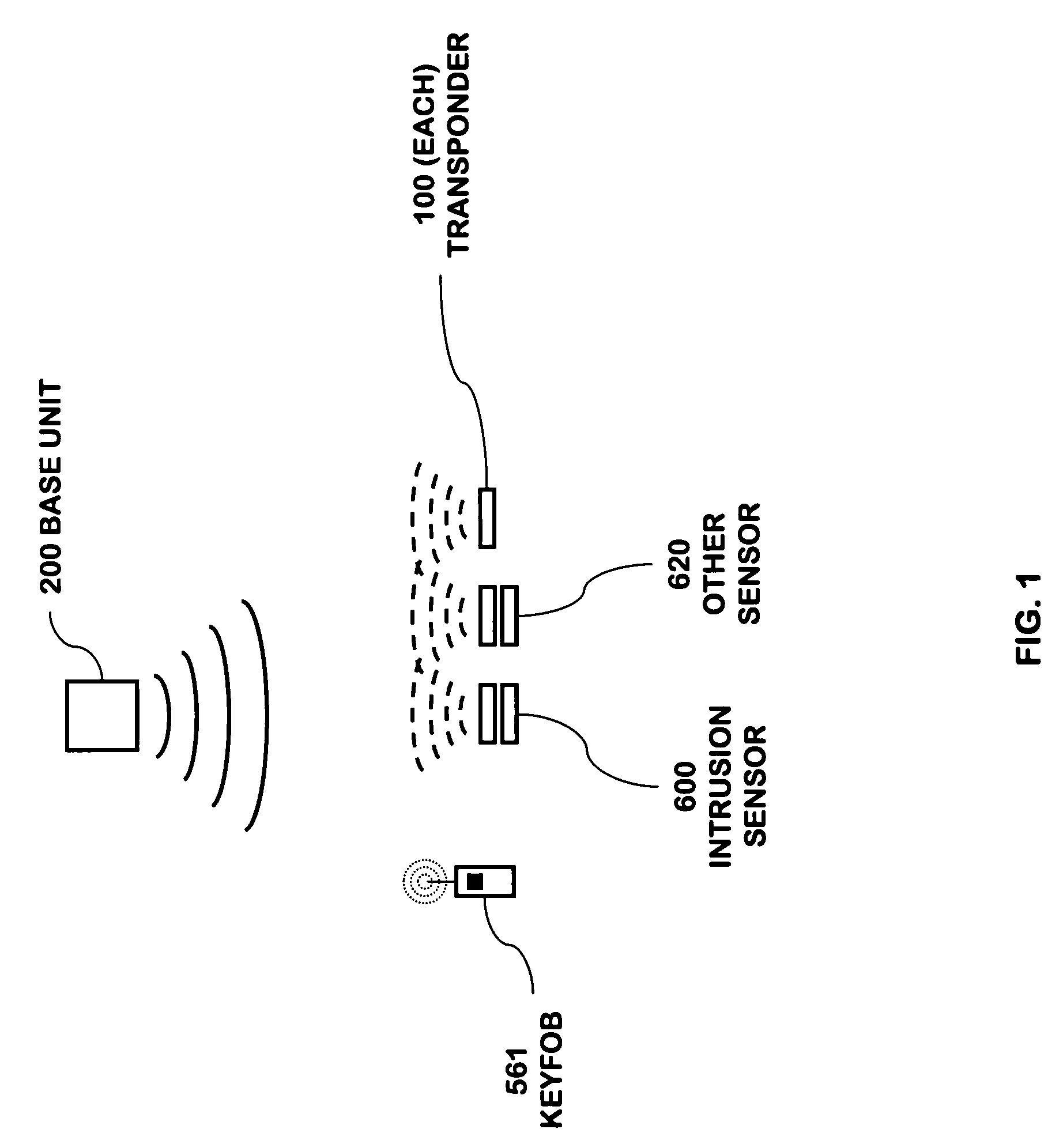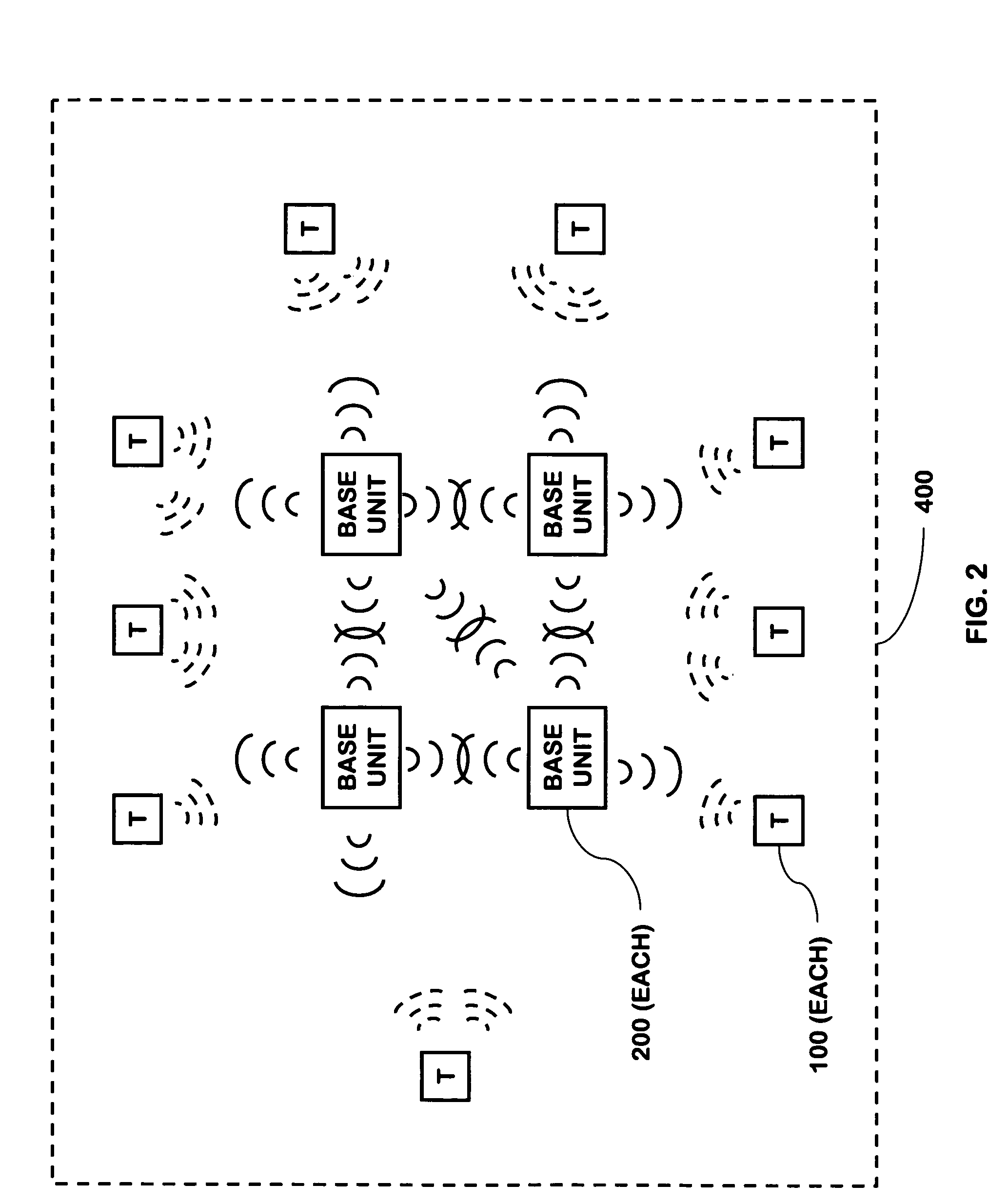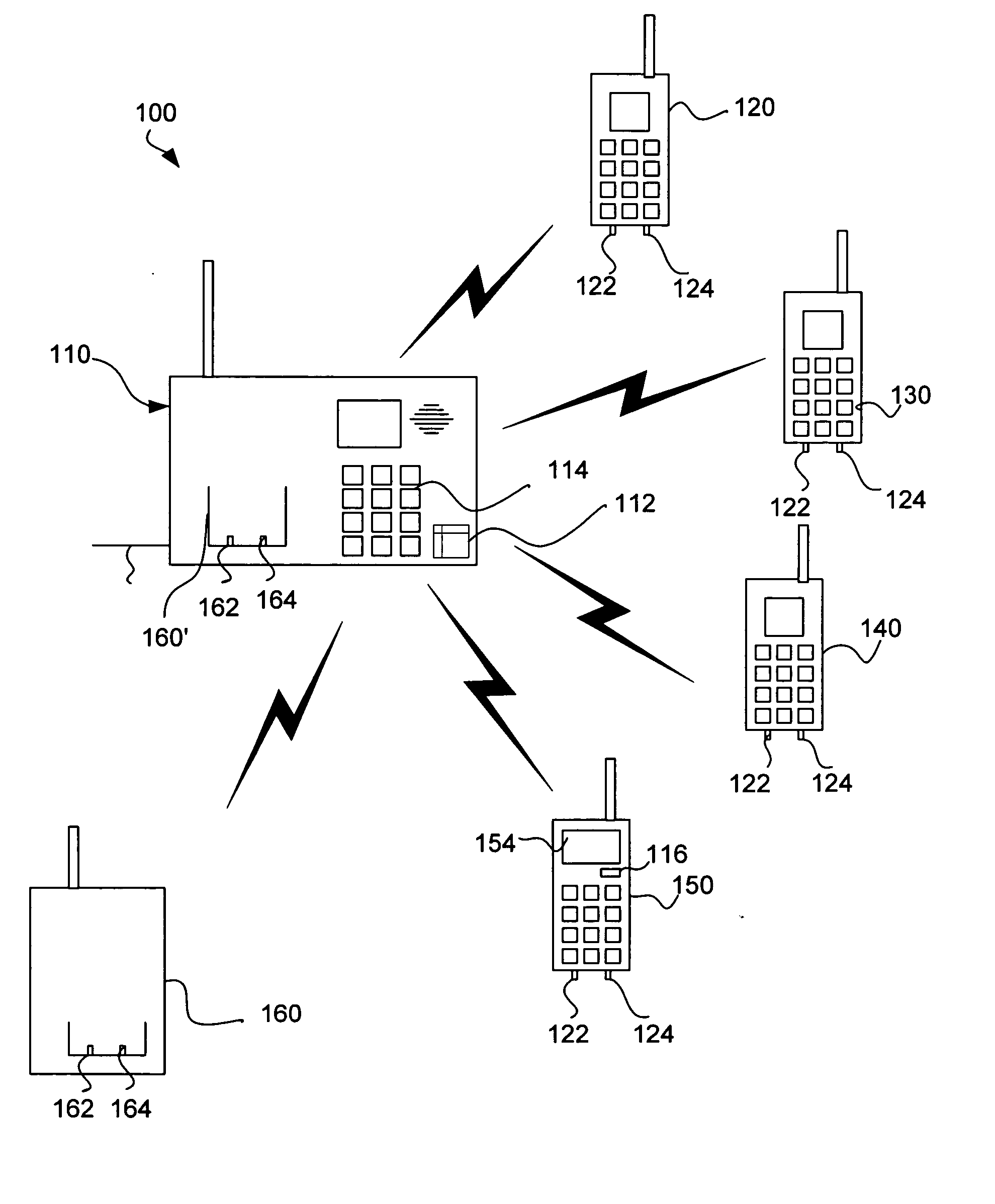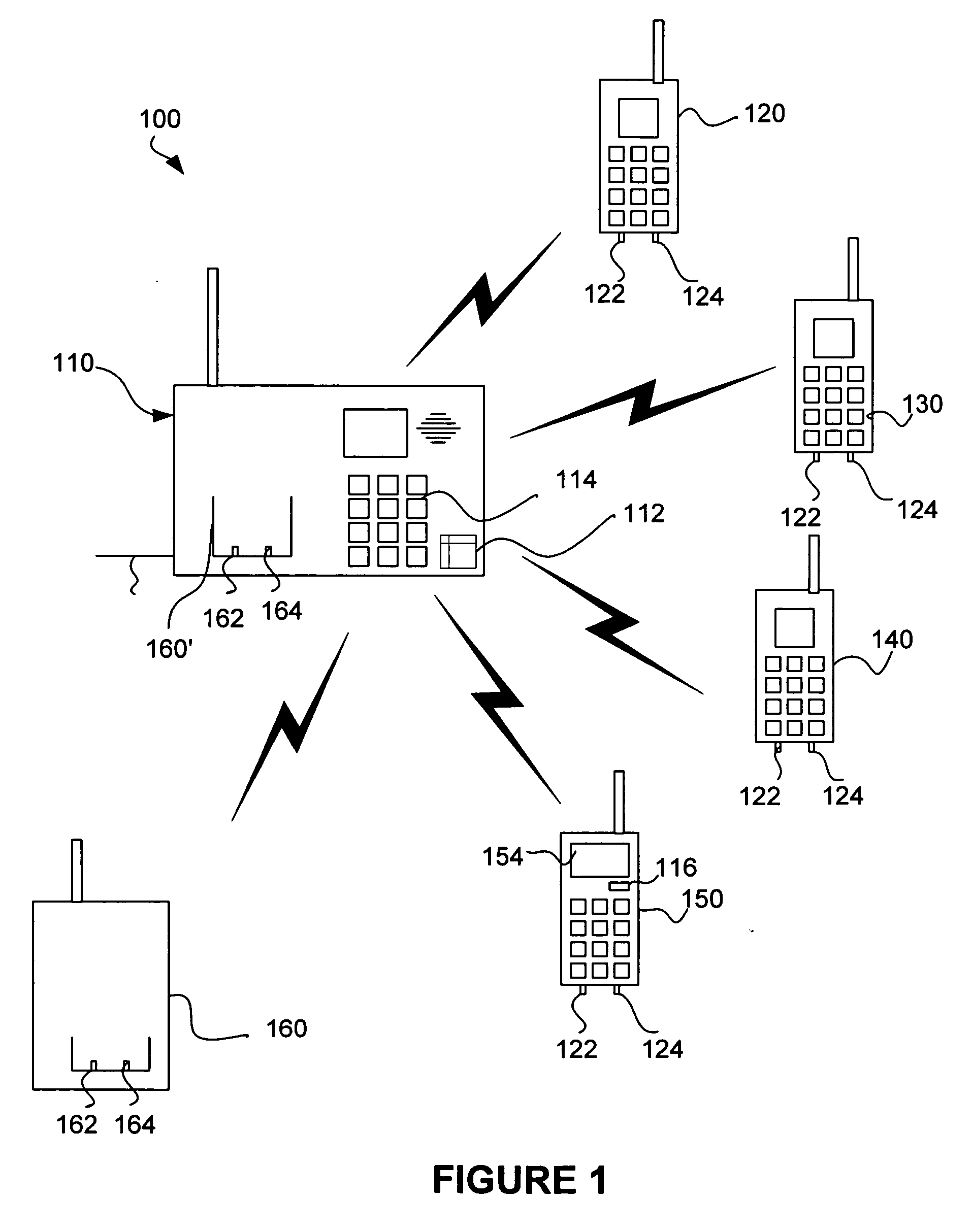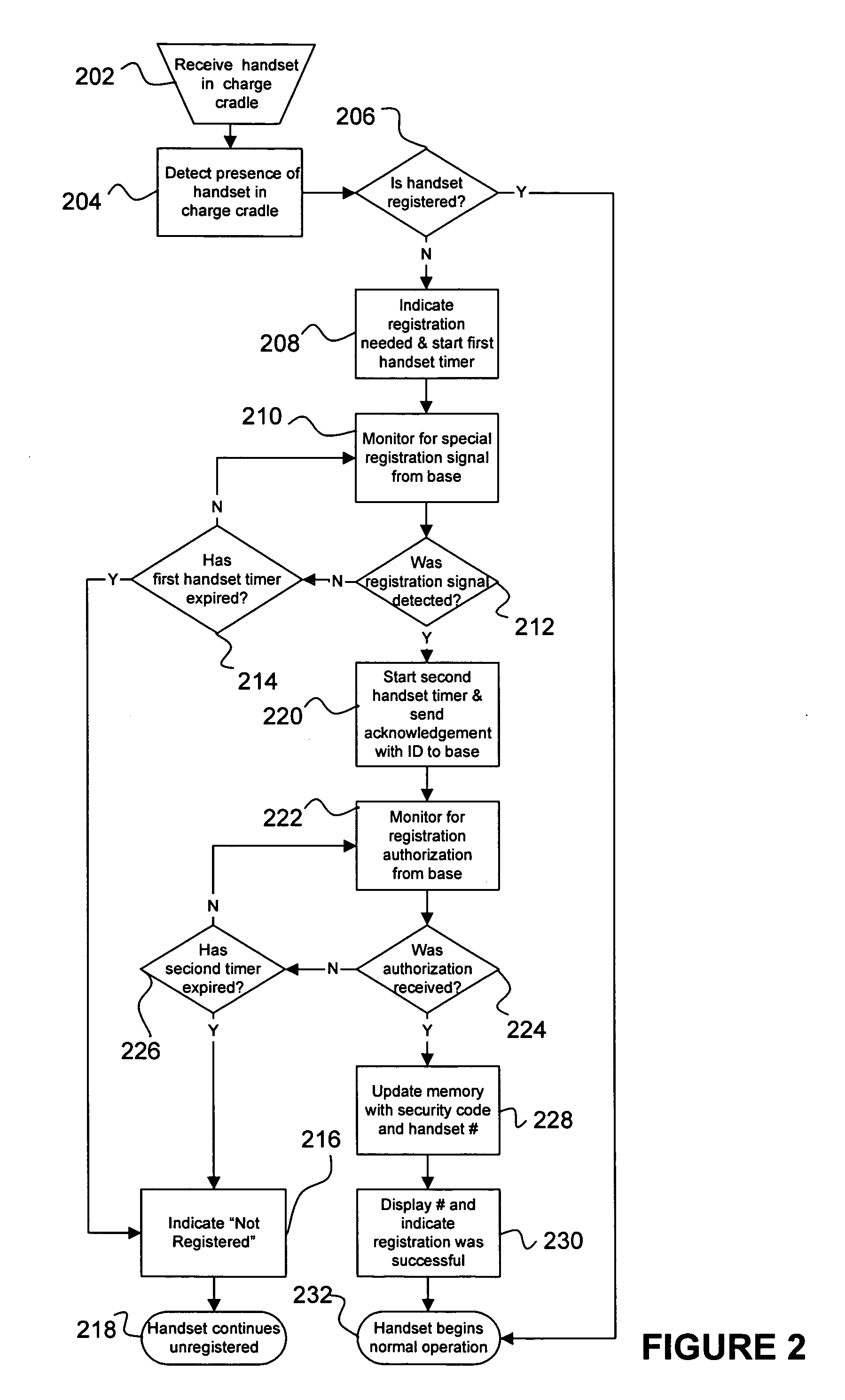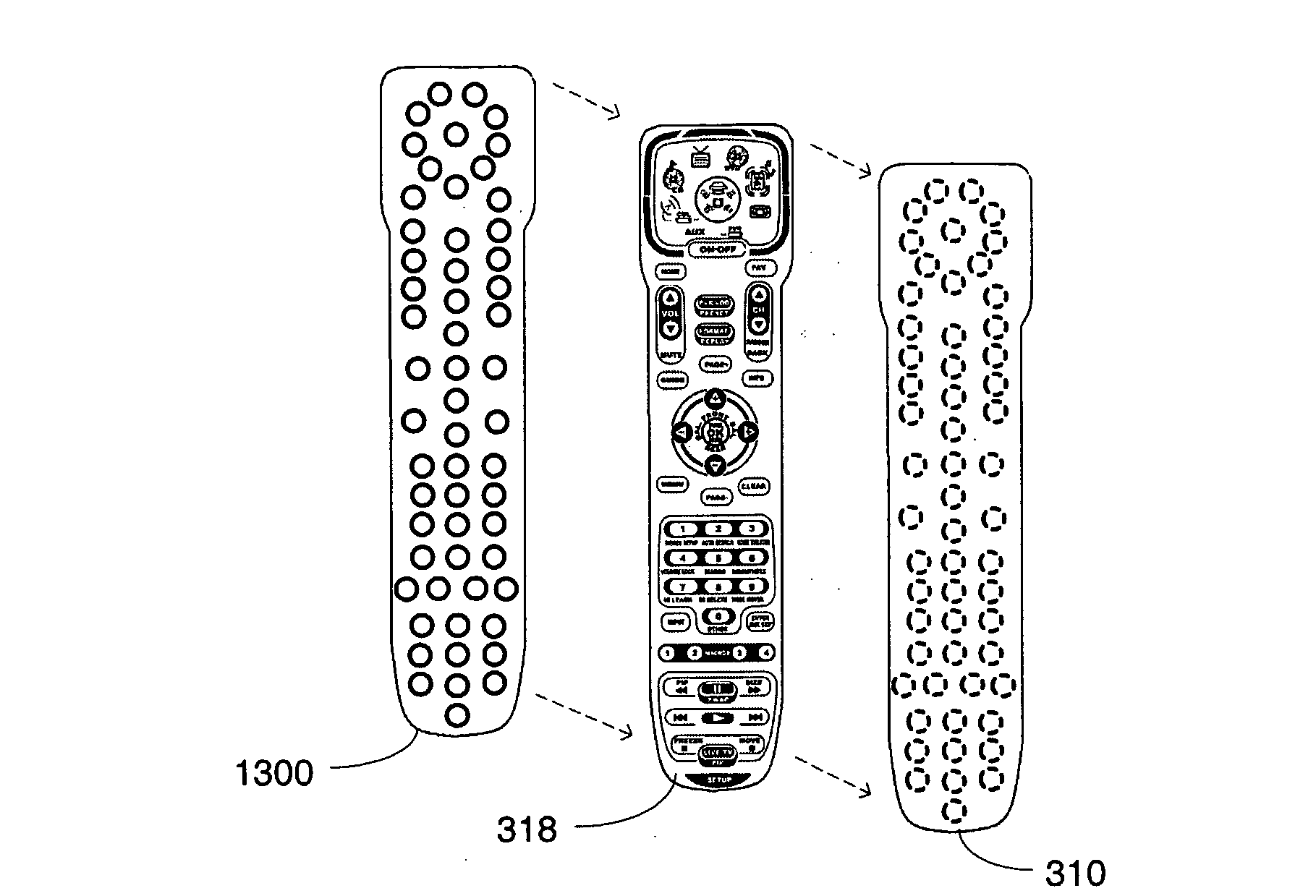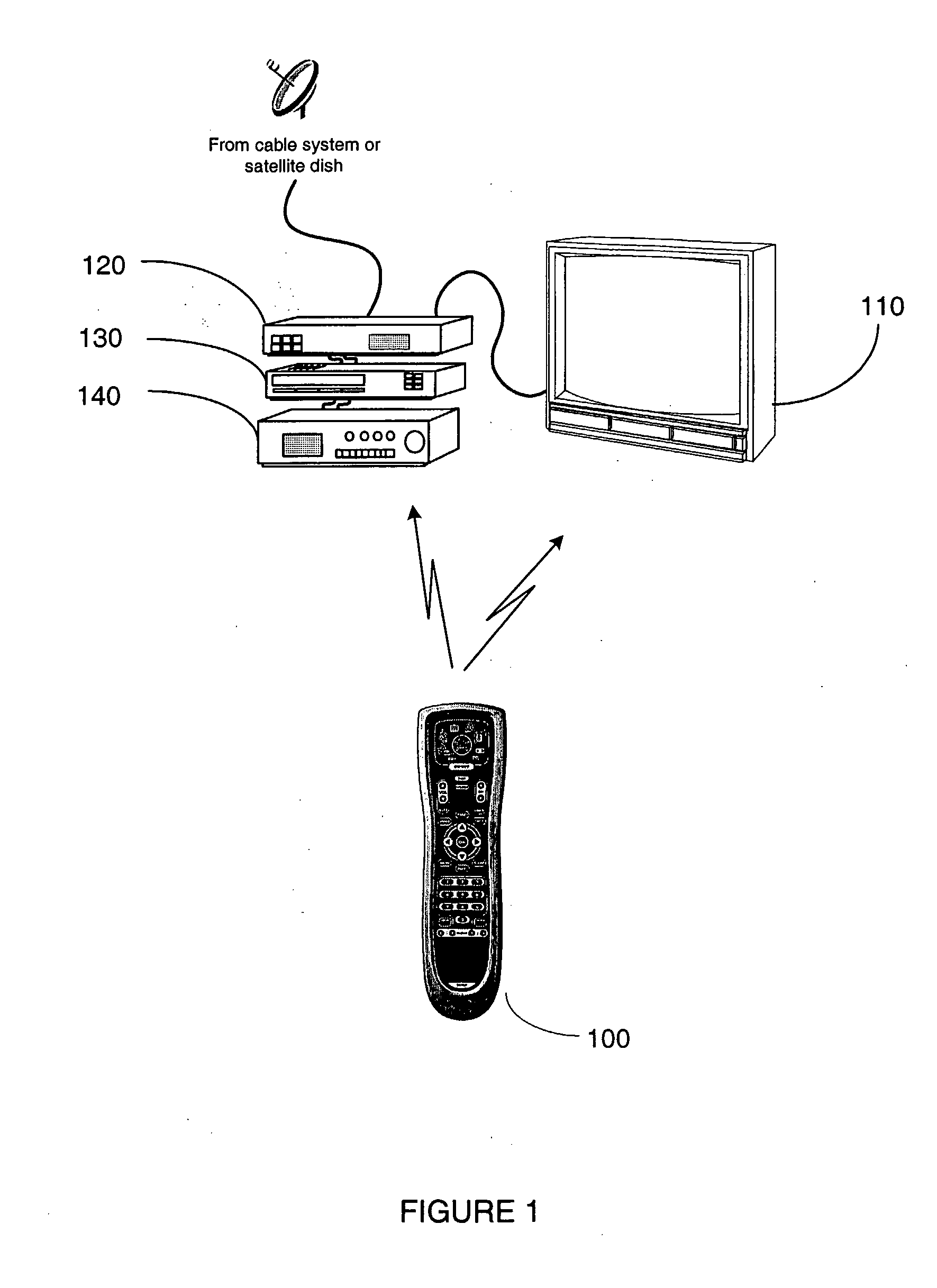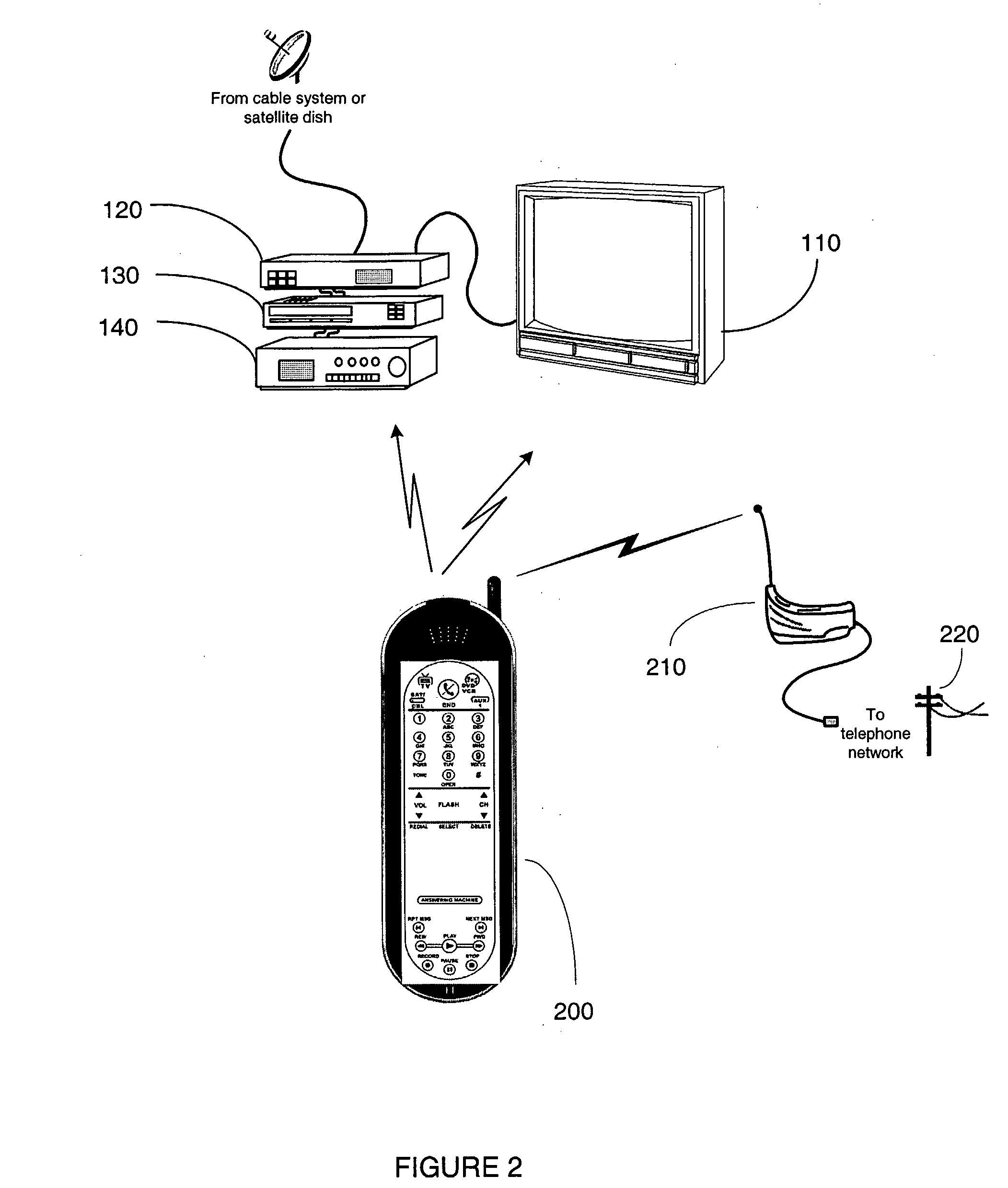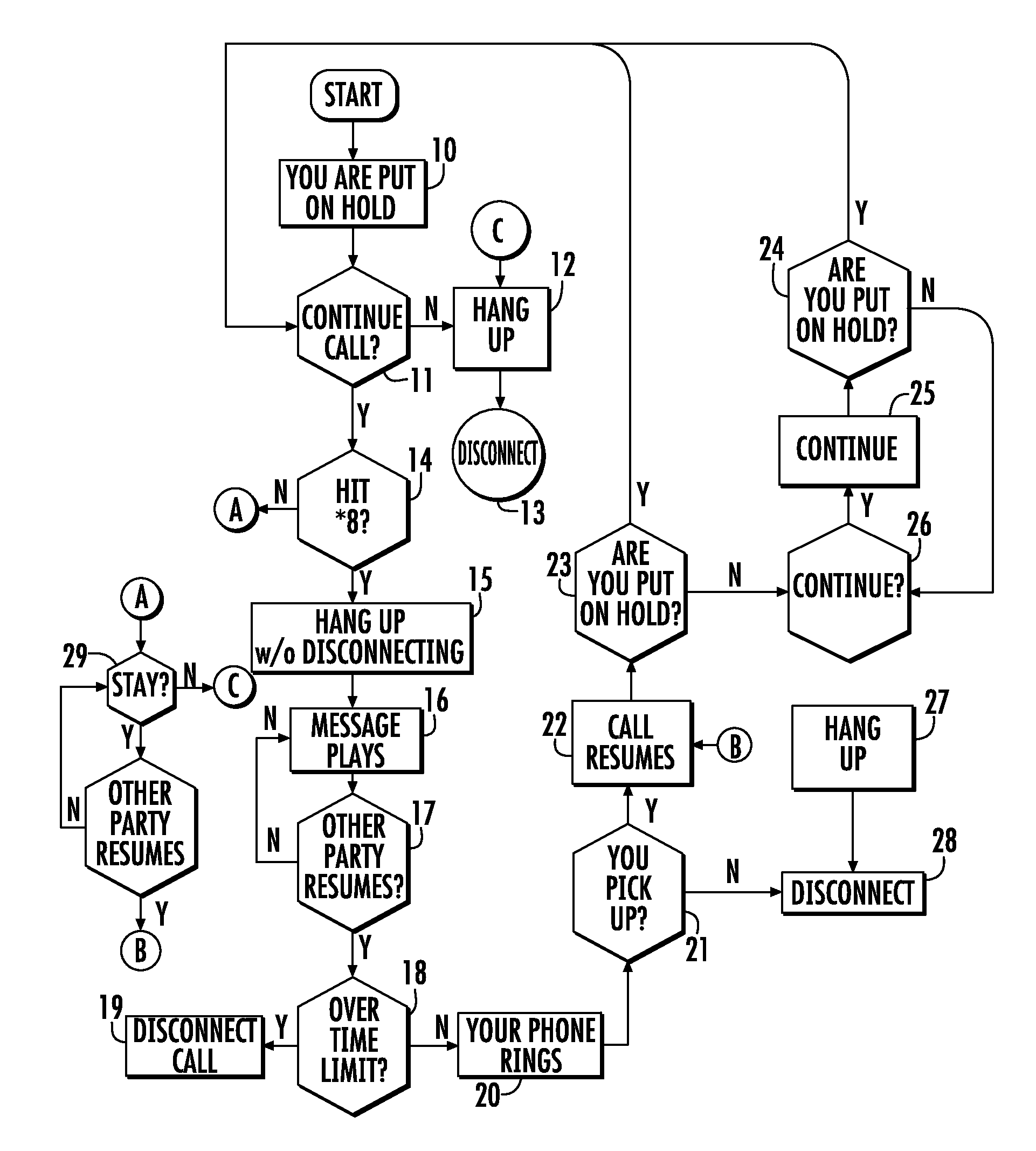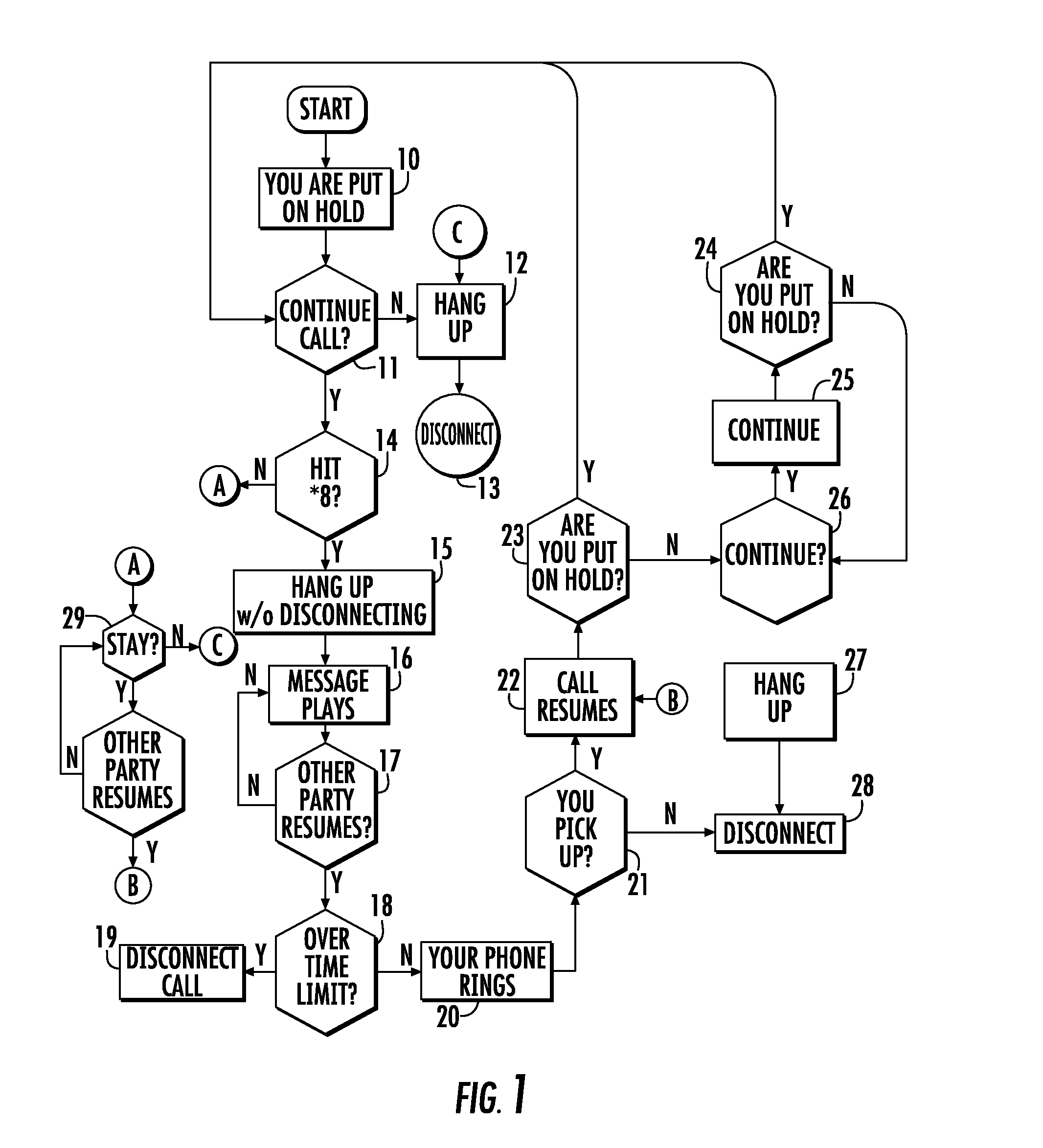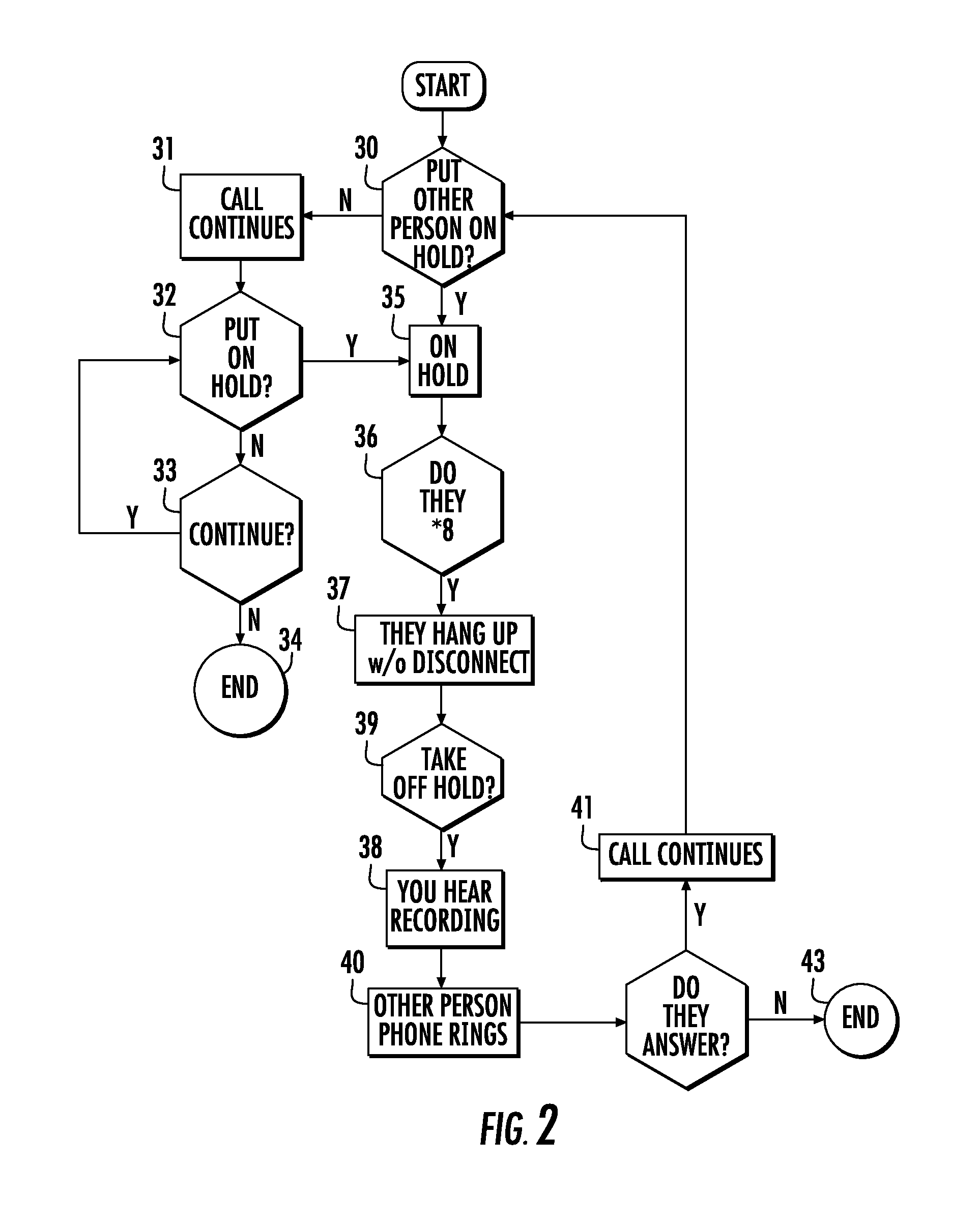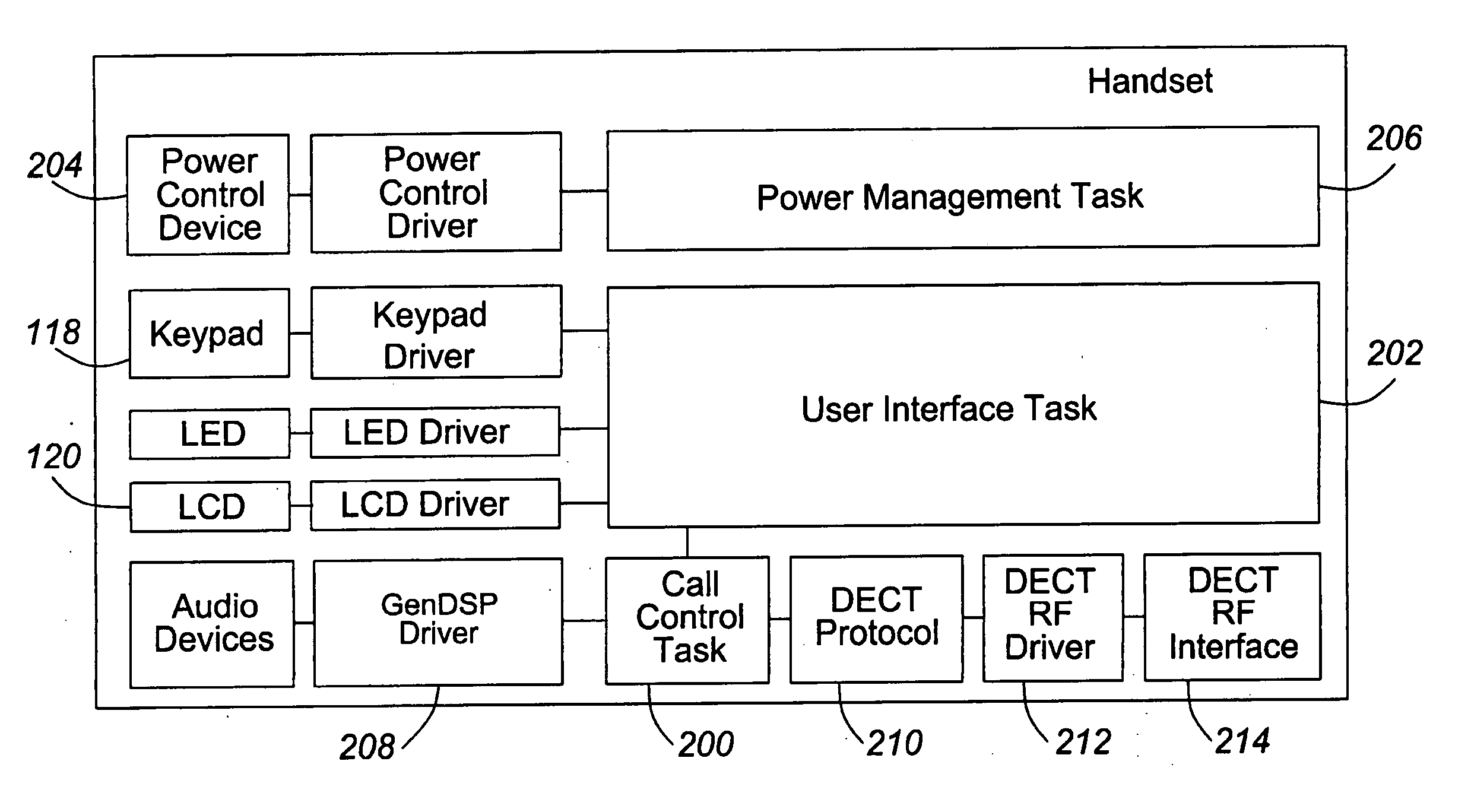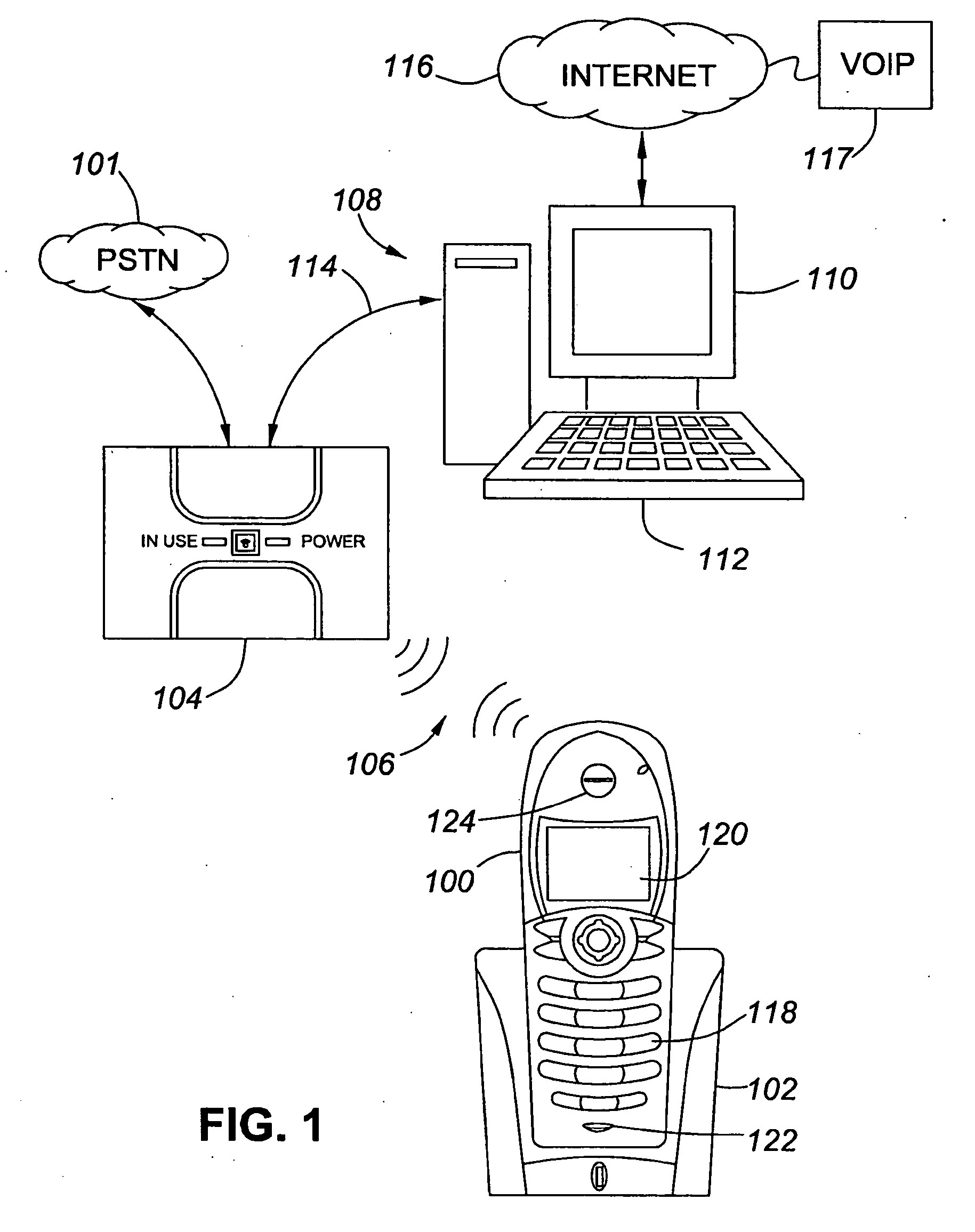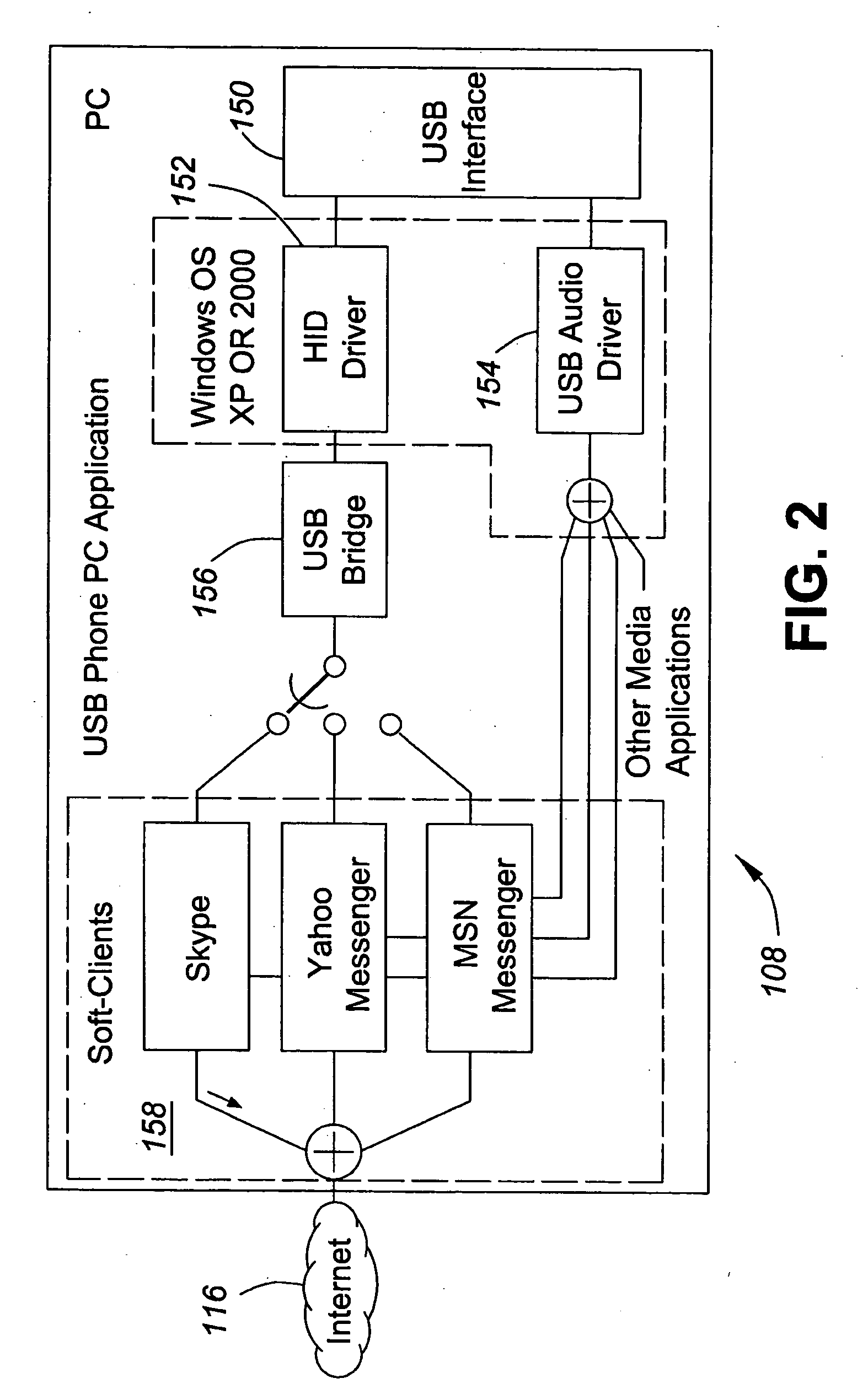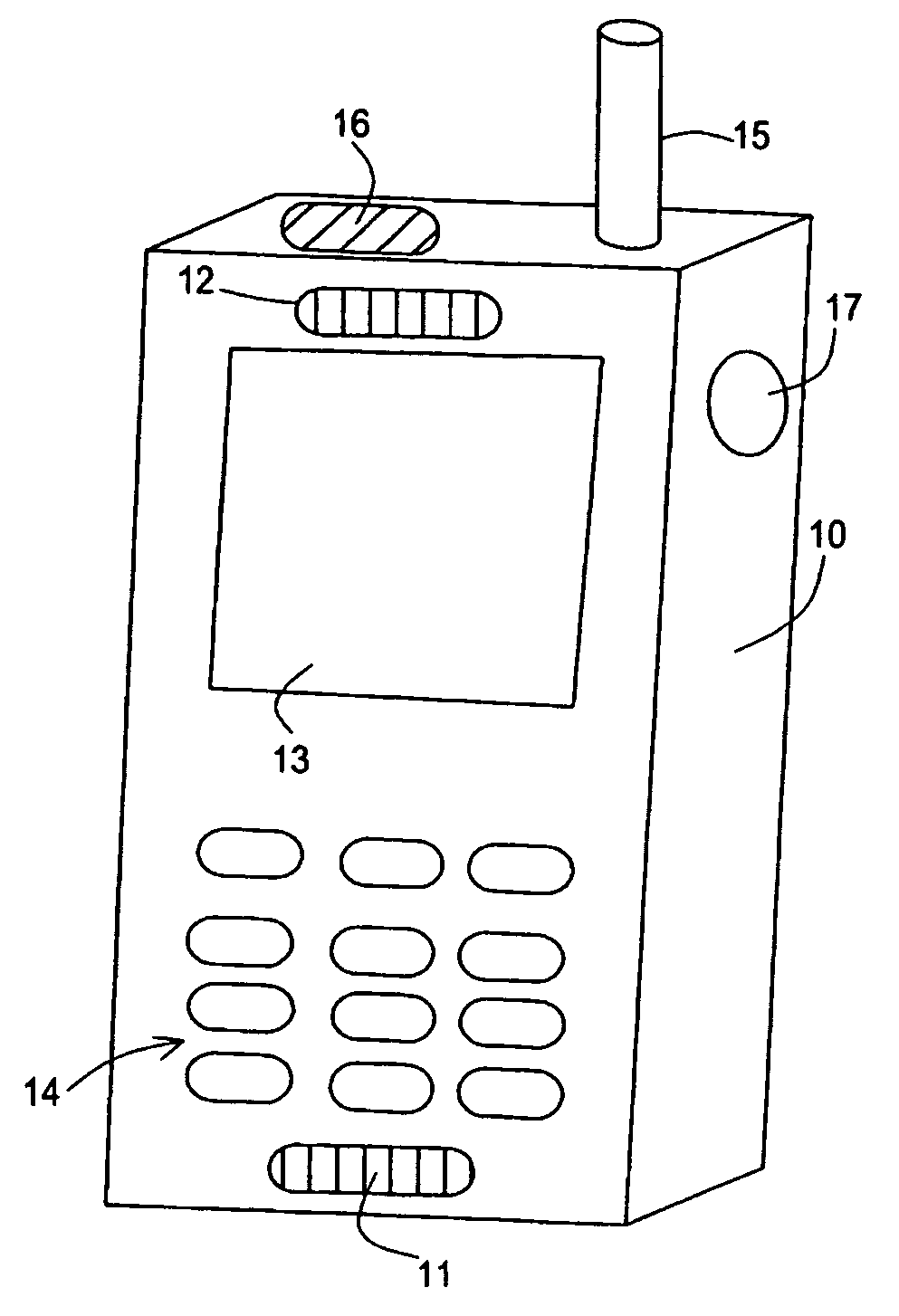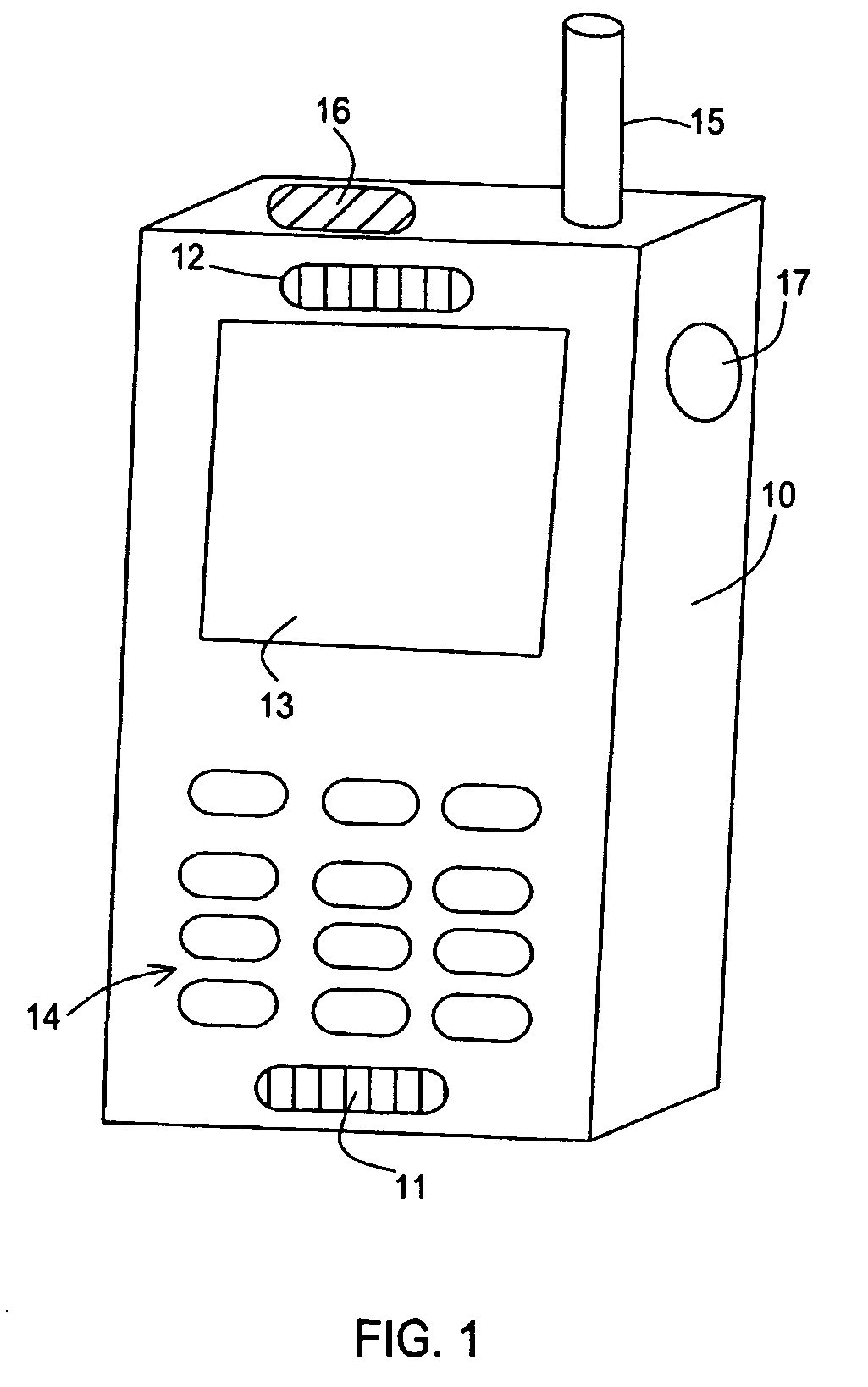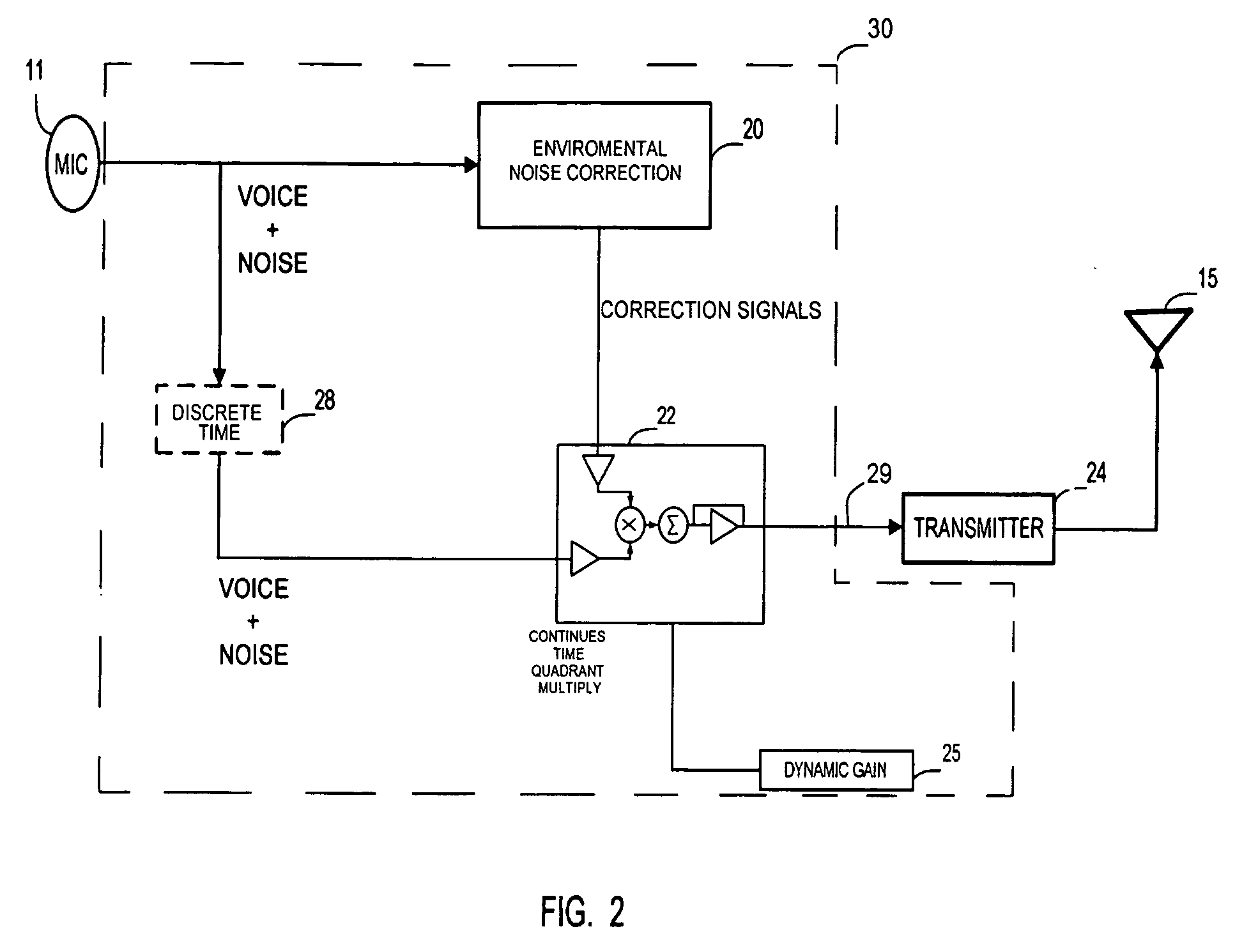Patents
Literature
434 results about "Cordless telephone" patented technology
Efficacy Topic
Property
Owner
Technical Advancement
Application Domain
Technology Topic
Technology Field Word
Patent Country/Region
Patent Type
Patent Status
Application Year
Inventor
A cordless telephone or portable telephone is a telephone in which the handset is portable and communicates with the body of the phone by radio, instead of being attached by a cord. The base station is connected to the telephone network through a telephone line as a corded telephone is, and also serves as a charger to charge the handset's batteries. The range is limited, usually to the same building or some short distance from the base station.
Wireless piconet access to vehicle operational statistics
InactiveUS6408232B1Vehicle testingArrangements for variable traffic instructionsTransceiverDriver/operator
A wireless piconet transceiver is mounted in a vehicle, and a complementary fixed wireless piconet transceiver is mounted in a garage, service station, police squad car, etc., for communication with the vehicle when parked adjacent thereto. The vehicle establishes a temporary piconet network with the user's home piconet. Vehicle operational statistics are tracked and maintained in a centralized vehicle computer database. This database can be manipulated to store the data desired by the vehicle owner. Via a wireless piconet connection, this database can transmitted to another piconet device such as the owner's computer. This computer system can be part of a wireless piconet, such as Bluetooth, This provides the computer with the ability to communicate with external wireless devices such as a cell phone, PDA, computer, or a cordless telephone. This invention allows for the configuration, or selection of desired vehicle data to be tracked. This configuration can take place on the owner's home computer (or laptop) and consequently transmitted to the vehicle computer using a wireless piconet protocol, e.g., the Bluetooth protocol. Additionally, this configuration can be manipulated by a direct interface to the vehicle provided by the manufacturer. Exemplary vehicle statistics which may be tracked include, but are not limited to, miles per gallon, average miles per hour, maximum MPH, miles driven per trip, driving statistics based on time of day and / or on identified driver, rotations of the engine per minute (RPM), temperature of engine, fuel gauge level, oil pressure, tires, brakes, engine coolant, wiper fluid, global positioning satellite (GPS) system, and / or even compressed voice from inside car cockpit during operation of vehicle.
Owner:CARRUM TECH LLC
Mobile electronic device
InactiveUS7102620B2Easy to enterTransmission easilyDevices with multiple keyboard unitsInput/output for user-computer interactionThe InternetMessage passing
An electronic device that has a lower portion that unfolds to reveal an extendable keyboard. When the keyboard is folded closed, a number pad is visible and the device looks similar to a traditional portable or cellular telephone. The device can be used as a personal digital assistant, a cellular telephone, a cordless telephone or as the handset of a traditional wire line telephone. The fold-out keyboard of the electronic device can be used for easy entry of text data while a communication channel is active. The device includes two way messaging and Internet browsing capabilities.
Owner:NETGEAR INC
Cordless and wireless telephone docking station
InactiveUS20020072390A1Substation speech amplifiersCalling susbscriber number recording/indicationDocking stationTransceiver
An apparatus and method of integrating a wireless telephone and a cordless telephone is taught. A docking station is used which receives a wireless telephone and electrically interfaces with in, including power, audio and data interfaces. A controller manages the interface to a transceiver, and speakerphone. A cordless telephone communicates with the transceiver, thereby enabling the utilization of a cordless telephone over a wireless telephone network. No wiring or installation is required, and the convenience and usability of the medium is enhanced.
Owner:WAXESS USA
Cordless RF range extension for wireless piconets
Cordless telephone technology provides a long range and highly sophisticated wireless extension between a plurality of wireless piconet networks. In one embodiment, base units of separate cordless telephones include respective piconet front ends (e.g., Bluetooth protocol bearing RF front ends) in addition to the otherwise conventional RF front end. The piconet-capable base units are placed and made members of separate piconet networks, but within conventional cordless telephone range of one another, e.g., within one mile of one another. To allow communications between piconet devices on the separate wireless piconet networks, the cordless telephone base units pass piconet content information (i.e., the messages passed by a piconet device on a first piconet network including a first cordless telephone base unit intended for receipt by another piconet device on a second piconet network serviced by the other cordless telephone base unit. In another embodiment, a base unit of a cordless telephone is made a member of a first wireless piconet network while its remote handset is made a member of a second wireless base unit, and piconet content information is passed from a device on one wireless piconet network to another device on the other wireless piconet network over the wireless cordless telephone (e.g., 900 MHz or 2.4 GHz range) channel established between the cordless telephone base unit and its remote handset.
Owner:LUCENT TECH INC
Cordless and wireless telephone docking station with land line interface and switching mode
InactiveUS20030078071A1Special service for subscribersAutomatic call-answering/message-recording/conversation-recordingDocking stationTelephone terminal
A telephone docking station that combines the operation of a wireless telephone, a cordless telephone, and a land-line telephone interface is taught. The wireless telephone and land-line interface provide telephone resources to the cordless telephone, which functions as a telephone terminal unit. Telephone calls can originate or terminate from either telephone resource. The cordless telephone handset provides for selection and display of the presently connected telephone resource. Caller ID information from both resources are routed to the cordless telephone. The cordless telephone automatically answers the presently ringing resource when is received. A speakerphone and an answering machine are added as alternative telephone terminal units in an illustrative embodiment. A Caller ID preview and hold function is provided so that the user can manage multiple calls from the telephone resources.
Owner:WAXESS USA
Cordless and wireless telephone docking station
An apparatus and method of integrating a wireless telephone and a cordless telephone is taught. A docking station is used which receives a wireless telephone and electrically interfaces with in, including power, audio and data interfaces. A controller manages the interface to a transceiver, and speakerphone. A cordless telephone communicates with the transceiver, thereby enabling the utilization of a cordless telephone over a wireless telephone network. No wiring or installation is required, and the convenience and usability of the medium is enhanced.
Owner:WAXESS USA
Communications architecture for a security network
InactiveUS7084756B2Improve reliabilityLow costMemory record carrier reading problemsTelephonic communicationTransmitted powerSI base unit
A communications architecture for a security network using low power and high power wireless communications. The low power and high power wireless communications will typically be operating in different frequency bands and at different transmit power levels. The security network contains base units and transponders. Base units may be in the form of cordless phone handsets or cordless phone base stations. Transmissions from a transponder may be received at more than one base unit. A base unit may forward communications from a transponder to another base unit. Transponder communications may contain identifying information and may further encrypt information sent in the communications. Base units may contain data used in determining whether to route communications to another base unit.
Owner:LIFESHIELD LLC
Multiple handset cordless telephone including a ring signal/call routing module
A multiple handset cordless telephone includes a Caller ID / handset association table to identify a desired intended handset to receive an incoming call before the call is answered. When a match is made as between received call related information and a pre-stored entry in the Caller ID / handset association table, one or more intended handsets are provided with the subsequent ring signals and / or the subsequent voice conversation. If no match is found the cordless telephone operates otherwise in conventional fashion, i.e., all handsets ring in response to the incoming call, and any or all of the handsets may join the conversation at any time. The entries in the Caller ID / handset association table may be input manually using a keypad at the base unit or at any one of the handsets, or the received call related information with respect to a current, established incoming call may be stored as an entry in the Caller ID / handset association table and associated with the currently used handset or handsets upon activation of a unique code or dedicated button.
Owner:WSOU INVESTMENTS LLC +1
Cordless and wireless telephone docking station with land line interface and switching mode
InactiveUS6987988B2Automatic call-answering/message-recording/conversation-recordingRecord information storageDocking stationTelephone terminal
A telephone docking station that combines the operation of a wireless telephone, a cordless telephone, and a land-line telephone interface is taught. The wireless telephone and land-line interface provide telephone resources to the cordless telephone, which functions as a telephone terminal unit. Telephone calls can originate or terminate from either telephone resource. The cordless telephone handset provides for selection and display of the presently connected telephone resource. Caller ID information from both resources are routed to the cordless telephone. The cordless telephone automatically answers the presently ringing resource when is received. A speakerphone and an answering machine are added as alternative telephone terminal units in an illustrative embodiment. A Caller ID preview and hold function is provided so that the user can manage multiple calls from the telephone resources.
Owner:WAXESS USA
Internet Enhanced Cordless Telephone System
InactiveUS20050068938A1Simplify administration processLess costlyTelephone data network interconnectionsConnection managementPrivate networkThe Internet
Disclosed invention is a consumer telephone system (the iCord telephone) that globally extends the range of cordless telephones by using the Internet to securely connect a cordless base station to multiple cordless handsets / phones. An iCord phone user can receive or make PSTN calls on the same iCord base station from anywhere that has Internet connectivity for one's iCord handset. The iCord system can page and carry on a VoIP conversation with any iCord handset registered on the same iCord base station without incurring PSTN telephone call charge. In addition, an iCord handset can simultaneously register and securely connect with multiple iCord base stations over the Internet. Thus an iCord handset user, from anywhere over the Internet, can receive or make PSTN phone calls from, for example, either office, home or friend's iCord base stations with the same iCord handset. Multiple iCord base stations can also set up as a private phone network over the Internet. Such that an iCord handset only needs to register with one iCord base station and can access any other base stations within the same private network. The iCord phone invention is also applicable to VoIP service that supports the use of cordless phones to receive or make VoIP calls.
Owner:TELECOMMSOFT CORP
Mediation Device and Method for Remotely Controlling a Camera of a Security System Using Dual-Tone Multi-Frequency (DTMF) Signals
InactiveUS20080043107A1Telephonic communicationClosed circuit television systemsEngineeringHome security
A mediation device located in the user's home receives dual-tone multi-frequency (DTMF) signals via a Plane Old Telephone Service (POTS) connection and decodes the signals into signals that are used to control one or more cameras of the user's home security system. The mediation device may be a device that serves only this purpose, or it may be part of another device, such as, for example, an answering machine, a fax machine, or a cordless telephone.
Owner:GENERAL INSTR CORP
Mobile phone extension and data interface via an audio headset connection
A method and apparatus is present for achieving simple and inexpensive communications from wired phones to mobile or cell phones called a mobile phone extension. It is inexpensive because of flexible system architecture and simple hardware implementation. It allows phone calls to be made from wired phones over a cell phone. It is simple because audio signals from a microphone and speaker of a wired handset are connected to the mobile phone via a simple plug connection to the headset audio port. Alternatively, the system works with wireless connections between headsets and mobile phones. When the connection is made with a base station, it can be a wired or cordless phone or device acting as the base station. The disclosed system allows electronic apparatus to use a common mobile phone to link its communication instead of having an embedded phone separate from the user's personal phone. Other uses provide a means to communicate with a wireless headset while connecting audio from other devices such as audio devices such as players and records, and data devices. Even if the later is only speaker audio only, but it can contain microphone audio too. Thus useful apparatus and methods are claimed to connect mobile phones and wireless headsets with wired phone handset audio or other audio or video, and digital devices. One such audio player is the “I-Pod” known as a trademark of Apple Corporation. These devices can thus be connected with the disclosed interface, even when not using a wired phone, so audio from a cell phone and other devices can be received on the same headset. Use of gesture technology and particular command sets are also claimed for controlling devices using
Owner:CEHELNIK THOMAS G
Low power consumption quick charge for wireless device
The current draw of a wireless device, e.g., a cordless telephone, is minimized for a cradled remote handset drawing power from an AC outlet. This allows a greater portion of the total current amperage provided by the AC to DC converter to be allowed to charge the battery in the remote unit, and reduces the overall maximum or peak value of the current draw of the wireless device. With an improved peak power budget, a smaller (and presumably less expensive) AC to DC adapter than otherwise necessary may be used to power the wireless device. In one aspect, sniff operations of the remote handset are disabled or otherwise suppressed while the remote handset is in the cradle of the base unit, e.g., receiving a quick charge or trickle charge to its battery. In a second aspect, sniff operations of the base unit are disabled or otherwise suppressed while the remote handset is in the cradle of the base unit. In a last aspect, the charging mode of the battery in the remote handset of a wireless device changes based on activity in the remote handset.
Owner:LUCENT TECH INC
Portable internet browser device with cordless phone module and method of operation
InactiveUS6952414B1Lower latencyInput/output for user-computer interactionDevices with wireless LAN interfaceWeb siteTransceiver
There is disclosed a personal access device (PAD) capable of browsing web sites on an Internet protocol (IP) network and also capable of operating as a cordless phone that provides a conventional phone connection or a voice-over-IP phone connection. The personal access device comprises: 1) a radio frequency (RF) transceiver for wirelessly communicating with a base station coupled to the IP network, wherein the RF transceiver transmits IP data packets to the base station and receives IP data packets from the base station; and 2) a PAD controller for executing an Internet browser application and displaying web pages associated with the web sites on a display screen of the personal access device. The PAD controller is also capable of transmitting voice data to, and receiving voice data from, the base station via the RF transceiver.
Owner:ADVANCED MICRO DEVICES INC
Method and apparatus for an improved call interrupt feature in a cordless telephone answering device
InactiveUS6901266B2Function increaseCordless telephonesUnauthorised/fraudulent call preventionVoice communicationOperation mode
A telecommunication device comprising a base unit and a cordless handset, wherein said telecommunication device is operable in a plurality of modes of operation. The base unit includes: (1) a ring signal detection module communicatively coupled to a telephone network; (2) a voice communication channel also communicatively coupled to said telephone network; (3) a wireless communication transmitter module; (4) a wireless receiver module; and (5) a controller for executing program instructions. The cordless handset includes: (1) a ringer module; (2) an ear piece; (3) a microphone; (4) a talk request command input device; (5) a wireless communication transmitter; and (6) a wireless communication receiver. The modes of operation include a talk request mode of operation, wherein (1) a ringing signal is received at said base unit; (2) said base unit transmits a wireless signal to said cordless handset; (3) said cordless handset receives said wireless signal; from said base, and initiates said local ringer module; (4) said base unit counts a predetermined number of rings; (5) said base unit initiates an off-hook condition in response to detection of a predetermined number of rings; (6) an outgoing message (OGM) is played at said base unit; (7) actuation of said talk request command input device is detected; (8) said base unit receives a wireless talk request signal (TRS) from said cordless handset, initiates an OGM end detection means, and continues to play said OGM; and (9) upon detection of end of said OGM by said OGM end detection means, said base unit inhibits the start of an incoming message (ICM) means and connects the calling party with the called party at said cordless handset.
Owner:HENDERSON DANIEL A
Multi-purpose mobile cordless phone system
InactiveUS6950674B2Low costComparable in costCordless telephonesActive radio relay systemsTelephone networkLocal loop
A cordless phone 1 is able to communicate signals 3 via antenna 2 and 3 with transponder unit 5. When the transponder 5 is physically connected (as shown) via multi-way connector 12 to base station 19, the system communicates via PSTN interface 9 and cable 10 connected to local-loop socket 11 within a fixed telephone network. When the transponder 5 is disconnected (not shown) from base station 19, the system communicates via external antenna 6 by radio link with a local base station within a cellular phone network. The base station 19 provides means to recharge the batteries (not shown) of cordless phone 1 via connectors 13 and transponder unit 5 via connectors 14, with dc supply being provided by power plug 16 via cable 17. The transponder unit may include a display screen and PDA electronics (not shown), or, be incorporated within a portable computer (not shown).
Owner:POLUTEK
Cordless telephone with MP3 player capability
InactiveUS20050054379A1Substation speech amplifiersCalling susbscriber number recording/indicationThe InternetSpeech sound
A cordless telephone which allows a user to play MP3 digital audio bit stream music, a video game, either alone or with a user of another cordless telephone, using the remote handset of a cordless telephone to control the functions of the MP3 player. The cordless telephone remains usable as a typical cordless telephone with all the features and conveniences of a cordless telephone including, but not limited to, connection of a telephone call between a calling party and a called party, caller ID information, voice messaging features, etc. MP3 digital audio bit stream music may be downloaded from a remote source through, e.g., the Internet and a PC.
Owner:BELL NORTHERN RES LLC
Radio relay device
InactiveUS20050136835A1Avoid collisionPrevent transmission timingSynchronisation arrangementNetwork traffic/resource managementRadio networksRadio relay
This invention provides a radio relay device with a small size and reduced cost which can prevent collision of communication data when the communication data are relayed in a plurality of radio networks. The radio relay device relays the communication data between a parent device and a child device of a cordless telephone. The radio relay device includes a synchronization timing detector 16 for detecting a synchronization timing with the transmission of the parent device when relaying a packet transmitted from the parent device to the child device of a different radio network (piconet) and a timing correcting value buffer 20 for storing a correcting value computed from a difference between the synchronization timing and a clock in a bit counter 19. When the radio relay device relays the packet from the parent device to the child device, it communicates with the child device at the timing corrected on the basis of the correcting value extracted from the timing correcting value buffer 20.
Owner:PANASONIC CORP
Method and system for locating a network device connected to a proxy network device in an emergency situation
ActiveUS20210153001A1Services signallingLocation information based serviceEmergency encounterDigital Enhanced Cordless Telecommunications
A method and system for locating a network device connected to a proxy network device in an emergency situation. When an electrical connection, whether through physical wires or over a wireless interface such as spread spectrum technology is made on a proxy network device (e.g., analog terminal adapter (ATA), analog or digital Private Branch Exchange (PBX) system, Digital Enhanced Cordless Telecommunications (DECT) devices, gateway, bridge, router, switch, etc.) for a network device, the proxy network device sends a connection identifier such as a port number or wireless channel number, Device IDentifier (DID) number, etc. to an emergency location server network device to associate the connection identifier on the proxy network device with connected network and with a current physical location to be used in an emergency. When an emergency event occurs, the connection identifier is used to determine an emergency current physical location that is used by first responders.
Owner:EVERBRIDGE
Cell phone extension using wireless piconet
InactiveUS20020132582A1Near-field transmissionNetwork topologiesTerminal equipmentCellular telephone
In accordance with the principles of the present invention utilizing the BLUETOOTH specification Cordless Telephony profile, incoming calls to a cell phone including a Gateway role can be routed to another piconet device (e.g., another cell phone including a Terminal role. Two cell phones with BLUETOOTH capability each include the Cordless Telephony Profile. The cell phone receiving the call acts as a PSTN cordless telephone Gateway cell phone via the cellular network, while the other cell phone acts as a cordless telephone Terminal cell phone. The cordless telephone Terminal cell phone then acts as an extension to the Gateway cell phone allowing both calls to the Gateway cell phone to be answered at the Terminal cell phone, and even allowing calls by the Gateway cell phone to be originated by the Terminal cell phone. Moreover, the present invention includes the ability for any one of a number of authorized Terminal devices (e.g., Terminal cell phone) to answer an incoming call to a Gateway cell phone "on the fly' after hearing the ringing at the Gateway cell phone. Telephone calls may be remotely initiated from the Terminal cell phone via the Gateway cell phone. Inexpensive or featureless Terminal devices can tap into advanced features of more expensive Gateway cell phones, without the need to implement the hardware and / or software for the features themselves in the Terminal device. An authorized terminal list identifies Terminal devices authorized to answer an incoming call to a Gateway cell phone, and may be expanded to include other feature enable / disable configuration. The present invention also provides an interface between devices having differing telephony standards, e.g., between an IS-41 cell phone acting as a Terminal and a GSM cell phone acting as a Gateway cell phone.
Owner:AGERE SYST GUARDIAN
Cordless phone notification of extended off-hook using parallel set detection
An on-hook EOH indicating telephone includes a parallel set detector, an EOH signal detector, and an indication module to activate a configurable audible and / or visual alert indicating that another telephone is off-hook and should be hung up. The audible alert may be a unique ringing of the otherwise conventional ringer (e.g., every 5 minutes, at a unique cadence or frequency, etc.), or may be an audible tone output from the speaker of the on-hook EOH indicating telephone. The visible alert may be, e.g., a text message on a display of the on-hook EOH indicating telephone, a blinking, flashing, etc. of an LED, or other visible attention getting technique. When the central office presents the extended off-hook (EOH) notification signal to the desired telephone line, the invention-equipped telephone detects a parallel set in use, and then listens for the EOH signal. Upon receiving the EOH signal, the inventionequipped telephone will uniquely ring, visibly illuminate, flash, or otherwise alert the users in the household that another telephone is off-hook. This audible and / or visible alert at the on-hook EOH indicating telephone is over and above that audibly output by the parallel telephone which caused the receipt of the EOH signal.
Owner:LUCENT TECH INC
Wireless docking station system and method for a multiple handset cordless telephone system
InactiveUS7072675B1Need be addressResonant long antennasSpecial service for subscribersDocking stationTransceiver
An apparatus and method of integrating a wireless telephone and a multiple handset cordless telephone system is taught. A docking station is used which receives a wireless telephone and electrically interfaces with in, including power, audio and data interfaces. A controller manages the interface to a transceiver, and speakerphone. The transceiver operates in compliance with a multiple handset cordless telephone system to enable communications therebetween.
Owner:WAXESS USA
Voice dependent recognition wireless headset universal remote control with telecommunication capabilities
A Voice Dependent Recognition Wireless Headset Universal Remote Control with Telecommunication Capabilities has a headset that includes communication equipment and universal remote control equipment by way of voice recognition. The headset provides cordless telephone functionality, and the universal remote control equipment for remote control of plurality remotely controlled electronics. The headset includes a mode controller in communication with the communication equipment and the universal remote control equipment. The mode controller provides at least one convenience mode. When a convenience mode is active, the mode controller responds to detection of an incoming call by automatically limiting utilization of the communication equipment and / or one or more entertainment device, based on the active convenience mode.
Owner:BOYKINS SAKATA ESTINA +1
Messaging of arbitrary-length video and audio content
InactiveUS20050021803A1Quality improvementSpecial service for subscribersMultiple digital computer combinationsDigital signal processingAddress book
The invention is a multimedia video messaging system that provides an end-user with the ability to record and send arbitrary-length audio and video content. The system can encompass a variety of devices such as a mobile phone, cordless phone, and PC with an embedded or attached camera and digital signal processing capabilities to capture and encode an arbitrary length of video and audio into a format that can be streamed or attached to an electronic message. From an address-book listing or using the network identifiers for recipients in an active voice or video call, the end-user may press one button to initiate and send recorded video and audio without further input. When the video exceeds X kb where X is determined by the bandwidth of the end-to-end communication between the device and the messaging server (e.g. phone lines in the current worst case), the video and audio streams to a remote disk that is available on the world-wide web and a message is created and sent with a URI to the streamed media embedded in the body of the message. If the video is less than X kb, a message is created and sent with compressed video attached. When the message is received, an end-user can click on the attachment or the URI to play the video and audio.
Owner:WREN PAUL I III
Cordless telephone system
InactiveUS7042353B2Improve reliabilityLow costSafety arrangmentsComputer controlLine sensorMotion sensing
A cordless telephone system including at least a first cordless base and a first handset, wherein either or both of the cordless base or the handset further contain a wireless receiver for receiving signals from at least one wireless sensor. The wireless sensor sends its wireless communications in a different frequency band than is used by the cordless telephone system. This cordless telephone system is typically based upon the same architecture and same components as a security system or security network described in cross referenced applications, but the product packaging appears in an embodiment that is more familiar to users as a cordless telephone system. The wireless sensors can be in several example forms such as intrusion sensors, which are used for example in perimeter monitoring or motion sensing, fire or smoke sensors, glass breakage sensors, or temperature sensors.
Owner:LIFESHIELD LLC
System and method for cordless handset registration
ActiveUS20070123256A1Substation equipmentRadio/inductive link selection arrangementsHandshakeHandset
A method and system for registering wireless devices with a base unit that is configured to communicate wirelessly with multiple wireless devices. In one example, the wireless devices are cordless handsets of cordless telephone systems. When placed in a charging cradle, an unregistered handset displays a message indicating that the handset should be registered. A user provides local input to the base unit to activate a registration sequence. A three-way handshake is initiated at the base station, wherein a sequence of three wireless messages are passed between the base and unregistered handset. The handset displays a message indicating successful registration.
Owner:VTECH TELECOMM
Universal Remote Control or Universal Remote Control/Telephone Combination with Touch Operaed User Interface Having Tactile Feedback
ActiveUS20080117085A1Input/output for user-computer interactionElectric signal transmission systemsKey pressingElectricity
A touch operated user interface having tactile feedback for use in connection with a universal remote control or universal remote control with cordless phone functionality is shown in FIG. 13. Surface features are provided as part of or as an overlay (1300) to a touchable face area of the user interface in order to assist the user in locating key positions and / or to provide positive indication of key activation. The overlay is placed over a flexible electroluminescent panel (318) that provides a lighted indication and a plurality of dome switches (310) that function as keys.
Owner:UNIVERSAL ELECTRONICS INC
On hold call back telephone feature
InactiveUS20110170681A1Commmunication supplementary servicesSubstation equipmentCellular telephoneMicroprocessor
A telephone system provides an alternative to being kept “on hold”. When placed on hold, *8 or some can be dialed, which allows the party placed on hold to hang up his or her phone without disconnecting the call. To resume the call, the party that placed the call on hold dials any number on his or her phone and the phone of the party that had been placed on hold rings to signify that the call is off hold and can be resumed. When the call back is answered the call is resumed. In a first embodiment, the callback on hold operation is performed in cooperation with a telecommunication company's central office switch. In a second embodiment, dedicated circuitry and microprocessor firmware are added to consumer telephone equipment, performing the callback on hold operation without requiting any specific support from a central office switch. The present invention is disclosed in the environments of telephones, answering machines, combination telephone and answering machines, both corded and cordless telephones (with or without answering machines), cellular telephones, and standalone devices attachable between a telephone and / or answering system and the central office telephone lines. A “hold on hold” indicator lamp may optionally be employed. The indicator lamp circuitry detects brief DTMF tone pairs to signal the operation of a hold LED with a unique cadence indicating of a callback hold, rather than a normal hold condition.
Owner:PHONE FEATURES +1
Graphic display cordless telephone interfacing with soft-phone UI
InactiveUS20060193301A1Keep in touchEasy to controlDevices with home cordless telephone systemsDevices with bluetooth interfacesGraphicsDisplay device
A physical interface to a soft-phone application makes use of a cordless telephone handset with a display to allow a user to browse a contact list, initiate calls and receive Voice over Internet Protocol calls over a familiar interface without being tied to a stationary computer.
Owner:ASCALADE COMM
Environmental noise reduction and cancellation for a cellular telephone communication device
InactiveUS20070263847A1Easy to hearReduce noiseInterconnection arrangementsSpeech analysisEnvironmental noiseEngineering
A system and method for reducing or entirely canceling background or environmental noise from a voice transmission from a communications device. A communications device, such as a cellular telephone or cordless telephone, is configured with an environmental noise counterbalanced (correction) signal generator that is connected between a microphone and a continuous time quadrant multiplication. The original output of the microphone and a counterbalanced (correction) signal generated by the environmental noise counterbalanced (correction) signal generator are mixed or combined together prior to being passed to a transmitter. In one embodiment a discrete time unit (discrete time processing) block with or without signal processing is provided between the microphone and the continuous time quadrant multiplication to help synchronize the timing of the signals to be mixed. In another embodiment a second microphone is employed to detect environmental noise.
Owner:NOISE FREE WIRELESS
Features
- R&D
- Intellectual Property
- Life Sciences
- Materials
- Tech Scout
Why Patsnap Eureka
- Unparalleled Data Quality
- Higher Quality Content
- 60% Fewer Hallucinations
Social media
Patsnap Eureka Blog
Learn More Browse by: Latest US Patents, China's latest patents, Technical Efficacy Thesaurus, Application Domain, Technology Topic, Popular Technical Reports.
© 2025 PatSnap. All rights reserved.Legal|Privacy policy|Modern Slavery Act Transparency Statement|Sitemap|About US| Contact US: help@patsnap.com
